Bachelor’s Degree in Early Childhood Education
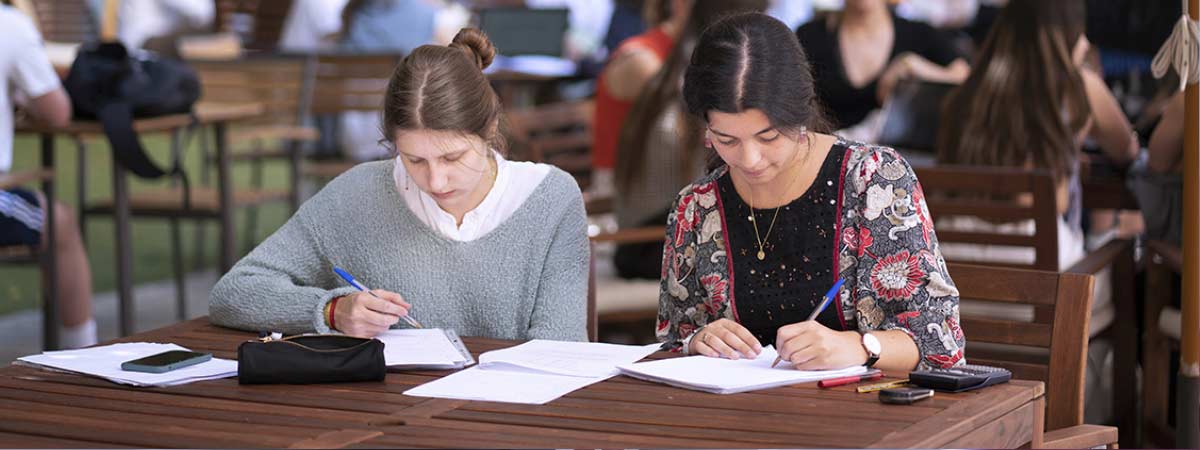
Internships in educational centers from the first academic year
Spanish is fundamental in the training of future education professionals, taking into account the direct application it will have in the first years of children's school life. The competences in Spanish are the cornerstone of Nebrija University's curriculum, without neglecting English language training, which applies to the entire program, as you can take the Bachelor's degree in bilingual modality.
The proposal of a degree with a bilingual option, such as our Bachelor's Degree in Early Childhood Education, seeks to promote the internationalization of students. In addition, this curriculum responds to the social demand of more professors able to educate in English and train future generations in language skills according to European needs and a more globalized world.
Our students, future education professionals in the first years of children's school life, can choose between the modalities of class attendance, blended and distance education. We adapt ourselves to your needs, we want you to study and become what you want to be.
Students with a higher degree in Early Childhood Education may study the Bachelor's Degree in Early Childhood Education in four academic semesters, thus obtaining the Bachelor's Degree in Early Childhood Education from Nebrija University.
This Bachelor's Degree has as its main objective to train the student to exercise the regulated profession of Teacher in Early Childhood Education, and respond to the educational needs and challenges that this period, which is key in the development of the individual, poses.
Read moreThe teaching objectives are as follows:
- Provide students with the knowledge, tools and skills that allow them to assume the responsibilities they face in the educational stage of 3 to 6 years.
- Develop in students the ability to facilitate early childhood learning, from a globalizing and integrative perspective of the different cognitive, emotional, psychomotor and volitional dimensions.
- Help students to know the educational implications of information and communication technologies and, in particular, early childhood television.
- Strengthen in students the ability to put into play the necessary strategies to develop curricular projects that adapt to the characteristics and needs of their students in the 3-6 years period.
- Offer students an in-depth knowledge of the objectives, curricular contents and evaluation criteria of Early Childhood Education.
- Provide students with the necessary skills to promote the development of perception, knowledge and control of their body through the stimulation of different perceptual channels.
- Provide students with fundamentals of children's dietetics and hygiene, as well as psychological, learning and personality building processes in early childhood.
- In the case of the bilingual option, provide students with a solid foundation of fundamental knowledge that allows them to acquire a C1 level in English in order to use it as a vehicle for specific knowledge.
The School of Languages and Education teaches all its degrees in the renovated facilities of the Madrid-Princesa Campus, a few steps from Puerta del Sol and close to museums, galleries, institutions and transport.
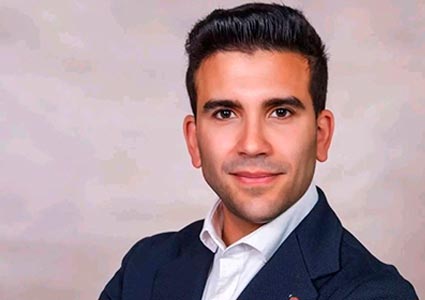
Alfonso González Garrido, Nominated for the EDUCA ABANCA Best Teacher in Spain 2024 Award
At Nebrija University, we pride ourselves on having the best. Our very own professor, Alfonso González Garrido, has been nominated for the Best Teacher in Spain 2024 at the EDUCA ABANCA Awards. Congratulations, Alfonso!
Pedagogical model based on the application of neuroscience in the teaching and learning process
Curriculum
All our degrees and curricula have been prepared in accordance with the new guidelines set by current legislation, having already been verified by the National Agency for Quality Assessment.
The student must complete 240 credits
First year 60 ECTS
First Semester 30 ECTS- 6 ECTS | Strategies for oral and written communication in English I

- 6 ECTS | Classroom behavior modification
- 6 ECTS | The curriculum in Early Childhood Education
- 6 ECTS | Spanish Language and Communication I
- 6 ECTS | Society, family and school
Second Semester 24 ECTS- 6 ECTS | Educational Development Psychology
- 6 ECTS | Classroom and school management
- 6 ECTS | Educational theories and systems
- 6 ECTS | Attention to linguistic and cultural diversity

Yearly 6 ECTS- 6 ECTS | Practicum I
Second year 60 ECTS
First Semester 28 ECTS- 6 ECTS | Strategies for oral and written communication in English II

- 6 ECTS | Tutoring and guidance
- 6 ECTS | Psychology in education
- 4 ECTS | Early assessment
- 6 ECTS | Educational methodology, innovation and research
Second Semester 24 ECTS- 6 ECTS | Special educational needs in the classroom
- 6 ECTS | Health, hygiene and personal autonomy
- 6 ECTS | Basic Teaching Resources and Principles in Early Childhood Education

- 6 ECTS | ICT in Education

Yearly 8 ECTS- 8 ECTS | Practicum II
Third year 60 ECTS
First Semester 26 ECTS- 6 ECTS | Development of logical-mathematical skills
- 6 ECTS | Psychomotor development
- 4 ECTS | Uses and functions of the English language I

- 4 ECTS | Body expression and its didactics

- 6 ECTS | Observation and analysis of contexts in Early Childhood Education

Second Semester 22 ECTS- 4 ECTS | Learning social and natural sciences

- 6 ECTS | Didactics of music education

- 6 ECTS | Didactics of plastic and creative expression

- 6 ECTS |
Choose an elective among the following:
- Enseignement des langues secondes
- Children's games and songs
- Behavior Disorders and Learning
- Competence Seminar I
- Second language learning

- Learning difficulties and neurodevelopmental disorders
- Basic physical education
- Communication and Language
Yearly 12 ECTS- 12 ECTS | Practicum III
Fourth year 60 ECTS
First Semester 24 ECTS- 6 ECTS | Literature for children and initiation to literacy
- 6 ECTS | Uses and functions of the English language II

- 12 ECTS | Choose two electives from the following:
- Méthodologies et ressources didactiques pour l'enseignement du français
- Rythme, jeux et chansons
- Contemporary Spain
- Competence Seminar II
- English methodologies and didactic resources

- Rhythm, play and games
- Children with hearing impairment
- Visual impairment
- Learning and motor control
- Physical education and health in school contexts
- Alterations of voice and articulation
- Alterations of written language
Second Semester 24 ECTS- 12 ECTS |
Choose two electives from the following:
- Littérature et culture dans les pays francophones
- Phonétique française: lire et écrire
- Introduction to religion and Christianity
- Competence seminar III
- Literature & culture of English-speaking countries

- English Phonics: Reading and writing

- Motor deficiency
- Education of children with high capacities
- Design, development and evaluation of physical education
- Motor games and physical education
- Hearing difficulties
- Augmentative and alternative communication systems
- 12 ECTS | Final Research Project
Yearly 12 ECTS- 12 ECTS | Practicum IV
More info about the subjects
In accordance with article 12.6 of R.D. 1393/2007 of October 29, students will be able to obtain up to a maximum of 6 credits in academic recognition for participating in cultural, sports, student representation, solidarity and cooperation university activities.
Concentration in Foreign Language (English)
- 6 ECTS | Second language learning
 (3rd year, 2nd Semester)
(3rd year, 2nd Semester) - 6 ECTS | English methodologies and didactic resources
 (4th year, 1st Semester)
(4th year, 1st Semester) - 6 ECTS | Rhythm, play and games
 (4th year, 1st Semester)
(4th year, 1st Semester) - 6 ECTS | Literature & culture of English speaking countries
 (4th year, 2nd Semester)
(4th year, 2nd Semester) - 6 ECTS | English Phonics: Reading and writing
 (4th year, 2nd Semester)
(4th year, 2nd Semester)
Concentration in Therapeutic Pedagogy
- 6 ECTS | Learning difficulties and neurodevelopmental disorders (3rd year, 2nd Semester)
- 6 ECTS | Children with hearing impairment (4th year, 1st Semester)
- 6 ECTS | Visual impairment (4th year, 1st Semester)
- 6 ECTS | Motor deficiency (4th year, 2nd Semester)
- 6 ECTS | Education of children with high capacities (6 ECTS) (4th year, 2nd Semester)
Concentration in Foreign Language (French)
- 6 ECTS | Littérature et culture dans les pays francophones (4th year, 2nd Semester)
- 6 ECTS | Enseignement des langues secondes (3th year, 2nd Semester)
- 6 ECTS | Méthodologies et ressources didactiques pour l'enseignement du français (4th year, 1nd Semester)
- 6 ECTS | Rythme, jeux et chansons (4th year, 1nd Semester)
- 6 ECTS | Phonétique française: lire et écrire (4th year, 2nd Semester)
Concentration in Physical Education
- 6 ECTS | 6 ECTS | Basic physical education (3rd year, 2nd Semester)
- 6 ECTS | Learning and motor control (4th year, 1st Semester)
- 6 ECTS | Physical education and health in school contexts (4th year, 1st Semester)
- 6 ECTS | Design, development and evaluation of physical education (4th year, 2nd Semester)
- 6 ECTS | Motor games and physical education (6 ECTS) (4th year, 2nd Semester)
Concentration in Hearing and Language
- 6 ECTS | Communication and language (3rd year, 2nd Semester)
- 6 ECTS | Alterations of voice and articulation (4th year, 1st Semester)
- 6 ECTS | Alterations of written language (4th year, 1st Semester)
- 6 ECTS | Hearing difficulties (4th year, 2nd Semester)
- 6 ECTS | Augmentative and alternative communication systems (4th year, 2nd Semester)
- 6 ECTS | CD Seminar: Communication and Emotional Intelligence
- 6 ECTS |CD Seminar: Teamwork and Project Management
- 6 ECTS |CD Seminar: Leadership and Negotiation
School internships whose objective is to promote the practical training of students, under the continuous supervision of a University tutor, the academic department of Education and a tutor of the corresponding educational center.
The Professional Internships allow our students to experience their activity as a future professional of education in educational environments, thus combining it with the theoretical knowledge obtained in the various subjects. For this, external internships are carried out every year.
The evaluation process for each practicum employs a weighted approach to ensure a thorough assessment of acquired skills and knowledge:
The center tutor report carries the primary weight, making up 75% of the total score. This report extensively evaluates the student's performance during their professional internships. Additionally, the Final Practicum Report contributes 25%, allowing students to present a comprehensive summary of their experience and engage in reflective analysis.
- 6 ECTS | Practicum I
- 6 ECTS | Practicum II
- 6 ECTS | Practicum III
- 6 ECTS | Practicum IV
Links of interest:
- Professional Nebrija: More information on Internships in Companies
- Order 2708/2023, of the Community of Madrid
- Legislation: R.D-ley 2/2023
- Employment forum
- XXII Nebrija Employment Forum: Professional Meetings of the Education Sector
- Professional Nebrija: Training, support and incorporation program into the company “PROFESSIONAL NEBRIJA”
- Evaluation of Training Internships
- Legislation: R.D. 592/2014
- Examples of centers where students can perform their internships
Internal procedure for management of external internships
The University assigns internship places at the Educational Centers according to the regulations valid in each Autonomous Community.
The procedure for assigning internships is carried out in the following phases:
- a) Request for a Center: the student fills in the request form for Preferred Centers in which to carry out the internship, taking into account the regulations of each Autonomous Community.
- b) Documentation collection phase: the Professional Careers Department reviews the applications and confirms whether they meet the requirements established by each Community.
- c) Center assignment phase: the Professional Careers Department establishes the communication process with the Centers to assign places to students. In this sense, the deadlines set by each Ministry and the availability of the Centers and students are taken into account.
- d) Submit documentation: The student submits the required documents to the Professional Careers Department and once they are reviewed and approved, the student is authorized to start the internship on the dates established according to the availability of the Educational Center.
- e) Sending the documentation to the Center: the Department of Academic Coordination of the University Practicum sends the orientation guide of the Practicum and certificates to evaluate the student's performance during the Practicum to the professional tutor.
This project involves the development of research tasks regarding different subjects by the student under the advice of one or several professors of the Department and, occasionally, professionals from the business world. For this, the student has the possibility to choose a project from among those offered.
Nebrija University, which is committed to languages and quality, provides the student with added value with the Diploma in English Professional Communication, which will allow him/her to achieve with confidence the competence demanded to successfully join the labor market.
It corresponds to level C1.
More information hereAccess to the Bachelor's Degree in Early Childhood Education
Program for: Professional graduates of Primary Education who want to obtain the Bachelor's Degree in Early Childhood Education.
Modality: Class attendance, blended and online.
Schedule adapted to professionals.
English level required: A2 (monolingual mode) or B2 (bilingual mode)
Official degree: Bachelor’s Degree in Early Childhood Education.
Access from vocational training
Vocational Training comprises a very reliable basis in the education of the child educator. In this sense, people who have completed Vocational Training in the Advanced Degree in Early Childhood Education can take the Bachelor's Degree in Early Childhood Education in four academic semesters and thus obtain the Bachelor's Degree in Early Childhood Education from the Antonio de Nebrija University.
Grado en Educación Infantil para Técnicos Superiores en Educación Infantil
Official degree: Bachelor's Degree in Early Childhood Education.
English level required: A2 (monolingual mode) or B2 (bilingual mode)
Spanish level for non-Spanish speakers: B2 (CEFR) in Spanish.
Professors
| Profesores Professors | Porcentaje de Doctores Percentage of PhD holders |
| 132 | 67% |
Profesores
Professors
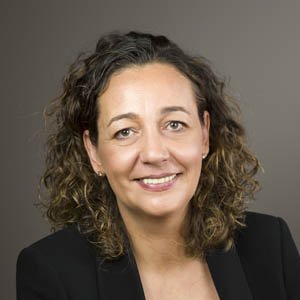 Nuria Camuñas Sánchez- Paulete
Vicedecana de la Facultad de Lenguas y Educación
Vice Dean of the Faculty of Languages and Education
Doctora en Psicología por la UCM. Máster en Intervención en la Ansiedad y el Estrés (UCM). Licenciada con grado en Psicología (UCM). Vicedecana y directora del Departamento de Educación, Facultad de Lenguas y Educación. Profesora de grado y postgrado en esa misma facultad. Docente de distintos cursos de formación y máster, sobre ansiedad, emociones y educación, estrés, modificación de conducta y dificultades del aprendizaje. Autora de distintas publicaciones y presentaciones en congresos relacionadas con procesos cognitivos, emoción y educación, prevención y control del estrés, etc. Miembro del grupo de investigación CEDI (Cognición, Educación y Diferencias Individuales). Otras líneas de investigación: Cognición, Emoción, Salud y Educación.
ncamunas@nebrija.es
Nuria Camuñas Sánchez- Paulete
Vicedecana de la Facultad de Lenguas y Educación
Vice Dean of the Faculty of Languages and Education
Doctora en Psicología por la UCM. Máster en Intervención en la Ansiedad y el Estrés (UCM). Licenciada con grado en Psicología (UCM). Vicedecana y directora del Departamento de Educación, Facultad de Lenguas y Educación. Profesora de grado y postgrado en esa misma facultad. Docente de distintos cursos de formación y máster, sobre ansiedad, emociones y educación, estrés, modificación de conducta y dificultades del aprendizaje. Autora de distintas publicaciones y presentaciones en congresos relacionadas con procesos cognitivos, emoción y educación, prevención y control del estrés, etc. Miembro del grupo de investigación CEDI (Cognición, Educación y Diferencias Individuales). Otras líneas de investigación: Cognición, Emoción, Salud y Educación.
ncamunas@nebrija.es
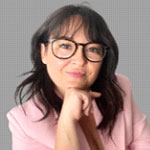 María del Pilar Salvá Soria
Coordinadora de alumnos (Modalidad presencial)
Student coordinator (Clashroom attendance modality)
Doctora en Filosofía con Mención Internacional por la Universidad Complutense de Doctora en Filosofía con Mención Internacional por la Universidad Complutense de Madrid (UCM). Posee un Máster Universitario en Epistemología de las Ciencias Naturales y Sociales (UCM) y un Máster en Formación del Profesorado de Educación Secundaria y Bachillerato (Pontificia Comillas). Actualmente, es Profesora Ayudante Doctora, Profesora de Universidad Privada y está acreditada como Profesora Contratada Doctora por ANECA. Sus líneas de investigación se centran en la epistemología, la metodología de la investigación científica y el pragmatismo americano. Ha publicado en revistas y editoriales de prestigio internacional. Ha participado en tres proyectos de innovación educativa financiados por la UCM y es miembro del grupo de investigación financiado por el Ministerio, Cognitive Vulnerability, Verisimilitude and Truth (FFI2017-84826-P). Ha sido cofundadora y presidenta de la Asociación de Epistemología de la UCM y miembro de la Sociedad Richard Rorty. Además, coordinó el Máster Propio en Ciencia y Filosofía: Construyendo el Futuro (UCM) y colabora con distintas universidades impartiendo clases y seminarios. Actualmente, es docente y coordinadora de los Grados en Educación de la Universidad Nebrija.
msalva@nebrija.es
María del Pilar Salvá Soria
Coordinadora de alumnos (Modalidad presencial)
Student coordinator (Clashroom attendance modality)
Doctora en Filosofía con Mención Internacional por la Universidad Complutense de Doctora en Filosofía con Mención Internacional por la Universidad Complutense de Madrid (UCM). Posee un Máster Universitario en Epistemología de las Ciencias Naturales y Sociales (UCM) y un Máster en Formación del Profesorado de Educación Secundaria y Bachillerato (Pontificia Comillas). Actualmente, es Profesora Ayudante Doctora, Profesora de Universidad Privada y está acreditada como Profesora Contratada Doctora por ANECA. Sus líneas de investigación se centran en la epistemología, la metodología de la investigación científica y el pragmatismo americano. Ha publicado en revistas y editoriales de prestigio internacional. Ha participado en tres proyectos de innovación educativa financiados por la UCM y es miembro del grupo de investigación financiado por el Ministerio, Cognitive Vulnerability, Verisimilitude and Truth (FFI2017-84826-P). Ha sido cofundadora y presidenta de la Asociación de Epistemología de la UCM y miembro de la Sociedad Richard Rorty. Además, coordinó el Máster Propio en Ciencia y Filosofía: Construyendo el Futuro (UCM) y colabora con distintas universidades impartiendo clases y seminarios. Actualmente, es docente y coordinadora de los Grados en Educación de la Universidad Nebrija.
msalva@nebrija.es
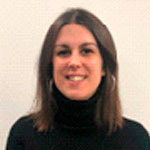 Renata Valle Lapeña
Coordinadora académica (modalidad virtual)
Academic coordinator (online format)
Licenciada en Pedagogía y Diplomada en Educación Social por la UCM, Graduada en Educación Primaria por la UCJC, así como en posesión de Máster Universitario en Dirección y Gestión para la Calidad de Centros Educativos por la UFV y Máster Experto en Enseñanza del Español como Lengua Extranjera por la UNED. Su trayectoria profesional en la última década se ha orientado a la formación de futuros maestros en diversas Universidades españolas, así como a la gestión y coordinación académica de los Grados en Educación en la Universidad Antonio de Nebrija.
rvalle@nebrija.es
Renata Valle Lapeña
Coordinadora académica (modalidad virtual)
Academic coordinator (online format)
Licenciada en Pedagogía y Diplomada en Educación Social por la UCM, Graduada en Educación Primaria por la UCJC, así como en posesión de Máster Universitario en Dirección y Gestión para la Calidad de Centros Educativos por la UFV y Máster Experto en Enseñanza del Español como Lengua Extranjera por la UNED. Su trayectoria profesional en la última década se ha orientado a la formación de futuros maestros en diversas Universidades españolas, así como a la gestión y coordinación académica de los Grados en Educación en la Universidad Antonio de Nebrija.
rvalle@nebrija.es
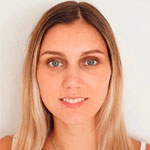 Andreina Sordo Castro
Coordinadora académica del Grado en Educación Primaria (Modalidad A distancia)
Academic coordinator for the Bachelor's Degree in Primary Education (online mode)
Graduada en Pedagogía por la Universidad de Oviedo. Técnico Superior en Integración Social. Inició su trayectoria profesional en centros de atención a menores en riesgo de exclusión social ofreciendo apoyo en tareas escolares y orientación pedagógica. También participó durante varios años como coordinadora y monitora de campamento. Posteriormente, fue enfocando su profesión a la vertiente empresarial de la pedagogía ejerciendo funciones de organización y gestión de formación para profesionales del sector educativo, hasta adentrarse en la labor docente en el ámbito universitario principalmente como docente en la asignatura Competencias Profesionales III y de TFG de alumnos en los Grados en Educación de la Universidad Camilo José Cela y de la Universidad Antonio de Nebrija.
Andreina Sordo Castro
Coordinadora académica del Grado en Educación Primaria (Modalidad A distancia)
Academic coordinator for the Bachelor's Degree in Primary Education (online mode)
Graduada en Pedagogía por la Universidad de Oviedo. Técnico Superior en Integración Social. Inició su trayectoria profesional en centros de atención a menores en riesgo de exclusión social ofreciendo apoyo en tareas escolares y orientación pedagógica. También participó durante varios años como coordinadora y monitora de campamento. Posteriormente, fue enfocando su profesión a la vertiente empresarial de la pedagogía ejerciendo funciones de organización y gestión de formación para profesionales del sector educativo, hasta adentrarse en la labor docente en el ámbito universitario principalmente como docente en la asignatura Competencias Profesionales III y de TFG de alumnos en los Grados en Educación de la Universidad Camilo José Cela y de la Universidad Antonio de Nebrija.
asordo@nebrija.es
 Andrea Cereto Urdiales
Coordinadora de Prácticas
Internship Coordinator
Licenciada en Historia por la Universidad de Málaga y Máster en Formación del Profesorado (especialidad en Geografía e Historia) por la Universidad Autónoma de Madrid. Cuenta con experiencia docente en Educación Secundaria Obligatoria, impartiendo clases de Ciencias Sociales y talleres sobre el uso de nuevas tecnologías aplicadas a la Historia. Ha participado en el Programa Refuerza de la Comunidad de Madrid, impartiendo clases de refuerzo para el primer ciclo de la ESO en el IES Adolfo Suárez. Actualmente, es docente y coordinadora de prácticas de los Grados en Educación de la Universidad Nebrija.
acereto@nebrija.es
Andrea Cereto Urdiales
Coordinadora de Prácticas
Internship Coordinator
Licenciada en Historia por la Universidad de Málaga y Máster en Formación del Profesorado (especialidad en Geografía e Historia) por la Universidad Autónoma de Madrid. Cuenta con experiencia docente en Educación Secundaria Obligatoria, impartiendo clases de Ciencias Sociales y talleres sobre el uso de nuevas tecnologías aplicadas a la Historia. Ha participado en el Programa Refuerza de la Comunidad de Madrid, impartiendo clases de refuerzo para el primer ciclo de la ESO en el IES Adolfo Suárez. Actualmente, es docente y coordinadora de prácticas de los Grados en Educación de la Universidad Nebrija.
acereto@nebrija.es
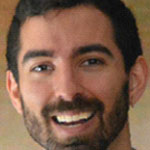 Javier Agüera Hernández
Profesor y Director TFG
Professor
Graduado en Psicología por la Universidad de Murcia. Habilitado como mediador por esta misma universidad. Con máster en Psicología General Sanitaria. Ejerce como psicólogo general sanitario en población general. Además de divulgar a través del canal Neuroentropía. Canal dedicado a la difusión de contenido científico relativo a la salud mental.
Javier Agüera Hernández
Profesor y Director TFG
Professor
Graduado en Psicología por la Universidad de Murcia. Habilitado como mediador por esta misma universidad. Con máster en Psicología General Sanitaria. Ejerce como psicólogo general sanitario en población general. Además de divulgar a través del canal Neuroentropía. Canal dedicado a la difusión de contenido científico relativo a la salud mental.
jaguera@nebrija.es
 Zeina Alhmoud
Profesora y directora TFG
Professor and TFG Director
Doctora en Lingüística Aplicada a la enseñanza de lenguas por la Universidad de Granada (2016). Licenciada en Lenguas Modernas (español e inglés) por la Universidad de Jordania (2006). Tiene más de cuatro años de experiencia como profesora de inglés como lengua extranjera. Ha hecho varios trabajos de ilustración y elaboración de presentaciones didácticas, entre ellos el proyecto de investigación, financiado por el Ministerio de Educación y Ciencia de España, “Gramática avanzada de español lengua” extranjera (FFI2009-13107). Universidad de Granada (Investigador Principal Alejandro Castañeda Castro). Actualmente es profesora del Departamento de Lenguas aplicadas de la Universidad Nebrija. Imparte clases en el Grado de Lenguas Modernas, el Máster en Didáctica de ELE y el Máster en Lingüística Aplicada. Es miembro del grupo de investigación LAELE de la Universidad Nebrija y participa en el proyecto de investigación del Plan Regional (IN.MIGRA2-CM). Su área de investigación se centra en la lingüística cognitiva y su aplicación a la enseñanza de segundas lenguas, y el uso de las imágenes y animaciones en el aula de L2. Tiene especial interés en el diseño de ilustraciones y materiales didácticos.
Zeina Alhmoud
Profesora y directora TFG
Professor and TFG Director
Doctora en Lingüística Aplicada a la enseñanza de lenguas por la Universidad de Granada (2016). Licenciada en Lenguas Modernas (español e inglés) por la Universidad de Jordania (2006). Tiene más de cuatro años de experiencia como profesora de inglés como lengua extranjera. Ha hecho varios trabajos de ilustración y elaboración de presentaciones didácticas, entre ellos el proyecto de investigación, financiado por el Ministerio de Educación y Ciencia de España, “Gramática avanzada de español lengua” extranjera (FFI2009-13107). Universidad de Granada (Investigador Principal Alejandro Castañeda Castro). Actualmente es profesora del Departamento de Lenguas aplicadas de la Universidad Nebrija. Imparte clases en el Grado de Lenguas Modernas, el Máster en Didáctica de ELE y el Máster en Lingüística Aplicada. Es miembro del grupo de investigación LAELE de la Universidad Nebrija y participa en el proyecto de investigación del Plan Regional (IN.MIGRA2-CM). Su área de investigación se centra en la lingüística cognitiva y su aplicación a la enseñanza de segundas lenguas, y el uso de las imágenes y animaciones en el aula de L2. Tiene especial interés en el diseño de ilustraciones y materiales didácticos.
zdalhmoud@nebrija.es
 Rosa Amor del Olmo
Profesora y Directora TFG
Professor and Director TFG
Doctora acreditada en Filosofía y Letras (Filología Hispánica) por la UAM, además de completar sus estudios con un segundo Doctorado en Teología y Ética (UNED) y un Máster en Formación del profesorado (Nebrija). Profesora de Lengua, Literatura y filosofía en diversas universidades, es considerada en la profesión académica como una de las cinco mejores hispanistas del mundo especializada en la obra galdosiana, tal y como lo demuestran sus trabajos de investigación en manuscritos decimonónicos y su programa de traducción de la obra de Benito Pérez Galdós a diferentes lenguas y con distintos traductores bajo un mismo proyecto apoyado por el Ministerio de Cultura Español. Es autora de numerosas publicaciones de crítica literaria, ensayo y ediciones especializadas en Literatura del siglo XIX y XX.
Rosa Amor del Olmo
Profesora y Directora TFG
Professor and Director TFG
Doctora acreditada en Filosofía y Letras (Filología Hispánica) por la UAM, además de completar sus estudios con un segundo Doctorado en Teología y Ética (UNED) y un Máster en Formación del profesorado (Nebrija). Profesora de Lengua, Literatura y filosofía en diversas universidades, es considerada en la profesión académica como una de las cinco mejores hispanistas del mundo especializada en la obra galdosiana, tal y como lo demuestran sus trabajos de investigación en manuscritos decimonónicos y su programa de traducción de la obra de Benito Pérez Galdós a diferentes lenguas y con distintos traductores bajo un mismo proyecto apoyado por el Ministerio de Cultura Español. Es autora de numerosas publicaciones de crítica literaria, ensayo y ediciones especializadas en Literatura del siglo XIX y XX.
ramorol@nebrija.es
 Sonia Andrés García
Profesora y Directora TFG
Professor
Licenciada en Psicología. Compagina la docencia universitaria con la elaboración y actualización de materiales precisos para alumnos opositores a Maestros de Pedagogía Terapéutica y Maestros especialistas en Audición y Lenguaje. Posee experiencia en formación de adultos relacionada con Recursos Humanos en sector bancario, impartiendo cursos de bienvenida, política de empresa y clima laboral.
sandres@nebrija.es
Sonia Andrés García
Profesora y Directora TFG
Professor
Licenciada en Psicología. Compagina la docencia universitaria con la elaboración y actualización de materiales precisos para alumnos opositores a Maestros de Pedagogía Terapéutica y Maestros especialistas en Audición y Lenguaje. Posee experiencia en formación de adultos relacionada con Recursos Humanos en sector bancario, impartiendo cursos de bienvenida, política de empresa y clima laboral.
sandres@nebrija.es
 Alba Aranda Larrey
Profesora y Directora TFG
Professor
Graduada profesionalmente en Música Moderna por la Escuela de Música Creativa de Madrid con la especialidad de Flauta Travesera y formada en Música Clásica en el Conservatorio profesional de Música de Cuenca. Postgrado en Estudios africanos por la Universidad Autónoma de Madrid y Licenciada en Ciencias políticas por la Universidad Complutense de Madrid.
Ha trabajado como docente en Escuelas de Música Municipales de la Comunidad de Madrid, en Colegios y academias privadas(EMC). Ha participado como música y docente en Festivales Internacionales de Música, así como en residencias artísticas y proyectos internacionales. Además, ha participado como flautista en la grabación de varios álbumes como Flamenco Americana de Kati Golenko.
Actualmente trabaja en la Escuela de Música Creativa de Madrid, dirige un coro de Mujeres en el espacio de igualdad del ayuntamiento de Madrid Hermanas Mirabal. Es docente para la Mención de Música del grado de educación de la Universidad del Atlántico Medio, donde también dirige TFG. Es docente de Educación musical y su didáctica y directora de TFG en la Universidad Nebrija.
aaranda@nebrija.es
Alba Aranda Larrey
Profesora y Directora TFG
Professor
Graduada profesionalmente en Música Moderna por la Escuela de Música Creativa de Madrid con la especialidad de Flauta Travesera y formada en Música Clásica en el Conservatorio profesional de Música de Cuenca. Postgrado en Estudios africanos por la Universidad Autónoma de Madrid y Licenciada en Ciencias políticas por la Universidad Complutense de Madrid.
Ha trabajado como docente en Escuelas de Música Municipales de la Comunidad de Madrid, en Colegios y academias privadas(EMC). Ha participado como música y docente en Festivales Internacionales de Música, así como en residencias artísticas y proyectos internacionales. Además, ha participado como flautista en la grabación de varios álbumes como Flamenco Americana de Kati Golenko.
Actualmente trabaja en la Escuela de Música Creativa de Madrid, dirige un coro de Mujeres en el espacio de igualdad del ayuntamiento de Madrid Hermanas Mirabal. Es docente para la Mención de Música del grado de educación de la Universidad del Atlántico Medio, donde también dirige TFG. Es docente de Educación musical y su didáctica y directora de TFG en la Universidad Nebrija.
aaranda@nebrija.es
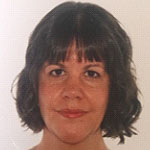 Nadia M. Arias González
Profesora y Directora de TFG
Professor
Licenciada en Filología Inglesa y Filología Hispánica (USAL). Máster en Enseñanza del español como lengua extranjera (USAL). Profesora de grado en la Universidad de Salamanca y en la Universidad Antonio de Nebrija.
nariasg@nebrija.es
Nadia M. Arias González
Profesora y Directora de TFG
Professor
Licenciada en Filología Inglesa y Filología Hispánica (USAL). Máster en Enseñanza del español como lengua extranjera (USAL). Profesora de grado en la Universidad de Salamanca y en la Universidad Antonio de Nebrija.
nariasg@nebrija.es
 Tania Ariza Castilla
Profesora y Directora TFG
Professor
Doctora acreditada. Licenciada en Pedagogía, Máster en Diseños de Investigación y Aplicaciones en Psicología y Salud, y Doctora en Psicología por la Universidad de Granada. Además, tiene el título de Experto Universitario en Aprendizaje y Enseñanza Universitaria Online. Ha impartido docencia en el departamento de Psicología evolutiva y de la educación y en el de Metodología de las Ciencias del Comportamiento de la Universidad de Granada, así como en el departamento de Psicología de la educación y psicobiología de la Universidad Internacional de La Rioja. También, pertenece al grupo de investigación “Procesamiento de la información y toma de decisiones” de la Universidad de Granada. Sus publicaciones científicas se centran en el estudio bibliométrico de revistas relacionadas con la educación, la evaluación de la educación superior y el síndrome de burnout en colectivos en riesgo de padecerlo. Ha sido miembro del comité científico y organizador de congresos internacionales sobre Educación Superior y es revisora de artículos de revistas de psicología y educación.
tariza@nebrija.es
Tania Ariza Castilla
Profesora y Directora TFG
Professor
Doctora acreditada. Licenciada en Pedagogía, Máster en Diseños de Investigación y Aplicaciones en Psicología y Salud, y Doctora en Psicología por la Universidad de Granada. Además, tiene el título de Experto Universitario en Aprendizaje y Enseñanza Universitaria Online. Ha impartido docencia en el departamento de Psicología evolutiva y de la educación y en el de Metodología de las Ciencias del Comportamiento de la Universidad de Granada, así como en el departamento de Psicología de la educación y psicobiología de la Universidad Internacional de La Rioja. También, pertenece al grupo de investigación “Procesamiento de la información y toma de decisiones” de la Universidad de Granada. Sus publicaciones científicas se centran en el estudio bibliométrico de revistas relacionadas con la educación, la evaluación de la educación superior y el síndrome de burnout en colectivos en riesgo de padecerlo. Ha sido miembro del comité científico y organizador de congresos internacionales sobre Educación Superior y es revisora de artículos de revistas de psicología y educación.
tariza@nebrija.es
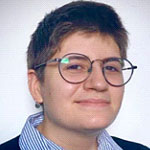 Elena Bermejo Solera
Profesora y Directora de TFG
Professor
Graduada en Estudios Ingleses y máster en Literatura y Cultura de los Países de Habla Inglesa por la Universidad Autónoma de Madrid. Actualmente es doctoranda en el programa de Estudios Artísticos, Literarios y de la Cultura en la UAM y cursa los estudios del máster en Formación del Profesorado en la VIU. Cuenta con experiencia como docente de EFL para niños, jóvenes y adultos en diversos centros educativos y universidades. Es miembro del grupo de investigación Limen Group (UAM). Desde 2018 coorganiza el seminario mensual Madrid Fantasy Seminar en la UAM, dedicado a la investigación de la literatura fantástica a nivel de grado y posgrado. Sus áreas de investigación conciernen a la literatura popular, el género fantástico y los estudios liminares.
ebermejos@nebrija.es
Elena Bermejo Solera
Profesora y Directora de TFG
Professor
Graduada en Estudios Ingleses y máster en Literatura y Cultura de los Países de Habla Inglesa por la Universidad Autónoma de Madrid. Actualmente es doctoranda en el programa de Estudios Artísticos, Literarios y de la Cultura en la UAM y cursa los estudios del máster en Formación del Profesorado en la VIU. Cuenta con experiencia como docente de EFL para niños, jóvenes y adultos en diversos centros educativos y universidades. Es miembro del grupo de investigación Limen Group (UAM). Desde 2018 coorganiza el seminario mensual Madrid Fantasy Seminar en la UAM, dedicado a la investigación de la literatura fantástica a nivel de grado y posgrado. Sus áreas de investigación conciernen a la literatura popular, el género fantástico y los estudios liminares.
ebermejos@nebrija.es
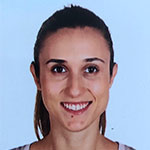 Elisabetta Bertola López
Profesora y Directora TFG
Professor
Doctor en psicología por la Universidad de Murcia. Posgrado de Especialización en TMO, Máster en Intervención y Diplomada en Logopedia. Ha trabajado como logopeda en diversos centros y colegios.
ebertola@nebrija.es
Elisabetta Bertola López
Profesora y Directora TFG
Professor
Doctor en psicología por la Universidad de Murcia. Posgrado de Especialización en TMO, Máster en Intervención y Diplomada en Logopedia. Ha trabajado como logopeda en diversos centros y colegios.
ebertola@nebrija.es
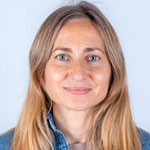 Carmen Boquete Pumar
Profesora y Directora TFG
Professor
Licenciada en Ciencias de la Actividad Física y del Deporte por la Universidad de Gales (University of Wales-Prifysgol Cymru). Máster para la Formación del Profesorado por la Universidad Internacional de Valencia. Doctora en Ciencias de la Salud en la Universidad de Jaén. Proviene del ámbito educativo e investigador en Ciencias de la Salud y de la Actividad Física, ha sido docente de educación formal en Secundaria, Formación Profesional y en el Grado de Ciencias del Deporte. Entre sus líneas de investigación se encuentra la función cognitiva, el entrenamiento y la condición física. Es coordinadora académica, de educación no formal, en Five Stars Fitness y docente en los Grados de Educación Infantil y Primaria en la Universidad Nebrija.
cboquete@nebrija.es
Carmen Boquete Pumar
Profesora y Directora TFG
Professor
Licenciada en Ciencias de la Actividad Física y del Deporte por la Universidad de Gales (University of Wales-Prifysgol Cymru). Máster para la Formación del Profesorado por la Universidad Internacional de Valencia. Doctora en Ciencias de la Salud en la Universidad de Jaén. Proviene del ámbito educativo e investigador en Ciencias de la Salud y de la Actividad Física, ha sido docente de educación formal en Secundaria, Formación Profesional y en el Grado de Ciencias del Deporte. Entre sus líneas de investigación se encuentra la función cognitiva, el entrenamiento y la condición física. Es coordinadora académica, de educación no formal, en Five Stars Fitness y docente en los Grados de Educación Infantil y Primaria en la Universidad Nebrija.
cboquete@nebrija.es
 Patricia Jara Calaforra Faubel
Profesora y Directora TFG
Professor and TFG Director
Doctora en Psicología por la Universidad Complutense de Madrid.
Pedagoga, Maestra de Educación Primaria y maestra de Audición y Lenguaje en colegios y gabinetes psicopedagógicos.
Patricia Jara Calaforra Faubel
Profesora y Directora TFG
Professor and TFG Director
Doctora en Psicología por la Universidad Complutense de Madrid.
Pedagoga, Maestra de Educación Primaria y maestra de Audición y Lenguaje en colegios y gabinetes psicopedagógicos. Ha trabajado como profesora en los grados de Educación infantil y Primaria, en las menciones de audición y Lenguaje y Pedagogía Terapéutica en la Universidad Internacional de la Rioja, así como profesora de Psicología Básica en la Universidad Complutense de Madrid. Miembro del equipo del Proyecto: Utilización de códigos QR para la evaluación continua en alumnos de Psicología Básica (prácticas), aprobado en la convocatoria de “Proyectos de Innovación y Mejora de la Calidad Docente” del año 2014.
Diversas publicaciones sobre estrategias metacognitivas en escritura y códigos QR. Ponente en el Congreso Internacional en Contextos Psicológicos, Educativos y de la Salud. pcalaforra@nebrija.es
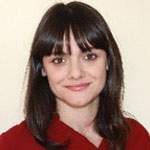 Carolina Callejo Lavado
Directora TFG
TFG Director
Doctoranda en el programa de Comunicación, Información y Tecnología de la Sociedad en Red de la Universidad de Alcalá (UAH), actualmente elabora su tesis bajo el título El efecto de los recortes en la inversión en I+D en la producción científica y en sus indicadores de rendimiento: una aproximación cienciométrica al caso español en el contexto internacional. Obtuvo los títulos de Grado en Periodismo y Grado en Comunicación Audiovisual por la Universidad Rey Juan Carlos (URJC) y el de Máster Universitario en Información y Comunicación Científica por la Universidad de Granada (UGR). Es autora de una presentación en un congreso internacional y ha trabajado como responsable de comunicación, jefa de proyecto, editora, redactora y gestora de redes sociales en diversas empresas de los sectores de comunicación y marketing. En la actualidad, es docente en los grados de Educación Infantil y Educación Primaria en la Universidad Nebrija.
ccallejo@nebrija.es
Carolina Callejo Lavado
Directora TFG
TFG Director
Doctoranda en el programa de Comunicación, Información y Tecnología de la Sociedad en Red de la Universidad de Alcalá (UAH), actualmente elabora su tesis bajo el título El efecto de los recortes en la inversión en I+D en la producción científica y en sus indicadores de rendimiento: una aproximación cienciométrica al caso español en el contexto internacional. Obtuvo los títulos de Grado en Periodismo y Grado en Comunicación Audiovisual por la Universidad Rey Juan Carlos (URJC) y el de Máster Universitario en Información y Comunicación Científica por la Universidad de Granada (UGR). Es autora de una presentación en un congreso internacional y ha trabajado como responsable de comunicación, jefa de proyecto, editora, redactora y gestora de redes sociales en diversas empresas de los sectores de comunicación y marketing. En la actualidad, es docente en los grados de Educación Infantil y Educación Primaria en la Universidad Nebrija.
ccallejo@nebrija.es
 Antonio Camargo García
Director de TFG
Professor
Profesor del Máster en Formación del Profesorado de ESO y Bachillerato, FP y Enseñanza de Idiomas en la Universidad de Nebrija.
acamargo@nebrija.es
Antonio Camargo García
Director de TFG
Professor
Profesor del Máster en Formación del Profesorado de ESO y Bachillerato, FP y Enseñanza de Idiomas en la Universidad de Nebrija.
acamargo@nebrija.es
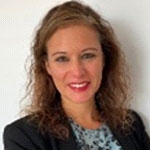 Cristina Candil San Julián
Directora de TFG
TFG Director
Máster en psicopedagogía. Máster en Neuropsicología y Educación por la Universidad Internacional de La Rioja (UNIR). Grado en Educación Primaria con Mención en Lengua Extranjera por la Universidad Camilo José Cela. Diplomatura de Magisterio en Educación Infantil por la Universidad Villanueva. Su línea de investigación en Orientación Psicopedagógica y programas de colegios con proyectos bilingües en las etapas de Infantil y Primaria. Autora de diferentes materiales didácticos universitarios. Actualmente, docente en los Grados de Educación Infantil y Primaria en la Mención de Lengua Extranjera de la Universidad Nebrija.
ccandil@nebrija.es
Cristina Candil San Julián
Directora de TFG
TFG Director
Máster en psicopedagogía. Máster en Neuropsicología y Educación por la Universidad Internacional de La Rioja (UNIR). Grado en Educación Primaria con Mención en Lengua Extranjera por la Universidad Camilo José Cela. Diplomatura de Magisterio en Educación Infantil por la Universidad Villanueva. Su línea de investigación en Orientación Psicopedagógica y programas de colegios con proyectos bilingües en las etapas de Infantil y Primaria. Autora de diferentes materiales didácticos universitarios. Actualmente, docente en los Grados de Educación Infantil y Primaria en la Mención de Lengua Extranjera de la Universidad Nebrija.
ccandil@nebrija.es
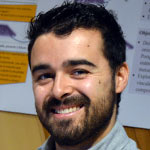 MANUEL CARABIAS HERRERO
Profesor y Director TFG
Professor and TFG Director
Doctor por la Universidad de Valladolid, Máster en Psicopedagogía, Graduado en Educación Primaria, mención lengua extranjera Inglés, Maestro de Educación Física y Maestro de Educación Infantil. Su carrera profesional ha girado en torno a la educación. Ha trabajado como maestro en diferentes colegios, en las etapas de Educación Primaria y Educación Infantil, también como profesor e investigador en universidades como la Universidad de Valladolid, la Universidad Isabel I o la Universidad Internacional de la Rioja. Ha participado en diversas investigaciones tanto nacionales como internacionales referentes a cualificaciones y competencias profesionales y transversales requeridas en los ámbitos sociales y laborales, así como su adaptación e integración en los procesos educativos. A su vez participa en Congresos Internacionales como ponente y miembro del Comité Científico y Organizador.
mcarabias@nebrija.es
MANUEL CARABIAS HERRERO
Profesor y Director TFG
Professor and TFG Director
Doctor por la Universidad de Valladolid, Máster en Psicopedagogía, Graduado en Educación Primaria, mención lengua extranjera Inglés, Maestro de Educación Física y Maestro de Educación Infantil. Su carrera profesional ha girado en torno a la educación. Ha trabajado como maestro en diferentes colegios, en las etapas de Educación Primaria y Educación Infantil, también como profesor e investigador en universidades como la Universidad de Valladolid, la Universidad Isabel I o la Universidad Internacional de la Rioja. Ha participado en diversas investigaciones tanto nacionales como internacionales referentes a cualificaciones y competencias profesionales y transversales requeridas en los ámbitos sociales y laborales, así como su adaptación e integración en los procesos educativos. A su vez participa en Congresos Internacionales como ponente y miembro del Comité Científico y Organizador.
mcarabias@nebrija.es
 Carmen Rita Castellano Hernández
Profesora y Directora TFG
Professor and TFG Director
Maestra de Educación Musical y Licenciatura en Psicopedagogía. Trabaja como maestra de Educación Musical en el CEIP Ciudad de Zaragoza (Madrid), y colabora como profesora en otras universidades, como la Universidad Camilo José Cela.
Carmen Rita Castellano Hernández
Profesora y Directora TFG
Professor and TFG Director
Maestra de Educación Musical y Licenciatura en Psicopedagogía. Trabaja como maestra de Educación Musical en el CEIP Ciudad de Zaragoza (Madrid), y colabora como profesora en otras universidades, como la Universidad Camilo José Cela.
ccastellano@nebrija.es
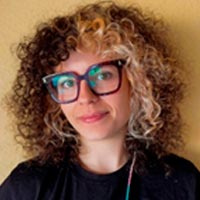 Irimia Cerviño Abeledo
Profesora y Directora de TFG
Professor
Doctora en Educación, Sociedad y Calidad de Vida por la Universidad de Lleida (UdL), con una estancia de investigación en el grupo CREDEF de la Universidad de Quebec en Montreal (UQAM). Cuenta con un Máster Euro-latinoamericano en Educación Intercultural por la Universidad Nacional de Educación a Distancia (UNED) y un Grado en Magisterio de Educación Infantil con mención en Lengua Castellana por la Universidad de Alcalá de Henares (UAH). Ha trabajado como Docente de Sociología de la Educación y como investigadora predoctoral en el programa de doctorado “Educación, Sociedad y Calidad de Vida” en el grupo GR-ASE de la Universidad de Lleida. Su labor investigadora incluye su participación en el proyecto “La diversidad cultural en la escuela: discursos, políticas y prácticas”, financiado por el Ministerio de Industria y Competitividad de España. Su línea de investigación se centra en el alumnado de origen extranjero en educación primaria, la convivencia y el clima escolar, y la convivencia intercultural en contextos escolares. Es autora de varias publicaciones científicas y capítulos de libros, además de haber presentado en congresos nacionales e internacionales sobre temas de diversidad cultural, interculturalidad y convivencia escolar. Actualmente, es miembro activo de la Red Internacional por el Derecho Educativo (RIIDE).
Irimia Cerviño Abeledo
Profesora y Directora de TFG
Professor
Doctora en Educación, Sociedad y Calidad de Vida por la Universidad de Lleida (UdL), con una estancia de investigación en el grupo CREDEF de la Universidad de Quebec en Montreal (UQAM). Cuenta con un Máster Euro-latinoamericano en Educación Intercultural por la Universidad Nacional de Educación a Distancia (UNED) y un Grado en Magisterio de Educación Infantil con mención en Lengua Castellana por la Universidad de Alcalá de Henares (UAH). Ha trabajado como Docente de Sociología de la Educación y como investigadora predoctoral en el programa de doctorado “Educación, Sociedad y Calidad de Vida” en el grupo GR-ASE de la Universidad de Lleida. Su labor investigadora incluye su participación en el proyecto “La diversidad cultural en la escuela: discursos, políticas y prácticas”, financiado por el Ministerio de Industria y Competitividad de España. Su línea de investigación se centra en el alumnado de origen extranjero en educación primaria, la convivencia y el clima escolar, y la convivencia intercultural en contextos escolares. Es autora de varias publicaciones científicas y capítulos de libros, además de haber presentado en congresos nacionales e internacionales sobre temas de diversidad cultural, interculturalidad y convivencia escolar. Actualmente, es miembro activo de la Red Internacional por el Derecho Educativo (RIIDE).
icervino@nebrija.es
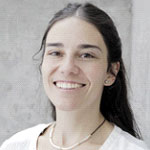 Paula Constanza Contesse Carvacho
Profesora y Directora de TFG
Professor and TFG Director
Doctora en Ciencias de la Educación por la Universidad Autónoma de Barcelona. Máster en Investigación en Educación (UAB) y Máster en Psicopedagogía en la Universidad del Desarrollo de Chile. Formación de grado de Profesora de Educación Primaria y Diferencial con especialidad en Discapacidad Intelectual, Actualmente profesora de la asignatura de Psicología de la Educación para la carrera de Educación Infantil de la Universidad de Nebrija. Autora de una publicación y presentaciones en congresos relacionados con la discapacidad intelectual en diversos temas: calidad de vida, universidad y empoderamiento. Colaboradora para la Organización de Estados Iberoamericanos para la Educación, la Ciencia y la Cultura (OEI) en la creación, como autora, del libro: Experiencias inclusivas en la educación superior chilena. Cuyo objetivo es divulgar experiencias y proyectos universitarios centrados en favorecer la inclusión en educación superior de personas con discapacidad.
Paula Constanza Contesse Carvacho
Profesora y Directora de TFG
Professor and TFG Director
Doctora en Ciencias de la Educación por la Universidad Autónoma de Barcelona. Máster en Investigación en Educación (UAB) y Máster en Psicopedagogía en la Universidad del Desarrollo de Chile. Formación de grado de Profesora de Educación Primaria y Diferencial con especialidad en Discapacidad Intelectual, Actualmente profesora de la asignatura de Psicología de la Educación para la carrera de Educación Infantil de la Universidad de Nebrija. Autora de una publicación y presentaciones en congresos relacionados con la discapacidad intelectual en diversos temas: calidad de vida, universidad y empoderamiento. Colaboradora para la Organización de Estados Iberoamericanos para la Educación, la Ciencia y la Cultura (OEI) en la creación, como autora, del libro: Experiencias inclusivas en la educación superior chilena. Cuyo objetivo es divulgar experiencias y proyectos universitarios centrados en favorecer la inclusión en educación superior de personas con discapacidad.
pcontess@nebrija.es
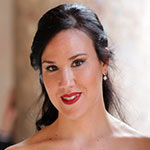 Adela Encarnación Cortijo Cantos
Profesora y Directora TFG
Professor and TFG Director
Doctora en Ciencias de la Educación, Licenciada en Psicopedagogía y Maestra especialista en Educación Física. Ha finalizado másteres y estudios de posgrados relacionados con sus dos vertientes de formación: educación física y psicopedagogía.
Adela Encarnación Cortijo Cantos
Profesora y Directora TFG
Professor and TFG Director
Doctora en Ciencias de la Educación, Licenciada en Psicopedagogía y Maestra especialista en Educación Física. Ha finalizado másteres y estudios de posgrados relacionados con sus dos vertientes de formación: educación física y psicopedagogía.Entre otras, ha disfrutado de la beca de Iniciación a la Investigación, del plan propio de la Universidad de Granada, y de la beca de Colaboración Universitaria del Ministerio. Además, cuenta con diversas publicaciones en revistas de reconocido prestigio, aportaciones a congresos nacionales e internacionales y colaboraciones en proyectos de investigación.
Docente de vocación, con experiencia en Educación Infantil, Primaria y Secundaria, y tras haber trabajado en un centro de acogida de menores más de 7 años, actualmente dirige TFG en la Universidad Isabel I e imparte asignaturas en los grados de Educación Infantil y Primaria, y en Másteres de la Universidad de Nebrija donde también tutoriza TFG y TFM.
acortijo@nebrija.es
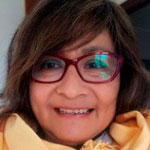 Matilde D’ Arrigo Huapaya
Directora de TFG
TFG Director
Doctor en Veterinaria por la Universidad Complutense de Madrid (UCM) e Ingeniera en Industrias Alimentarias y Máster en Tecnología de los Alimentos por la Universidad Nacional Agraria la Molina (UNALM)- Perú. En la actualidad, trabaja para el Centro de Investigaciones Científicas y Tecnológicas de Extremadura (CICYTEX) en la unidad de cárnicos del Instituto Tecnológico Agroalimentario de Extremadura (INTAEX). Su desarrollo profesional siempre ha sido en investigación participando en proyectos de seguridad alimentaria y microbiología predictiva. Las habilidades, propias y obtenidas por la experiencia, encajan en las áreas de ciencia, tecnología e ingeniería, todas necesarias para obtener resultados óptimos y útiles para la sociedad. Su capacidad como docente a nivel académico fue perfeccionada en la Facultad de Industrias alimentarias UNALM impartiendo asignaturas en ciencias de los alimentos, lo que confirma la capacidad para dirigir a alumnos de carrera, formar a personal técnico e investigador: Por último, la divulgación científica, académica y social como autora, se muestran con las publicaciones en revistas científicas y de difusión, la participación en jornadas, conferencias y congresos.
marrigo@nebrija.es
Matilde D’ Arrigo Huapaya
Directora de TFG
TFG Director
Doctor en Veterinaria por la Universidad Complutense de Madrid (UCM) e Ingeniera en Industrias Alimentarias y Máster en Tecnología de los Alimentos por la Universidad Nacional Agraria la Molina (UNALM)- Perú. En la actualidad, trabaja para el Centro de Investigaciones Científicas y Tecnológicas de Extremadura (CICYTEX) en la unidad de cárnicos del Instituto Tecnológico Agroalimentario de Extremadura (INTAEX). Su desarrollo profesional siempre ha sido en investigación participando en proyectos de seguridad alimentaria y microbiología predictiva. Las habilidades, propias y obtenidas por la experiencia, encajan en las áreas de ciencia, tecnología e ingeniería, todas necesarias para obtener resultados óptimos y útiles para la sociedad. Su capacidad como docente a nivel académico fue perfeccionada en la Facultad de Industrias alimentarias UNALM impartiendo asignaturas en ciencias de los alimentos, lo que confirma la capacidad para dirigir a alumnos de carrera, formar a personal técnico e investigador: Por último, la divulgación científica, académica y social como autora, se muestran con las publicaciones en revistas científicas y de difusión, la participación en jornadas, conferencias y congresos.
marrigo@nebrija.es
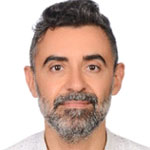 Marco Da Costa Bodelón
Profesor y Director TFG
Professor and TFG Director
Doctor en Filología Hispánica por la Universidad de Barcelona. Premio Extraordinario de Doctorado. Máster Universitario en Formación de Profesores de Español por la Universidad de Alcalá de Henares. Licenciado en Filología Hispánica por la Universidad de Barcelona. Profesor asociado en la Facultad de Lenguas y Educación de la Universidad Nebrija. Profesor con amplia experiencia en facultades de Humanidades y Ciencias Políticas. Autor de distintas publicaciones y presentaciones en congresos relacionadas con la literatura, el cine y la propaganda. Otras líneas de investigación: Educación, E/LE, Lingüística.
mdacostb@nebrija.es
Marco Da Costa Bodelón
Profesor y Director TFG
Professor and TFG Director
Doctor en Filología Hispánica por la Universidad de Barcelona. Premio Extraordinario de Doctorado. Máster Universitario en Formación de Profesores de Español por la Universidad de Alcalá de Henares. Licenciado en Filología Hispánica por la Universidad de Barcelona. Profesor asociado en la Facultad de Lenguas y Educación de la Universidad Nebrija. Profesor con amplia experiencia en facultades de Humanidades y Ciencias Políticas. Autor de distintas publicaciones y presentaciones en congresos relacionadas con la literatura, el cine y la propaganda. Otras líneas de investigación: Educación, E/LE, Lingüística.
mdacostb@nebrija.es
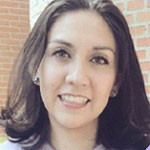 Virginia Danahe Sánchez Reza
Profesora y Directora TFG
Professor
Psicóloga especialista en psicología infantojuvenil, psicóloga educativa y psicóloga legal y forense. Experto universitario en detección y atención a niños de altas capacidades.
Doctoranda en psicología educativa y del desarrollo. "Detección del talento a través de
las Inteligencias Múltiples". Contribución en diferentes programas nacionales e internacionales sobre altas capacidades y talentos específicos. Profesora universitaria en psicología y educación.
vsanchezre@nebrija.es
Virginia Danahe Sánchez Reza
Profesora y Directora TFG
Professor
Psicóloga especialista en psicología infantojuvenil, psicóloga educativa y psicóloga legal y forense. Experto universitario en detección y atención a niños de altas capacidades.
Doctoranda en psicología educativa y del desarrollo. "Detección del talento a través de
las Inteligencias Múltiples". Contribución en diferentes programas nacionales e internacionales sobre altas capacidades y talentos específicos. Profesora universitaria en psicología y educación.
vsanchezre@nebrija.es
 Elena de Andrés Jiménez
Profesora y Directora TFG
Professor
Doctora en Psicología por la UMU y premio extraordinario de doctorado. Máster en Psicología Clínica y de la Salud (UMU). Máster en Psicología General Sanitaria (UMU). Licenciada en Psicología y especialización en intervención biopsicosocial en demencias. Psicóloga freelance y docente en diferentes Universidades en Grado de Educación Primaria e Infantil, Mención en Pedagogía Terapéutica, Grado en Psicología y en estudios de Máster relacionados con las necesidades educativas especiales, trastornos de conducta y psicología general sanitaria. Docente de diferentes cursos de formación relacionados con la comunicación asertiva, atención centrada en la persona, resiliencia, duelo, estimulación multisensorial, etc. Autora de publicaciones y presentaciones en congresos y jornadas de carácter nacional e internacional relacionados con la psicología, las personas cuidadoras y los trastornos neurocognitivos.
eandres@nebrija.es
Elena de Andrés Jiménez
Profesora y Directora TFG
Professor
Doctora en Psicología por la UMU y premio extraordinario de doctorado. Máster en Psicología Clínica y de la Salud (UMU). Máster en Psicología General Sanitaria (UMU). Licenciada en Psicología y especialización en intervención biopsicosocial en demencias. Psicóloga freelance y docente en diferentes Universidades en Grado de Educación Primaria e Infantil, Mención en Pedagogía Terapéutica, Grado en Psicología y en estudios de Máster relacionados con las necesidades educativas especiales, trastornos de conducta y psicología general sanitaria. Docente de diferentes cursos de formación relacionados con la comunicación asertiva, atención centrada en la persona, resiliencia, duelo, estimulación multisensorial, etc. Autora de publicaciones y presentaciones en congresos y jornadas de carácter nacional e internacional relacionados con la psicología, las personas cuidadoras y los trastornos neurocognitivos.
eandres@nebrija.es
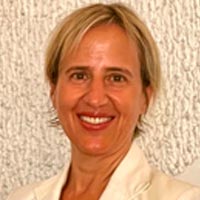 Ana de Biase
Profesora y Directora de TFG
Professor
Doctora en Psicología por la Universidad Autónoma de Madrid, con especialización en Adquisición del Lenguaje y Bilingüismo, y Máster en Psicología Cognitiva y Aprendizaje por la Fundación Latinoamericana de Ciencias Sociales (FLACSO). Licenciada en Sociología por la Universidad de Buenos Aires (UBA), donde se especializó en metodología e investigación. Es cofundadora y directora del Institute of Bilingual Education (ibE), institución dedicada a desarrollar proyectos educativos y culturales bilingües que promuevan contenidos de alta calidad y formación de excelencia a través de prácticas educativas y lingüísticas innovadoras.
Es autora de diversas publicaciones y ponencias en congresos internacionales sobre procesos cognitivos relacionados con la adquisición del lenguaje y el aprendizaje de segundas lenguas. En 2020, la Universidad de Chicago la honró con el Outstanding Educator Award, un premio que reconoce a educadores excepcionales por su influencia, apoyo y contribución al desarrollo intelectual y personal de sus estudiantes.
abiase@nebrija.es
Ana de Biase
Profesora y Directora de TFG
Professor
Doctora en Psicología por la Universidad Autónoma de Madrid, con especialización en Adquisición del Lenguaje y Bilingüismo, y Máster en Psicología Cognitiva y Aprendizaje por la Fundación Latinoamericana de Ciencias Sociales (FLACSO). Licenciada en Sociología por la Universidad de Buenos Aires (UBA), donde se especializó en metodología e investigación. Es cofundadora y directora del Institute of Bilingual Education (ibE), institución dedicada a desarrollar proyectos educativos y culturales bilingües que promuevan contenidos de alta calidad y formación de excelencia a través de prácticas educativas y lingüísticas innovadoras.
Es autora de diversas publicaciones y ponencias en congresos internacionales sobre procesos cognitivos relacionados con la adquisición del lenguaje y el aprendizaje de segundas lenguas. En 2020, la Universidad de Chicago la honró con el Outstanding Educator Award, un premio que reconoce a educadores excepcionales por su influencia, apoyo y contribución al desarrollo intelectual y personal de sus estudiantes.
abiase@nebrija.es
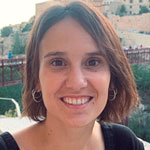 Ester de la Fuente Martín
Profesora y Directora TFG
Professor
Graduada en logopedia. Máster en Atención Temprana. Prevención, diagnóstico y tratamiento (Instituto Superior de Estudios Psicológicos). Especialización en evaluación e intervención en el Trastorno Específico del Lenguaje. (UAM). Logopeda con 10 años de experiencia en población infanto-juvenil. Docente de 3 ediciones del Máster en Intervención en Trastornos del Espectro del Autismo a lo largo del ciclo vital en la UCLM. Docente de distintos cursos de formación, sobre lenguaje, comunicación y autismo y de Atención Temprana. Coautora de posters y comunicaciones en congresos.
eandres@nebrija.es
Ester de la Fuente Martín
Profesora y Directora TFG
Professor
Graduada en logopedia. Máster en Atención Temprana. Prevención, diagnóstico y tratamiento (Instituto Superior de Estudios Psicológicos). Especialización en evaluación e intervención en el Trastorno Específico del Lenguaje. (UAM). Logopeda con 10 años de experiencia en población infanto-juvenil. Docente de 3 ediciones del Máster en Intervención en Trastornos del Espectro del Autismo a lo largo del ciclo vital en la UCLM. Docente de distintos cursos de formación, sobre lenguaje, comunicación y autismo y de Atención Temprana. Coautora de posters y comunicaciones en congresos.
eandres@nebrija.es
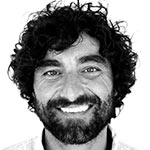 César De la Hoz Pérez
Profesor y Director TFG
Professor
Licenciado en Psicopedagogía (UCM). Master salud mental (Universidad León y AEU). Master Psicología Clínica (Instituto Psicología Aplicada Alborán). Mediador familiar (UNAF). Experto en Psicopatología y Psicodiagnóstico (Instituto Galene). Master en educación Ambiental (INIEC). Profesor Universidad Castilla la Mancha, profesor escuela ciencias de la salud (UCM), profesor colegios profesionales, centros de Apoyo al Profesorado y asociaciones de intervención infancia y familia en: mediación escolar, familiar y procesal, intervención psicosocial con familias y adolescentes con trastornos de la conducta, bullying y resolución de conflictos. Ha sido director de centro de menores con trastornos de conducta, coordinador programa de infancia y familia, mediador escolar en CEIP e IES y mediador familiar en centro de mediación e intervención familiar y punto de encuentro familiar. Profesor de primaria y convivencia en escuela IDEO (Madrid). Profesor en master de mediación y orientación familiar de la UPSA. Profesor técnicas de modificación de conducta en el aula en Universidad Antonio Nebrija y acompañante terapeútico con menores y familias.
choz@nebrija.es
César De la Hoz Pérez
Profesor y Director TFG
Professor
Licenciado en Psicopedagogía (UCM). Master salud mental (Universidad León y AEU). Master Psicología Clínica (Instituto Psicología Aplicada Alborán). Mediador familiar (UNAF). Experto en Psicopatología y Psicodiagnóstico (Instituto Galene). Master en educación Ambiental (INIEC). Profesor Universidad Castilla la Mancha, profesor escuela ciencias de la salud (UCM), profesor colegios profesionales, centros de Apoyo al Profesorado y asociaciones de intervención infancia y familia en: mediación escolar, familiar y procesal, intervención psicosocial con familias y adolescentes con trastornos de la conducta, bullying y resolución de conflictos. Ha sido director de centro de menores con trastornos de conducta, coordinador programa de infancia y familia, mediador escolar en CEIP e IES y mediador familiar en centro de mediación e intervención familiar y punto de encuentro familiar. Profesor de primaria y convivencia en escuela IDEO (Madrid). Profesor en master de mediación y orientación familiar de la UPSA. Profesor técnicas de modificación de conducta en el aula en Universidad Antonio Nebrija y acompañante terapeútico con menores y familias.
choz@nebrija.es
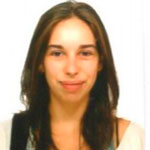 Elsa del Campo Ramírez
Profesora y Directora TFG
Professor
Doctora suma cum laude en Estudios Literarios por Universidad Complutense de Madrid. Licenciada en Filología Inglesa por la Universidad Complutense de Madrid. Profesionalmente ha ejercido la docencia en diversas universidades, y cuenta con una amplia experiencia profesional en el campo de la enseñanza del inglés como segunda lengua en diversas empresas y proyectos educativos para la formación del profesorado. Ha participado en múltiples congresos literarios de notoria repercusión tanto a nivel nacional como internacional. Posee diversas publicaciones en revistas científicas.
ecampo@nebrija.es
Elsa del Campo Ramírez
Profesora y Directora TFG
Professor
Doctora suma cum laude en Estudios Literarios por Universidad Complutense de Madrid. Licenciada en Filología Inglesa por la Universidad Complutense de Madrid. Profesionalmente ha ejercido la docencia en diversas universidades, y cuenta con una amplia experiencia profesional en el campo de la enseñanza del inglés como segunda lengua en diversas empresas y proyectos educativos para la formación del profesorado. Ha participado en múltiples congresos literarios de notoria repercusión tanto a nivel nacional como internacional. Posee diversas publicaciones en revistas científicas.
ecampo@nebrija.es
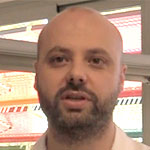 Jonathan Delgado Adámez
Profesor y Director TFG
Professor
Doctor en Ciencias (Biología) por la Universidad de Extremadura. Premio Extraordinario de Doctorado. Estancia de investigación en el Centro de Apoio Tecnológico Agro-Alimentar (CATAA) de Castelo Branco (Portugal). Participación en numerosos Proyectos regionales, nacionales e internacionales y en la producción de artículos científicos en revistar incluidas en JCR, así como en libros y de publicaciones docentes. Experiencia docente a nivel universitario, en los Grados Educación Primaria y Educación Infantil, así como en la impartición de cursos de perfeccionamiento. jdelgadoa@nebrija.es
Jonathan Delgado Adámez
Profesor y Director TFG
Professor
Doctor en Ciencias (Biología) por la Universidad de Extremadura. Premio Extraordinario de Doctorado. Estancia de investigación en el Centro de Apoio Tecnológico Agro-Alimentar (CATAA) de Castelo Branco (Portugal). Participación en numerosos Proyectos regionales, nacionales e internacionales y en la producción de artículos científicos en revistar incluidas en JCR, así como en libros y de publicaciones docentes. Experiencia docente a nivel universitario, en los Grados Educación Primaria y Educación Infantil, así como en la impartición de cursos de perfeccionamiento. jdelgadoa@nebrija.es
 Fernando Evaristo Díaz Manzano
Director de TFG
TFG Director
Doctor acreditado en Ciencias por la Universidad de Castilla La Mancha. Máster en Biotecnología por la Universidad Autónoma de Madrid. Máster en Profesorado por la Universidad de Castilla La Mancha. Destacar su docencia desde 2010 a alumnos universitarios del Grado de Bioquímica (Fundamentos de Biología Celular, 1er curso) y del Grado de Ciencias Ambientales (Fisiología Vegetal, 2º curso) en la Universidad de Castilla-La Mancha; desde 2018, en el Grado de Educación Primaria (Didáctica de las Ciencias Experimentales, 4º curso) y Máster en Procesos Educativos (Cerebro y Aprendizaje) en la Universidad de Antonio de Nebrija; y a alumnos de Secundaria y Bachillerato en Institutos de la Consejería de Educación de Castilla La Mancha (Biología y Geología; Cultura Científica; Ciencias de la Tierra); y por último, desde 2019, a alumnos del Máster en Profesorado de la Universidad Internacional de La Rioja (especialidad en Ciencias Experimentales).
fdiazman@nebrija.es
Fernando Evaristo Díaz Manzano
Director de TFG
TFG Director
Doctor acreditado en Ciencias por la Universidad de Castilla La Mancha. Máster en Biotecnología por la Universidad Autónoma de Madrid. Máster en Profesorado por la Universidad de Castilla La Mancha. Destacar su docencia desde 2010 a alumnos universitarios del Grado de Bioquímica (Fundamentos de Biología Celular, 1er curso) y del Grado de Ciencias Ambientales (Fisiología Vegetal, 2º curso) en la Universidad de Castilla-La Mancha; desde 2018, en el Grado de Educación Primaria (Didáctica de las Ciencias Experimentales, 4º curso) y Máster en Procesos Educativos (Cerebro y Aprendizaje) en la Universidad de Antonio de Nebrija; y a alumnos de Secundaria y Bachillerato en Institutos de la Consejería de Educación de Castilla La Mancha (Biología y Geología; Cultura Científica; Ciencias de la Tierra); y por último, desde 2019, a alumnos del Máster en Profesorado de la Universidad Internacional de La Rioja (especialidad en Ciencias Experimentales).
fdiazman@nebrija.es
 Jon Andoni Duñabeita Landaburu
Director de TFG
TFG Director
Doctor en Psicología por la Universidad de La Laguna, Licenciado en Psicopedagogía por la Universidad de Deusto y Diplomado en Magisterio por la Universidad del País Vasco. Es experto en neurociencia cognitiva del lenguaje. Es Profesor Director e Investigador Principal de la Facultad de Lenguas y Educación de la Universidad Nebrija donde dirige el Grupo de Investigación LAELE, y además es científico asociado al Basque Center on Cognition, Brain and Language (BCBL), donde durante los últimos años ha dirigido el Grupo de Investigación Multilingual Literacy. Tiene amplia experiencia gestionando equipos de trabajo internacionales y proyectos de investigación en entornos interculturales. Su trabajo de investigación se centra en el estudio científico de los aspectos relacionados con la adquisición de lenguas nativas y extranjeras a lo largo del ciclo vital, explorando el papel de la alfabetización multilingüe y el rol de la alternancia de lenguas como medio de instrucción.
Jon Andoni Duñabeita Landaburu
Director de TFG
TFG Director
Doctor en Psicología por la Universidad de La Laguna, Licenciado en Psicopedagogía por la Universidad de Deusto y Diplomado en Magisterio por la Universidad del País Vasco. Es experto en neurociencia cognitiva del lenguaje. Es Profesor Director e Investigador Principal de la Facultad de Lenguas y Educación de la Universidad Nebrija donde dirige el Grupo de Investigación LAELE, y además es científico asociado al Basque Center on Cognition, Brain and Language (BCBL), donde durante los últimos años ha dirigido el Grupo de Investigación Multilingual Literacy. Tiene amplia experiencia gestionando equipos de trabajo internacionales y proyectos de investigación en entornos interculturales. Su trabajo de investigación se centra en el estudio científico de los aspectos relacionados con la adquisición de lenguas nativas y extranjeras a lo largo del ciclo vital, explorando el papel de la alfabetización multilingüe y el rol de la alternancia de lenguas como medio de instrucción.
jdunabeitia@nebrija.es
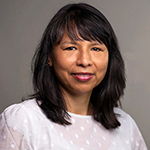 Sulma Farfán Sossa
Directora de TFG
TFG Director
Doctora Cum laude en Educación con Premio Extraordinario de Doctorado por la Universidad Nacional de Educación a Distancia (UNED). Licenciada en Informática por la Universidad Mayor de San Andrés-Bolivia. Cuenta con acreditación de la ANECA. Ha cursado los siguientes Maestrias: Ingénierie des Médias pour l’Education-Université de Poitiers-Francia, Ciencias de la Educación. Especialidad Tecnología Educativa-Universidad Técnica de Lisboa-Portugal, Informática Educativa-UNED-España, Ingeniería Informática-Universidad Autónoma Juan Misael Saracho(UAJMS)-Bolivia. Ha sido directora de diversos proyectos de innovación universitaria basados en las TIC y organizadora de diversos congresos y seminarios internacionales relacionados con TIC, Educación y Ciberdelitos.
Ha dirigido proyectos tecnológicos en el ámbito de la educación superior a nivel nacional en Bolivia. Ha sido profesora titular de la carrera de Informática en la UAJMS-Bolivia y ha impartido docencia en el Master de Tecnologías para la Educación y el Conocimiento. UNED-España (2010-2012). Ha sido Asesora en Tecnología Educativa y Evaluación Universitaria en la Saint Louis University Madrid Campus (2007-2020). Ha recibido diversos premios y reconocimientos por su labor en favor de la educación en Bolivia. Colabora como juez externo con las revistas: CEPAL, RAIA-UAI-Argentina y SUMA- UST-Chile.
Sulma Farfán Sossa
Directora de TFG
TFG Director
Doctora Cum laude en Educación con Premio Extraordinario de Doctorado por la Universidad Nacional de Educación a Distancia (UNED). Licenciada en Informática por la Universidad Mayor de San Andrés-Bolivia. Cuenta con acreditación de la ANECA. Ha cursado los siguientes Maestrias: Ingénierie des Médias pour l’Education-Université de Poitiers-Francia, Ciencias de la Educación. Especialidad Tecnología Educativa-Universidad Técnica de Lisboa-Portugal, Informática Educativa-UNED-España, Ingeniería Informática-Universidad Autónoma Juan Misael Saracho(UAJMS)-Bolivia. Ha sido directora de diversos proyectos de innovación universitaria basados en las TIC y organizadora de diversos congresos y seminarios internacionales relacionados con TIC, Educación y Ciberdelitos.
Ha dirigido proyectos tecnológicos en el ámbito de la educación superior a nivel nacional en Bolivia. Ha sido profesora titular de la carrera de Informática en la UAJMS-Bolivia y ha impartido docencia en el Master de Tecnologías para la Educación y el Conocimiento. UNED-España (2010-2012). Ha sido Asesora en Tecnología Educativa y Evaluación Universitaria en la Saint Louis University Madrid Campus (2007-2020). Ha recibido diversos premios y reconocimientos por su labor en favor de la educación en Bolivia. Colabora como juez externo con las revistas: CEPAL, RAIA-UAI-Argentina y SUMA- UST-Chile.
sfarfan@nebrija.es
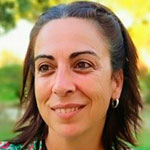 Ana Fernández Alonso
Profesora y Directora TFG
Professor and TFG Director
Maestra especialista en Educación Infantil y Educadora Social por vocación y convicción.
Ana Fernández Alonso
Profesora y Directora TFG
Professor and TFG Director
Maestra especialista en Educación Infantil y Educadora Social por vocación y convicción. Con más de 15 años de experiencia formando parte de distintos proyectos educativos.
Como Maestra en Escuelas Infantiles públicas y privadas y en diversos colegios de carácter concertado, desempeñando funciones de tutora, gestión y coordinación y haciéndose cargo de la escuela de padres y de buscar la implicación activa y directa de las familias.
Como Educadora Social, participando en proyectos de intervención familiar, ocio y tiempo libre con infancia y juventud e integración social de personas con discapacidad intelectual.
El gusto por la educación y la formación, y la búsqueda de la implicación social, le ha llevado en los últimos años a dedicarse a la formación de futuros formadores en diversas Universidades Españolas.
afernandezalo@nebrija.es
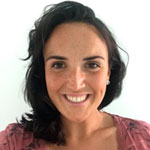 Estela Mª Fernández Pérez
Profesora y Directora TFG
Professor
Graduada en Logopedia. Máster en Atención temprana y Máster en autismo. Ha trabajado como logopeda en centros de intervención en área de atención temprana y atención infanto juvenil. Ha sido profesora en la Universidad Pablo de Olavide y en la Universidad Universidad Anahuac. Actualmente compagina la docencia en Nebrija con la dirección del centro de Logopedia Estela Fernández, así como su trabajo de logopeda en el área de Neurorehabilitación del hospital de Guadalajara.
Investigadora colaboradora en Proyecto dirigido por Miguel Galeote de UMA con UAM sobre desarrollo de lenguaje en síndrome de Down.
Estela Mª Fernández Pérez
Profesora y Directora TFG
Professor
Graduada en Logopedia. Máster en Atención temprana y Máster en autismo. Ha trabajado como logopeda en centros de intervención en área de atención temprana y atención infanto juvenil. Ha sido profesora en la Universidad Pablo de Olavide y en la Universidad Universidad Anahuac. Actualmente compagina la docencia en Nebrija con la dirección del centro de Logopedia Estela Fernández, así como su trabajo de logopeda en el área de Neurorehabilitación del hospital de Guadalajara.
Investigadora colaboradora en Proyecto dirigido por Miguel Galeote de UMA con UAM sobre desarrollo de lenguaje en síndrome de Down.
efernandezpe@nebrija.es
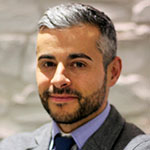 Iván Fernández Suárez
Director de TFG
Professor
Doctor en Psicosociología Aplicada por la Universidad Pública de Navarra y Licenciado en Pedagogía por la Universidad Nacional de Educación a Distancia (UNED). Profesor asociado en la Universidad Internacional de la Rioja desde 2010 especializado en la docencia online en grados y posgrados, así como en la dirección y evaluación de Trabajos Finales de Máster. Ha participado en diferentes congresos y es autor de distintas publicaciones. Asimismo, ha realizado labores de divulgación científica en distintas conferencias de índole nacional e internacional.
Iván Fernández Suárez
Director de TFG
Professor
Doctor en Psicosociología Aplicada por la Universidad Pública de Navarra y Licenciado en Pedagogía por la Universidad Nacional de Educación a Distancia (UNED). Profesor asociado en la Universidad Internacional de la Rioja desde 2010 especializado en la docencia online en grados y posgrados, así como en la dirección y evaluación de Trabajos Finales de Máster. Ha participado en diferentes congresos y es autor de distintas publicaciones. Asimismo, ha realizado labores de divulgación científica en distintas conferencias de índole nacional e internacional.
ifernándezsu@nebrija.es
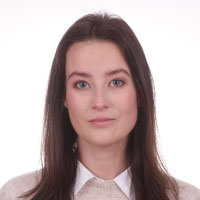 JENNIFER FOLEY
Profesora y Directora de TFG
Professor and Director of TFG
Profesora de inglés titulada CELT, con un Máster en Lingüística Aplicada por la Universidad Autónoma de Madrid. Actualmente estoy cursando un doctorado en Lingüística Cognitiva, enfocándome en comunicación de salud mental y redes sociales. Desde 2016 imparto clases de inglés en España a estudiantes universitarios, escolares y profesionales del sector energético, financiero, publicitario y de marketing.
JENNIFER FOLEY
Profesora y Directora de TFG
Professor and Director of TFG
Profesora de inglés titulada CELT, con un Máster en Lingüística Aplicada por la Universidad Autónoma de Madrid. Actualmente estoy cursando un doctorado en Lingüística Cognitiva, enfocándome en comunicación de salud mental y redes sociales. Desde 2016 imparto clases de inglés en España a estudiantes universitarios, escolares y profesionales del sector energético, financiero, publicitario y de marketing.
jfoley@nebrija.es
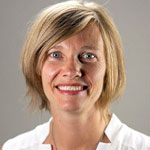 Alice Foucart
Directora de TFG
Professor
Investigadora principal del Grupo Nebrija en Lingüística Aplicada a la Enseñanza de Lenguas Extranjeras. Doctora por la University of Edinburgh (Reino Unido) y por la Université de Provence (Francia), cuenta con un Máster en Ciencias del Lenguaje por la Université de Provence y la University of York (Reino Unido) y es licenciada en Filología Inglesa por la Université de Lille (Francia). A lo largo de su trayectoria profesional ha trabajado como investigadora postdoctoral en tres instituciones del Reino Unido: Heriot-Watt University, University of Edinburgh y University of Bangor. Además, ha formado parte del claustro de la Universitat Pompeu Fabra y ha dirigido un proyecto Marie Sklodowska-Curie en Ghent University (Bélgica). Es editora asociada de las revistas Second Language Research y Frontiers in Psychology. Como docente, imparte clases en los ámbitos de Lingüística Francesa, Psicología y Neurociencia.
Alice Foucart
Directora de TFG
Professor
Investigadora principal del Grupo Nebrija en Lingüística Aplicada a la Enseñanza de Lenguas Extranjeras. Doctora por la University of Edinburgh (Reino Unido) y por la Université de Provence (Francia), cuenta con un Máster en Ciencias del Lenguaje por la Université de Provence y la University of York (Reino Unido) y es licenciada en Filología Inglesa por la Université de Lille (Francia). A lo largo de su trayectoria profesional ha trabajado como investigadora postdoctoral en tres instituciones del Reino Unido: Heriot-Watt University, University of Edinburgh y University of Bangor. Además, ha formado parte del claustro de la Universitat Pompeu Fabra y ha dirigido un proyecto Marie Sklodowska-Curie en Ghent University (Bélgica). Es editora asociada de las revistas Second Language Research y Frontiers in Psychology. Como docente, imparte clases en los ámbitos de Lingüística Francesa, Psicología y Neurociencia.
afoucart@nebrija.es
 Alejandro Galán Marín
Profesor y Director de TFG
Professor and Director of TFG
Graduado en Educación Primaria con Mención en inglés por la Universidad Nebrija. Profesor de Grado en la Facultad de Lenguas y Educación. Docente en cursos de formación en inglés. Desde 2019, ha sido docente en los niveles de Educación Infantil y Educación Primaria, tanto en España como en un contexto internacional (Dublín). Especialista en Ciencias Sociales y Naturales, entre otras áreas de conocimiento.
Alejandro Galán Marín
Profesor y Director de TFG
Professor and Director of TFG
Graduado en Educación Primaria con Mención en inglés por la Universidad Nebrija. Profesor de Grado en la Facultad de Lenguas y Educación. Docente en cursos de formación en inglés. Desde 2019, ha sido docente en los niveles de Educación Infantil y Educación Primaria, tanto en España como en un contexto internacional (Dublín). Especialista en Ciencias Sociales y Naturales, entre otras áreas de conocimiento.
agalamar@nebrija.es
 Carmen Gallego Domínguez
Directora de TFG
Professor
Doctora en Educación con mención internacional por la Universidad de Sevilla y Texas A&M University (Estados Unidos). Acreditada. Con estancias de investigación en República Dominicana, Texas e Israel durante su formación doctoral. Así mismo posee másteres en dirección de instituciones educativas y E-Learning (aprendizaje a través de Internet). Su formación previa es diplomada en educación primaria y licenciada en psicopedagogía. Docente en Grados de Educación Primaria, Infantil, Pedagogía; Máster en Tecnología y en Orientación Educativa. Directora de Trabajos Fin de Máster y orientadora en tesis doctorales de estudiantes internacionales. Investigadora en colaboración con universidades como Texas A&M o Coastal Carolina (Estados Unidos) y Univesity of Haifa (Israel), entre otras. Algunos de los grupos de investigación en los que forma parte como colaboradora e investigadora son el Grupo IDEA; International Study Association on Teachers and Teaching-ISATT; American Educational Research Association; Teaching, Learning and Culture in the College of Education and Human Development; entre otros. Las publicaciones versan sobre profesorado principiante, mentoría, mejora escolar y tecnologías en educación, teniendo más de ochenta publicaciones en total.
Carmen Gallego Domínguez
Directora de TFG
Professor
Doctora en Educación con mención internacional por la Universidad de Sevilla y Texas A&M University (Estados Unidos). Acreditada. Con estancias de investigación en República Dominicana, Texas e Israel durante su formación doctoral. Así mismo posee másteres en dirección de instituciones educativas y E-Learning (aprendizaje a través de Internet). Su formación previa es diplomada en educación primaria y licenciada en psicopedagogía. Docente en Grados de Educación Primaria, Infantil, Pedagogía; Máster en Tecnología y en Orientación Educativa. Directora de Trabajos Fin de Máster y orientadora en tesis doctorales de estudiantes internacionales. Investigadora en colaboración con universidades como Texas A&M o Coastal Carolina (Estados Unidos) y Univesity of Haifa (Israel), entre otras. Algunos de los grupos de investigación en los que forma parte como colaboradora e investigadora son el Grupo IDEA; International Study Association on Teachers and Teaching-ISATT; American Educational Research Association; Teaching, Learning and Culture in the College of Education and Human Development; entre otros. Las publicaciones versan sobre profesorado principiante, mentoría, mejora escolar y tecnologías en educación, teniendo más de ochenta publicaciones en total.
cgallego@nebrija.es
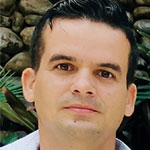 Alién García Hernández
Director de TFG
Professor
Doctor en Educación por la Universidad de Sevilla. Ingeniero en Ciencias Informáticas por la Universidad de las Ciencias Informáticas (Cuba). Obtuvo el Premio a la Sostenibilidad de la Asociación Universitaria Iberoamericana de Posgrado (AUIP) en la modalidad de Tesis Doctoral 2020. Ha ejercido la docencia en diferentes universidades desde 2009: Universidad de las Ciencias Informáticas (Cuba), Universidad de la Habana (Cuba) y Universidad de Nebrija. Cuenta con experiencia profesional en la dirección, gestión y control de personas y procesos, ocupando cargos como Director de Extensión Universitaria y Director de Departamento. Sus líneas principales de investigación son las Tecnologías en la Educación, la Didáctica de las Matemáticas además de los Métodos de Investigación y Diagnóstico en Educación. Ha publicado artículos, capítulo de libro y participado en congresos internacionales sobre dichas temáticas. Ha participado en el diseño y dirección de proyectos asociados al desarrollo de software educativo.
Alién García Hernández
Director de TFG
Professor
Doctor en Educación por la Universidad de Sevilla. Ingeniero en Ciencias Informáticas por la Universidad de las Ciencias Informáticas (Cuba). Obtuvo el Premio a la Sostenibilidad de la Asociación Universitaria Iberoamericana de Posgrado (AUIP) en la modalidad de Tesis Doctoral 2020. Ha ejercido la docencia en diferentes universidades desde 2009: Universidad de las Ciencias Informáticas (Cuba), Universidad de la Habana (Cuba) y Universidad de Nebrija. Cuenta con experiencia profesional en la dirección, gestión y control de personas y procesos, ocupando cargos como Director de Extensión Universitaria y Director de Departamento. Sus líneas principales de investigación son las Tecnologías en la Educación, la Didáctica de las Matemáticas además de los Métodos de Investigación y Diagnóstico en Educación. Ha publicado artículos, capítulo de libro y participado en congresos internacionales sobre dichas temáticas. Ha participado en el diseño y dirección de proyectos asociados al desarrollo de software educativo.
agarciahe@nebrija.es
 PAULA GARCÍA SANZ
Profesora y Directora de TFG
Professor and TFG Director
Graduada en Magisterio de Educación Infantil y Primaria por la UAH. Máster en Atención a la Diversidad y Apoyos educativos en el aula (CES). Profesora de la Mención de Inglés en el Grado de Educación Infantil y Primaria en la Facultad de Lenguas y Educación. Profesora del Grado Bilingüe de Educación Infantil y Primaria en la misma facultad. Autora de la publicación “Health Diagnosis through Drawings in a Tanzanian Child Population” en JSM Central.
PAULA GARCÍA SANZ
Profesora y Directora de TFG
Professor and TFG Director
Graduada en Magisterio de Educación Infantil y Primaria por la UAH. Máster en Atención a la Diversidad y Apoyos educativos en el aula (CES). Profesora de la Mención de Inglés en el Grado de Educación Infantil y Primaria en la Facultad de Lenguas y Educación. Profesora del Grado Bilingüe de Educación Infantil y Primaria en la misma facultad. Autora de la publicación “Health Diagnosis through Drawings in a Tanzanian Child Population” en JSM Central.
pgarcisa@nebrija.es
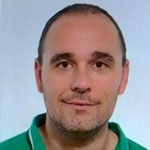 Juan Diego Gómez-Escalonilla Torrijos
Profesor y Director TFG
Professor and TFG Director
Doctor en Educación por la Universidad Camilo José Cela. Maestro de Primaria y especialista en Inglés y Educación Física (UCLM). Línea de investigación e innovación sobre neurociencias aplicadas al proceso de aprendizaje (motivación y lectoescritura). Ha impartido docencia en el Grado de Maestro Infantil y Primaria de UNIR. Durante más de veinte años ha trabajado en el ámbito educativo impartiendo clases a infantil, primaria secundaria y adultos, y ha sido director de TFG y TFM.
Juan Diego Gómez-Escalonilla Torrijos
Profesor y Director TFG
Professor and TFG Director
Doctor en Educación por la Universidad Camilo José Cela. Maestro de Primaria y especialista en Inglés y Educación Física (UCLM). Línea de investigación e innovación sobre neurociencias aplicadas al proceso de aprendizaje (motivación y lectoescritura). Ha impartido docencia en el Grado de Maestro Infantil y Primaria de UNIR. Durante más de veinte años ha trabajado en el ámbito educativo impartiendo clases a infantil, primaria secundaria y adultos, y ha sido director de TFG y TFM.
jgomezescalonilla@nebrija.es
 Mª Isabel Gómez León
Profesora y Directora TFG
Professor
Doctora en Neuropsicología, Licenciada en Psicología clínica y Psicología Educativa, Máster en Atención Temprana, Máster en Logopedia Clínica y Escolar, Especialista en Neuropsicología del TDAH, Especialista en el TEA , Altas Capacidades intelectuales, Neuropsicología de la Educación.
Gerente de un centro de Neuropsicología infantil, especializado en niños con Altas Capacidades, niños con TDAH, niños con TEA, y niños con Trastornos del Lenguaje y la Comunicación. Autora de contenidos y profesora de postgrado en las titulaciones de Máster de Educación Especial, Máster de Neuromarketing y Máster de Neuropsicología y Educación en la Universidad Internacional de La Rioja; profesora de postgrado en las titulaciones de Máster de Procesos Educativos de Enseñanza y Aprendizaje y Máster de Atención a la Diversidad, profesora de los grados de Educación Infantil y Educación Primaria en la Universidad Nebrija; y profesora de postgrado en las titulaciones de Máster de Competencias Docentes Avanzadas y del Máster de Orientación e Intervención Psicopedagógica en la Universidad Camilo José Cela. Especialista en investigación y desarrollo en la Universidad Politécnica de Madrid.
Mª Isabel Gómez León
Profesora y Directora TFG
Professor
Doctora en Neuropsicología, Licenciada en Psicología clínica y Psicología Educativa, Máster en Atención Temprana, Máster en Logopedia Clínica y Escolar, Especialista en Neuropsicología del TDAH, Especialista en el TEA , Altas Capacidades intelectuales, Neuropsicología de la Educación.
Gerente de un centro de Neuropsicología infantil, especializado en niños con Altas Capacidades, niños con TDAH, niños con TEA, y niños con Trastornos del Lenguaje y la Comunicación. Autora de contenidos y profesora de postgrado en las titulaciones de Máster de Educación Especial, Máster de Neuromarketing y Máster de Neuropsicología y Educación en la Universidad Internacional de La Rioja; profesora de postgrado en las titulaciones de Máster de Procesos Educativos de Enseñanza y Aprendizaje y Máster de Atención a la Diversidad, profesora de los grados de Educación Infantil y Educación Primaria en la Universidad Nebrija; y profesora de postgrado en las titulaciones de Máster de Competencias Docentes Avanzadas y del Máster de Orientación e Intervención Psicopedagógica en la Universidad Camilo José Cela. Especialista en investigación y desarrollo en la Universidad Politécnica de Madrid.
mgomezle@nebrija.es
 Andrea González García
Profesora y Directora TFG
Professor
Doctoranda (FPU) en la Universidad Antonio de Nebrija en el programa de Lingüística Aplicada a la Enseñanza de Lenguas. Su interés se centra en el procesamiento emocional durante la interacción social en una segunda lengua. Graduada en Educación Infantil y Primaria con mención en inglés, obtiene el Máster en Enseñanza Bilingüe en la Universidad Antonio de Nebrija. Además, posee el título Superior de Música en el Real Conservatorio Superior de Música de Madrid. Receptora de la Beca de Excelencia de la Comunidad de Madrid (2015, 2016, 2017, 2018 y 2019) y becada por la Fundación Antonio de Nebrija, realizó prácticas extracurriculares en The British Council Teaching Centre. Finalizó sus estudios de grado obteniendo la Mención Nebrija a mejor expediente académico de Grado de la Facultad de Lenguas y Educación. Obtuvo el premio al mejor Trabajo Fin de Grado en el IV Congreso Internacional Nebrija de Lingüística Aplicada a la Enseñanza de Lenguas. Finalizó simultáneamente sus estudios profesionales de música obteniendo el Premio Fin de Grado Profesional en la especialidad de oboe. Tras finalizar el máster, obtuvo el Premio Nebrija-Santander TFM en líneas de cátedras de Enseñanza del Español como Lengua de Migrantes y Refugiados. Es nativa en español y posee un nivel C2 de inglés. Posee un nivel B2 en francés complementado con estancias lingüísticas en Burdeos y Toulouse. Colabora como oboísta activamente con la Orquesta de Coro y Cámara Sonora y la Friedenscamerata.
Andrea González García
Profesora y Directora TFG
Professor
Doctoranda (FPU) en la Universidad Antonio de Nebrija en el programa de Lingüística Aplicada a la Enseñanza de Lenguas. Su interés se centra en el procesamiento emocional durante la interacción social en una segunda lengua. Graduada en Educación Infantil y Primaria con mención en inglés, obtiene el Máster en Enseñanza Bilingüe en la Universidad Antonio de Nebrija. Además, posee el título Superior de Música en el Real Conservatorio Superior de Música de Madrid. Receptora de la Beca de Excelencia de la Comunidad de Madrid (2015, 2016, 2017, 2018 y 2019) y becada por la Fundación Antonio de Nebrija, realizó prácticas extracurriculares en The British Council Teaching Centre. Finalizó sus estudios de grado obteniendo la Mención Nebrija a mejor expediente académico de Grado de la Facultad de Lenguas y Educación. Obtuvo el premio al mejor Trabajo Fin de Grado en el IV Congreso Internacional Nebrija de Lingüística Aplicada a la Enseñanza de Lenguas. Finalizó simultáneamente sus estudios profesionales de música obteniendo el Premio Fin de Grado Profesional en la especialidad de oboe. Tras finalizar el máster, obtuvo el Premio Nebrija-Santander TFM en líneas de cátedras de Enseñanza del Español como Lengua de Migrantes y Refugiados. Es nativa en español y posee un nivel C2 de inglés. Posee un nivel B2 en francés complementado con estancias lingüísticas en Burdeos y Toulouse. Colabora como oboísta activamente con la Orquesta de Coro y Cámara Sonora y la Friedenscamerata.
agonzalezga@nebrija.es
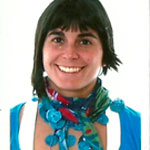 Laura González Saiz
Profesora y Directora TFG
Professor and TFG Director
Licenciada y Doctora en Ciencias de la Actividad Física y del Deporte (ambas por la Universidad Europea de Madrid) posee también un Máster en Actividad Física y Salud.
Laura González Saiz
Profesora y Directora TFG
Professor and TFG Director
Licenciada y Doctora en Ciencias de la Actividad Física y del Deporte (ambas por la Universidad Europea de Madrid) posee también un Máster en Actividad Física y Salud.Es profesora colaboradora en el Máster de Actividad Física y Salud de la Universidad Europea de Madrid y ha trabajado como profesora asociada a la Universidad de Zaragoza impartiendo diversas asignaturas tanto en el Grado de Magisterio de Infantil como de Primaria.
Posee varias publicaciones relacionadas sobre la influencia del ejercicio físico en pacientes con diversas patologías.
lgonzalezsa@nebrija.es
 Alfonso González Garrido
Profesor y Director TFG
Professor
Alfonso González Garrido es Grado de Educación Primaria e Infantil con especialidades en música, audición y lenguaje, pedagogía terapéutica e inglés, máster en psicopedagogía e investigador en materias de inclusión, habiéndose especializado como comunicador de lengua de signos española y con personas con trastorno del espectro autista, dedicándose en la actualidad a formar a maestros y profesores a través del Centro de Formación e Innovación Educativa de Castilla y León. Además de la formación académica es Diplomado en danza clásica especializado en coreografía de la escuela de Víctor Ullate y entrenador de gimnasia rítmica. Ha recibido el premio “Juntos hacemos vida” 2021 por su labor en el ámbito de la inclusión creando espectáculos como: “Musical el Mago de Oz” o las cinco ediciones del “Árbol de los deseos” (considerado de interés turístico nacional por la Junta de Castilla y León). Cuenta además con éxitos deportivos con medallistas autonómicas y gimnastas nacionales.
agonzalezgar@nebrija.es
Alfonso González Garrido
Profesor y Director TFG
Professor
Alfonso González Garrido es Grado de Educación Primaria e Infantil con especialidades en música, audición y lenguaje, pedagogía terapéutica e inglés, máster en psicopedagogía e investigador en materias de inclusión, habiéndose especializado como comunicador de lengua de signos española y con personas con trastorno del espectro autista, dedicándose en la actualidad a formar a maestros y profesores a través del Centro de Formación e Innovación Educativa de Castilla y León. Además de la formación académica es Diplomado en danza clásica especializado en coreografía de la escuela de Víctor Ullate y entrenador de gimnasia rítmica. Ha recibido el premio “Juntos hacemos vida” 2021 por su labor en el ámbito de la inclusión creando espectáculos como: “Musical el Mago de Oz” o las cinco ediciones del “Árbol de los deseos” (considerado de interés turístico nacional por la Junta de Castilla y León). Cuenta además con éxitos deportivos con medallistas autonómicas y gimnastas nacionales.
agonzalezgar@nebrija.es
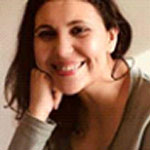 María Concepción Gordo Alonso
Profesora y Directora TFG
Professor
Doctoranda en la Facultad de Formación del Profesorado y Educación de la Universidad Autónoma de Madrid, la línea de investigación es el impacto de la Comunicación No Verbal en docencia. Licenciada en Derecho por la Universidad Complutense de Madrid y Graduada en Psicología por la Universidad Internacional de La Rioja. Máster en Coaching, Inteligencia Emocional y Relacional y Ciencia Cognitiva en la Universidad de Alcalá de Henares. Como otras formaciones estudió Programación Neurolingüística y es experta en Comunicación No Verbal método BodySystemics. Escribe sobre emociones y Comunicación No Verbal en diferentes publicaciones y Blogs. Es ponente del Máster Universitario en Arteterapia y Educación Artística para la inclusión social y trabaja desde hace más de 20 años en el Departamento de Marketing Online de Openbank banco online del Grupo Santander donde es la líder de Personal Skills el club de crecimiento personal para empleados.
mgordo@nebrija.es
María Concepción Gordo Alonso
Profesora y Directora TFG
Professor
Doctoranda en la Facultad de Formación del Profesorado y Educación de la Universidad Autónoma de Madrid, la línea de investigación es el impacto de la Comunicación No Verbal en docencia. Licenciada en Derecho por la Universidad Complutense de Madrid y Graduada en Psicología por la Universidad Internacional de La Rioja. Máster en Coaching, Inteligencia Emocional y Relacional y Ciencia Cognitiva en la Universidad de Alcalá de Henares. Como otras formaciones estudió Programación Neurolingüística y es experta en Comunicación No Verbal método BodySystemics. Escribe sobre emociones y Comunicación No Verbal en diferentes publicaciones y Blogs. Es ponente del Máster Universitario en Arteterapia y Educación Artística para la inclusión social y trabaja desde hace más de 20 años en el Departamento de Marketing Online de Openbank banco online del Grupo Santander donde es la líder de Personal Skills el club de crecimiento personal para empleados.
mgordo@nebrija.es
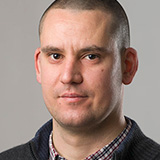 Andrés Guilló Seuthe
Profesor y Director de TFG
Professor
Graduado en Estudios Ingleses por la Universidad Autónoma de Madrid. Máster en Literatura y Cultura de los Países de Habla Inglesa (UAM). Es doctorando del programa de Estudios Artísticos, Literarios y de la Cultura en la misma universidad. Cuenta con amplia experiencia en la enseñanza de idiomas (inglés y alemán) y lleva varios años impartiendo clase a grupos de inglés de diferentes niveles en el Instituto de Lenguas Modernas de la Universidad Nebrija. Por su actividad investigadora como doctorando, ha participado en numerosos congresos, tanto a nivel nacional como internacional, sobre diferentes temas relacionados con la literatura inglesa. Es miembro del grupo de investigación Limen Group (UAM) y cofundador y coorganizador de un seminario de investigación enfocado a estudiantes de posgrado (PSLS).
aguillo@nebrija.es
Andrés Guilló Seuthe
Profesor y Director de TFG
Professor
Graduado en Estudios Ingleses por la Universidad Autónoma de Madrid. Máster en Literatura y Cultura de los Países de Habla Inglesa (UAM). Es doctorando del programa de Estudios Artísticos, Literarios y de la Cultura en la misma universidad. Cuenta con amplia experiencia en la enseñanza de idiomas (inglés y alemán) y lleva varios años impartiendo clase a grupos de inglés de diferentes niveles en el Instituto de Lenguas Modernas de la Universidad Nebrija. Por su actividad investigadora como doctorando, ha participado en numerosos congresos, tanto a nivel nacional como internacional, sobre diferentes temas relacionados con la literatura inglesa. Es miembro del grupo de investigación Limen Group (UAM) y cofundador y coorganizador de un seminario de investigación enfocado a estudiantes de posgrado (PSLS).
aguillo@nebrija.es
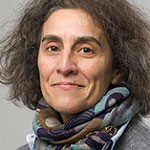 María José Gutiérrez Irún
Profesora y Directora TFG
Professor
Historiadora del Arte por la UNED. Tiene un Máster en Investigación en Historia del Arte y dos postgrados: uno, en Formación del Profesorado: Historia del Arte en Femenino. La Mujer Artista en la Historia: Una Propuesta para Educación en Igualdad de Género; y otro sobre Los Centros de Documentación y la Investigación Histórica: Archivos y Bibliotecas. Realizó estudios de Lengua inglesa y francesa en el Algolquin Collage de Ottawa (Canadá). Fue becada por el British Council y la Comunidad de Madrid para la realización del curso Técnicas Pedagógicas para Profesores de Inglés. Con más de 25 años dedicados a la docencia, ha alternado sus clases como profesora de inglés e italiano en organismos gubernamentales con la traducción y la interpretación para el Ministerio del Interior. También ha realizado traducciones para la Editorial Akal y la revista teatral de la Sala Pradillo de Madrid. En el campo de la investigación ha trabajado en el Legado Barbieri (Biblioteca Nacional) colaborando en la publicación Papeles Barbieri. Teatros de los Caños del Peral. Ha publicado, como firma invitada, en el blog de investigadores de la Biblioteca Nacional, el artículo titulado De Teatros y actores. También cuenta con una amplia experiencia en grupos teatrales como escritora, actriz y directora de escena.
mgutierrezi@nebrija.es
María José Gutiérrez Irún
Profesora y Directora TFG
Professor
Historiadora del Arte por la UNED. Tiene un Máster en Investigación en Historia del Arte y dos postgrados: uno, en Formación del Profesorado: Historia del Arte en Femenino. La Mujer Artista en la Historia: Una Propuesta para Educación en Igualdad de Género; y otro sobre Los Centros de Documentación y la Investigación Histórica: Archivos y Bibliotecas. Realizó estudios de Lengua inglesa y francesa en el Algolquin Collage de Ottawa (Canadá). Fue becada por el British Council y la Comunidad de Madrid para la realización del curso Técnicas Pedagógicas para Profesores de Inglés. Con más de 25 años dedicados a la docencia, ha alternado sus clases como profesora de inglés e italiano en organismos gubernamentales con la traducción y la interpretación para el Ministerio del Interior. También ha realizado traducciones para la Editorial Akal y la revista teatral de la Sala Pradillo de Madrid. En el campo de la investigación ha trabajado en el Legado Barbieri (Biblioteca Nacional) colaborando en la publicación Papeles Barbieri. Teatros de los Caños del Peral. Ha publicado, como firma invitada, en el blog de investigadores de la Biblioteca Nacional, el artículo titulado De Teatros y actores. También cuenta con una amplia experiencia en grupos teatrales como escritora, actriz y directora de escena.
mgutierrezi@nebrija.es
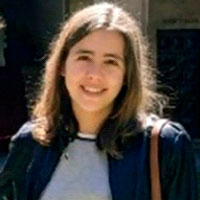 Marina Gutiérrez Moronta
Profesora y Directora TFG
Professor
Doctoranda en el Programa de Salud, Discapacidad, Dependencia y Bienestar en la Universidad de Salamanca (USAL). Forma parte del Grupo de Investigación del Instituto de Investigación Biomédica de Salamanca (IBSAL) en el área de Atención Primaria, Salud Pública y Farmacología, con un enfoque en personas con discapacidad y dependencia, bajo la dirección del Dr. José Antonio Mirón Canelo. Actualmente, desempeña el rol de Técnico en Salud y Personal de Soporte Científico-Técnico en la Fundación para la Investigación e Innovación Biosanitaria de Atención Primaria (FIIBAP), donde se encarga del mantenimiento del registro poblacional de enfermedades raras en la Comunidad de Madrid (SIERMA). Previamente, colaboró en el proyecto SpainUDP, orientado a la investigación de enfermedades raras no diagnosticadas. Cuenta con experiencia profesional como logopeda en clínicas y asociaciones, además de haber trabajado como técnico de investigación en diversos proyectos. Desde 2023, ejerce como docente en la Universidad Camilo José Cela (UCJC), impartiendo la asignatura Evaluación e Intervención en los Trastornos de la Lengua Escrita, tutorando Trabajos de Fin de Grado y Máster en la Facultad de Educación, y participando en tribunales académicos. Su formación incluye un Grado en Logopedia y otro en Magisterio de Primaria con especialización en Necesidades Educativas Especiales. Además, ha completado un Máster en Trastornos de la Comunicación: Neurociencia de la Audición y el Lenguaje, y un Máster en Atención Temprana. Su trayectoria profesional combina experiencia clínica, docente e investigadora en los campos de la salud y la educación.
mgutierm@nebrija.es
Marina Gutiérrez Moronta
Profesora y Directora TFG
Professor
Doctoranda en el Programa de Salud, Discapacidad, Dependencia y Bienestar en la Universidad de Salamanca (USAL). Forma parte del Grupo de Investigación del Instituto de Investigación Biomédica de Salamanca (IBSAL) en el área de Atención Primaria, Salud Pública y Farmacología, con un enfoque en personas con discapacidad y dependencia, bajo la dirección del Dr. José Antonio Mirón Canelo. Actualmente, desempeña el rol de Técnico en Salud y Personal de Soporte Científico-Técnico en la Fundación para la Investigación e Innovación Biosanitaria de Atención Primaria (FIIBAP), donde se encarga del mantenimiento del registro poblacional de enfermedades raras en la Comunidad de Madrid (SIERMA). Previamente, colaboró en el proyecto SpainUDP, orientado a la investigación de enfermedades raras no diagnosticadas. Cuenta con experiencia profesional como logopeda en clínicas y asociaciones, además de haber trabajado como técnico de investigación en diversos proyectos. Desde 2023, ejerce como docente en la Universidad Camilo José Cela (UCJC), impartiendo la asignatura Evaluación e Intervención en los Trastornos de la Lengua Escrita, tutorando Trabajos de Fin de Grado y Máster en la Facultad de Educación, y participando en tribunales académicos. Su formación incluye un Grado en Logopedia y otro en Magisterio de Primaria con especialización en Necesidades Educativas Especiales. Además, ha completado un Máster en Trastornos de la Comunicación: Neurociencia de la Audición y el Lenguaje, y un Máster en Atención Temprana. Su trayectoria profesional combina experiencia clínica, docente e investigadora en los campos de la salud y la educación.
mgutierm@nebrija.es
 Antonio Herrero Hernández
Director de TFG
Director de TFG
Doctor acreditado en Ciencias Geológicas. Inició la carrera docente como Profesor Asociado de varias Áreas de Conocimiento en la Rama de Ciencias en las Universidades de Alcalá de Henares y de León. Posteriormente ha sido Profesor Ayudante Doctor en la Universidad de León. En esta Universidad impartió docencia en el campo de Investigación de Ciencias Aplicadas en varias Licenciaturas, Diplomatura de Magisterio y varios Grados. Desde 2013 imparte docencia en asignaturas del campo de la Metodología de Investigación en Ciencias Sociales en los Grados de Educación Infantil y Primaria y en los Másteres de Formación de Profesorado de Enseñanza Secundaria y en el de Procesos Educativos de Enseñanza y Aprendizaje. Ha dirigido un conjunto numeroso de TFM/TFG. Es autor y coautor de un conjunto amplio de publicaciones en revistas nacionales e internacionales.
aherreroh@nebrija.es
Antonio Herrero Hernández
Director de TFG
Director de TFG
Doctor acreditado en Ciencias Geológicas. Inició la carrera docente como Profesor Asociado de varias Áreas de Conocimiento en la Rama de Ciencias en las Universidades de Alcalá de Henares y de León. Posteriormente ha sido Profesor Ayudante Doctor en la Universidad de León. En esta Universidad impartió docencia en el campo de Investigación de Ciencias Aplicadas en varias Licenciaturas, Diplomatura de Magisterio y varios Grados. Desde 2013 imparte docencia en asignaturas del campo de la Metodología de Investigación en Ciencias Sociales en los Grados de Educación Infantil y Primaria y en los Másteres de Formación de Profesorado de Enseñanza Secundaria y en el de Procesos Educativos de Enseñanza y Aprendizaje. Ha dirigido un conjunto numeroso de TFM/TFG. Es autor y coautor de un conjunto amplio de publicaciones en revistas nacionales e internacionales.
aherreroh@nebrija.es
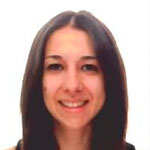 Patricia Hidalgo Cantero
Profesora y Directora TFG
Professor
Graduada en Educación Infantil en 2014 y Graduada en Educación Primaria en 2019. Experiencia laboral vinculada a la educación en aulas de primer y segundo ciclo de Educación Infantil. Tutora de Practicum en los Grados de Educación de la Universidad Nebrija, así como el Máster de Enseñanza del Español como Lengua extranjera en la Universidad Católica de Murcia. Participación en tribunales de evaluación de TFG como secretaria y vocal en ambas titulaciones. Actualmente, secretaria de la Revista de Investigación Magister (RDIM) y coordinadora pedagógica en Academia.
phidalgo@nebrija.es
Patricia Hidalgo Cantero
Profesora y Directora TFG
Professor
Graduada en Educación Infantil en 2014 y Graduada en Educación Primaria en 2019. Experiencia laboral vinculada a la educación en aulas de primer y segundo ciclo de Educación Infantil. Tutora de Practicum en los Grados de Educación de la Universidad Nebrija, así como el Máster de Enseñanza del Español como Lengua extranjera en la Universidad Católica de Murcia. Participación en tribunales de evaluación de TFG como secretaria y vocal en ambas titulaciones. Actualmente, secretaria de la Revista de Investigación Magister (RDIM) y coordinadora pedagógica en Academia.
phidalgo@nebrija.es
 PATRICIA IGLESIAS FERNÁNDEZ
Profesora y Directora TFG
Professor
Grado en Educación Primaria. Máster en Neurociencia y Educación. Docente en centros bilingües de Educación Primaria. Coordinadora de proyectos internacionales Erasmus+ y eTwinning, centrados en innovación metodológica, inclusión y comunicación intercultural. Profesora especializada en enseñanza bilingüe y metodologías activas y recursos didácticos para el aprendizaje de lenguas extranjeras. Autora y diseñadora de materiales educativos vinculados a metodologías activas, aprendizaje cooperativo y neurociencia aplicada a la educación.
piglesif@nebrija.es
PATRICIA IGLESIAS FERNÁNDEZ
Profesora y Directora TFG
Professor
Grado en Educación Primaria. Máster en Neurociencia y Educación. Docente en centros bilingües de Educación Primaria. Coordinadora de proyectos internacionales Erasmus+ y eTwinning, centrados en innovación metodológica, inclusión y comunicación intercultural. Profesora especializada en enseñanza bilingüe y metodologías activas y recursos didácticos para el aprendizaje de lenguas extranjeras. Autora y diseñadora de materiales educativos vinculados a metodologías activas, aprendizaje cooperativo y neurociencia aplicada a la educación.
piglesif@nebrija.es
 Mónica Jiménez Astudillo
Profesora y Directora TFG
Professor
Doctora en Ciencias de la Educación. Licenciada en Pedagogía; Máster en Educación Especial y Máster Universitario en Formación del Profesorado en la especialidad de orientación educativa. Cuenta con el postgrado experto en formación y Atención Temprana en contextos diversos y vulnerables por la Universidad Nacional de Educación a Distancia. Ha trabajado como jefe de estudios en colegio privado y cuenta con experiencia en el ámbito de la Atención Temprana realizando funciones de detección, evaluación e intervención en niños con trastornos en el neurodesarrollo y riesgo de padecerlos y el asesoramiento a sus familias. Sus líneas de investigación y publicaciones se focalizan en la Psicología del desarrollo las alteraciones y trastornos del neurodesarrollo el alto riesgo biopsicosocial y la atención a la primera infancia y sus familias. Miembro de la Comisión de Infancia y Adolescencia de la Comunidad de Madrid. Miembro de la Junta Directiva de APREM. Actualmente es la directora del Máster Universitario en Problemas de Conducta en Centros Educativos y del Máster Universitario en Atención a la Diversidad y Necesidades Educativas Especiales de la Universidad Nebrija.
Mónica Jiménez Astudillo
Profesora y Directora TFG
Professor
Doctora en Ciencias de la Educación. Licenciada en Pedagogía; Máster en Educación Especial y Máster Universitario en Formación del Profesorado en la especialidad de orientación educativa. Cuenta con el postgrado experto en formación y Atención Temprana en contextos diversos y vulnerables por la Universidad Nacional de Educación a Distancia. Ha trabajado como jefe de estudios en colegio privado y cuenta con experiencia en el ámbito de la Atención Temprana realizando funciones de detección, evaluación e intervención en niños con trastornos en el neurodesarrollo y riesgo de padecerlos y el asesoramiento a sus familias. Sus líneas de investigación y publicaciones se focalizan en la Psicología del desarrollo las alteraciones y trastornos del neurodesarrollo el alto riesgo biopsicosocial y la atención a la primera infancia y sus familias. Miembro de la Comisión de Infancia y Adolescencia de la Comunidad de Madrid. Miembro de la Junta Directiva de APREM. Actualmente es la directora del Máster Universitario en Problemas de Conducta en Centros Educativos y del Máster Universitario en Atención a la Diversidad y Necesidades Educativas Especiales de la Universidad Nebrija.
mjimenezas@nebrija.es
 María Beatriz Juárez Escribano
Profesora y Directora de TFG
Professor
Ayudante doctor en la Universidad Nebrija y Doctora Cum Laude en el programa de Educación y Creatividad: Aplicaciones Tecnológicas, Sociales y Psicopedagógicas. Galardonada con el Premio Docentia 2020 a la excelencia docente y miembro del equipo de investigación Cognición, Educación y Diferencias Individuales (CEDI) de Nebrija. Con una formación diversa que incluye una doble licenciatura en Comunicación Audiovisual y Ciencias Ambientales, así como dos másteres, se ha desarrollado una trayectoria en diversos campos, acumulando 8 años de experiencia en producción de informativos y otros 8 años como docente en instituciones como EAE Madrid. Se ha especializado en educación en entornos virtuales, con formación avanzada en aprendizaje digital y e-learning. Ha participado en congresos nacionales e internacionales, y se han publicado artículos sobre gamificación, identidad virtual y comportamiento en redes sociales. Ha impartido docencia en la Universidad de Zadar, Croacia, a través de una beca Erasmus+. Actualmente, ejerce como PDI y coordinador de alumnos del Máster en TIC para la educación y aprendizaje digital en la Universidad Nebrija.
María Beatriz Juárez Escribano
Profesora y Directora de TFG
Professor
Ayudante doctor en la Universidad Nebrija y Doctora Cum Laude en el programa de Educación y Creatividad: Aplicaciones Tecnológicas, Sociales y Psicopedagógicas. Galardonada con el Premio Docentia 2020 a la excelencia docente y miembro del equipo de investigación Cognición, Educación y Diferencias Individuales (CEDI) de Nebrija. Con una formación diversa que incluye una doble licenciatura en Comunicación Audiovisual y Ciencias Ambientales, así como dos másteres, se ha desarrollado una trayectoria en diversos campos, acumulando 8 años de experiencia en producción de informativos y otros 8 años como docente en instituciones como EAE Madrid. Se ha especializado en educación en entornos virtuales, con formación avanzada en aprendizaje digital y e-learning. Ha participado en congresos nacionales e internacionales, y se han publicado artículos sobre gamificación, identidad virtual y comportamiento en redes sociales. Ha impartido docencia en la Universidad de Zadar, Croacia, a través de una beca Erasmus+. Actualmente, ejerce como PDI y coordinador de alumnos del Máster en TIC para la educación y aprendizaje digital en la Universidad Nebrija.
mjuareze@nebrija.es
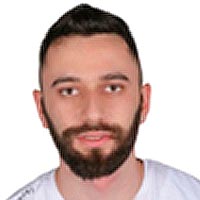 Andreas Kyriakou
Profesor y Director de TFG
Professor
Doctor en Lingüística Aplicada a la Enseñanza de Lenguas por la Universidad Nebrija. Licenciado en Ciencias de la Educación, con especialización en Educación Primaria, por la Universidad de Chipre. Cursó el Máster en Didáctica del Español como Lengua Extranjera en la Universidad Nebrija. Ha formado parte del proyecto de investigación Cartografía de la certificación del español como lengua extranjera, liderado por el Instituto Cervantes y el Observatorio Nebrija del español. Su investigación ha sido publicada en revistas internacionales de alto impacto, como International Journal of Bilingual Education and Bilingualism y Cognition and Emotion. Entre sus principales intereses de investigación se encuentran la expresión emocional en L2, el moral foreign language effect, la identidad moral en L2, y los enfoques metodológicos para la enseñanza del léxico en ELE. Actualmente, es docente en la Facultad de Lenguas y Educación de la Universidad Nebrija.
Andreas Kyriakou
Profesor y Director de TFG
Professor
Doctor en Lingüística Aplicada a la Enseñanza de Lenguas por la Universidad Nebrija. Licenciado en Ciencias de la Educación, con especialización en Educación Primaria, por la Universidad de Chipre. Cursó el Máster en Didáctica del Español como Lengua Extranjera en la Universidad Nebrija. Ha formado parte del proyecto de investigación Cartografía de la certificación del español como lengua extranjera, liderado por el Instituto Cervantes y el Observatorio Nebrija del español. Su investigación ha sido publicada en revistas internacionales de alto impacto, como International Journal of Bilingual Education and Bilingualism y Cognition and Emotion. Entre sus principales intereses de investigación se encuentran la expresión emocional en L2, el moral foreign language effect, la identidad moral en L2, y los enfoques metodológicos para la enseñanza del léxico en ELE. Actualmente, es docente en la Facultad de Lenguas y Educación de la Universidad Nebrija.
akyriako@nebrija.es
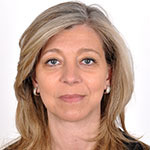 Ana Rosa Lagares Gaitán
Profesora y Directora TFG
Professor
Doctora en Educación por la Universidad Autónoma de Madrid. Máster en Dirección y Gestión para la Calidad de Centros Educativos por la Universidad Francisco de Vitoria. Licenciatura en Ciencias de la Educación por la Universidad Complutense de Madrid.
Docente de distintas titulaciones de grado, máster sobre currículo, investigación educativa, atención a las diferencias individuales, aprendizaje y desarrollo.
Autora de distintas publicaciones sobre competencias, legislación educativa, evaluación, elementos transversales.
Miembro del grupo de investigación Neevolución y personal investigador de la Universidad de Atlántico Medio.
Ana Rosa Lagares Gaitán
Profesora y Directora TFG
Professor
Doctora en Educación por la Universidad Autónoma de Madrid. Máster en Dirección y Gestión para la Calidad de Centros Educativos por la Universidad Francisco de Vitoria. Licenciatura en Ciencias de la Educación por la Universidad Complutense de Madrid.
Docente de distintas titulaciones de grado, máster sobre currículo, investigación educativa, atención a las diferencias individuales, aprendizaje y desarrollo.
Autora de distintas publicaciones sobre competencias, legislación educativa, evaluación, elementos transversales.
Miembro del grupo de investigación Neevolución y personal investigador de la Universidad de Atlántico Medio.
alagares@nebrija.es
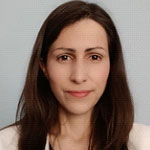 Victoria Eugenia Lamas Álvarez
Profesora y Directora TFG
Professor
Doctora en Filosofía por las Universidades de Valladolid y Salamanca. Máster en Patrimonio Histórico: investigación y gestión por la UCLM; Licenciada en Historia del Arte (UVa). Acreditada por ANECA como Profesora Contratada Doctora.
Coordinadora de Prácticas y TFM del Máster en Metodologías Docentes. Profesora de grado y posgrado de la Facultad de Lenguas y Educación.
Autora de distintas publicaciones y presentaciones en congresos relacionadas con innovación docente, nuevas metodologías para el ecosistema digital educativo y didáctica del patrimonio cultural.
Victoria Eugenia Lamas Álvarez
Profesora y Directora TFG
Professor
Doctora en Filosofía por las Universidades de Valladolid y Salamanca. Máster en Patrimonio Histórico: investigación y gestión por la UCLM; Licenciada en Historia del Arte (UVa). Acreditada por ANECA como Profesora Contratada Doctora.
Coordinadora de Prácticas y TFM del Máster en Metodologías Docentes. Profesora de grado y posgrado de la Facultad de Lenguas y Educación.
Autora de distintas publicaciones y presentaciones en congresos relacionadas con innovación docente, nuevas metodologías para el ecosistema digital educativo y didáctica del patrimonio cultural.
vlamas@nebrija.es
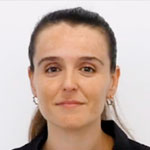 Lidia Lasso Belando
Profesora y Directora TFG
Professor and TFG Director
Licenciada en Psicología y graduada en ciencias de la actividad física y el deporte, Máster en entrenamiento deportivo, Máster universitario en formación del profesorado y Técnico profesional TIC en instalación, configuración, gestión y mantenimiento de aulas virtuales Moodle (on line). Profesora asociada en la University of Wales en las asignaturas de especialización (fitness) y alto rendimiento deportivo. Docente en diferentes cursos de formación ámbito CCAFD. Autora de diferentes manuales relacionados con el ámbito CCAFD. Docente en las titulaciones de formación profesional Técnico Superior en Animación de Actividades Físicas y Deportivas, Técnico Superior en Acondicionamiento Físico, Técnico Superior Integración Social y Técnico Superior en Dietética (modalidad presencial y a distancia). Jefa de estudios en CDP Medac.
Lidia Lasso Belando
Profesora y Directora TFG
Professor and TFG Director
Licenciada en Psicología y graduada en ciencias de la actividad física y el deporte, Máster en entrenamiento deportivo, Máster universitario en formación del profesorado y Técnico profesional TIC en instalación, configuración, gestión y mantenimiento de aulas virtuales Moodle (on line). Profesora asociada en la University of Wales en las asignaturas de especialización (fitness) y alto rendimiento deportivo. Docente en diferentes cursos de formación ámbito CCAFD. Autora de diferentes manuales relacionados con el ámbito CCAFD. Docente en las titulaciones de formación profesional Técnico Superior en Animación de Actividades Físicas y Deportivas, Técnico Superior en Acondicionamiento Físico, Técnico Superior Integración Social y Técnico Superior en Dietética (modalidad presencial y a distancia). Jefa de estudios en CDP Medac.
llasso@nebrija.es
 Óscar León Díaz
Profesor y Director TFG
Professor
Doctor en Ciencias de la Actividad Física y el Deporte en la Universidad Autónoma de Madrid. Máster en Formación del Profesorado de Educación Secundaria y Bachillerato y Licenciado en Ciencias de la Actividad Física y el Deporte por la Universidad Politécnica de Madrid. Autor de diversas publicaciones en revistas científicas y en Congresos Nacionales e Internacionales vinculadas con el aprendizaje y enseñanza de la Educación Física a través de metodologías activas. Actualmente, es profesor y responsable de docencia de las materias vinculadas con la EF en la Facultad de Lenguas y Educación de la Universidad de Nebrija y es miembro del equipo de investigadores de la Red de investigación en Aprendizaje y Servicio en Actividad Física y Deporte para la Inclusión Social (RIADIS).
Óscar León Díaz
Profesor y Director TFG
Professor
Doctor en Ciencias de la Actividad Física y el Deporte en la Universidad Autónoma de Madrid. Máster en Formación del Profesorado de Educación Secundaria y Bachillerato y Licenciado en Ciencias de la Actividad Física y el Deporte por la Universidad Politécnica de Madrid. Autor de diversas publicaciones en revistas científicas y en Congresos Nacionales e Internacionales vinculadas con el aprendizaje y enseñanza de la Educación Física a través de metodologías activas. Actualmente, es profesor y responsable de docencia de las materias vinculadas con la EF en la Facultad de Lenguas y Educación de la Universidad de Nebrija y es miembro del equipo de investigadores de la Red de investigación en Aprendizaje y Servicio en Actividad Física y Deporte para la Inclusión Social (RIADIS).
oleon@nebrija.es
 Sara María Lladó Sánchez
Profesora y Directora de TFG
Professor
Máster en Liderazgo y Dirección de Centros Educativos (UNIR). Experto en Docencia universitaria Online (UNIR). Diplomada en Docentedo de Educación General Básica. Especialidad Preescolar (Universidad Villanueva) Graduada en Educación Primaria (Universidad Internacional Isabel I de Castilla). Docente universitaria en los Grados de Educación Infantil y Educación Primaria. (UNIR).
Sara María Lladó Sánchez
Profesora y Directora de TFG
Professor
Máster en Liderazgo y Dirección de Centros Educativos (UNIR). Experto en Docencia universitaria Online (UNIR). Diplomada en Docentedo de Educación General Básica. Especialidad Preescolar (Universidad Villanueva) Graduada en Educación Primaria (Universidad Internacional Isabel I de Castilla). Docente universitaria en los Grados de Educación Infantil y Educación Primaria. (UNIR).
Directora de TFG en el Grado de Maestro en Educación Primaria y de TFM en el Máster de Liderazgo Y Dirección de Centros Educativos (VIU) Treinta años de experiencia en docencia en Educación Infantil y Primaria en centro educativo. Coordinadora de proyectos globales de centro (Coordinadora de Calidad Modelo EFQM, Coordinadora de Nuevas Tecnologías, Coordinadora Innovación Pedagógica y Coordinadora docente de etapa de Primaria).
sllado@nebrija.es
 María de Hontanares López Agueda
Profesora y Directora TFG
Professor and TFG Director
María López de Hontanares es Master en Neuropsicología y Educación por la Universidad Internacional de la Rioja. Licenciada en Psicopedagogía. Universidad Camilo José Cela. Diplomada en Educación Infantil. Universidad Complutense de Madrid. mlopezag@nebrija.es
María de Hontanares López Agueda
Profesora y Directora TFG
Professor and TFG Director
María López de Hontanares es Master en Neuropsicología y Educación por la Universidad Internacional de la Rioja. Licenciada en Psicopedagogía. Universidad Camilo José Cela. Diplomada en Educación Infantil. Universidad Complutense de Madrid. mlopezag@nebrija.es
 Ana López García
Profesora y Directora de TFG
Professor
Graduada en Logopedia por la UVA (Universidad de Valladolid). Máster en Daño neurológico por Instituto Superior de Estudios Psicológicos. Posgrado en el Trastorno del Espectro Autista en ISEP. Formación recibida en diferentes cursos como: Lengua de Signos, Disfagia Infantil, Comunicación Activa en Afasia, PECS (sistema alternativo y aumentativo en TEA), Abordaje logopédico en prematuridad y neonatología, Terapia Miofuncional y Dificultades del aprendizaje. Investigaciones sobre la Esclerosis Múltiple y la Musicoterapia como forma de tratamiento en el Trastorno Específico del Lenguaje en niños con publicaciones en revistas.
alopezga@nebrija.es
Ana López García
Profesora y Directora de TFG
Professor
Graduada en Logopedia por la UVA (Universidad de Valladolid). Máster en Daño neurológico por Instituto Superior de Estudios Psicológicos. Posgrado en el Trastorno del Espectro Autista en ISEP. Formación recibida en diferentes cursos como: Lengua de Signos, Disfagia Infantil, Comunicación Activa en Afasia, PECS (sistema alternativo y aumentativo en TEA), Abordaje logopédico en prematuridad y neonatología, Terapia Miofuncional y Dificultades del aprendizaje. Investigaciones sobre la Esclerosis Múltiple y la Musicoterapia como forma de tratamiento en el Trastorno Específico del Lenguaje en niños con publicaciones en revistas.
alopezga@nebrija.es
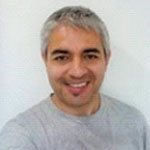 Vicente Luque Centeno
Director de TFG
Professor
Doctor acreditado Ingeniero en Telecomunicación (UC3M) e Ingeniero Informático (UPM). Ha trabajado como investigador y como profesor de Universidad, impartiendo varias asignaturas en el ámbito de las TIC y tutorizando más de 30 proyectos de fin de carrera, trabajos de fin de grado y trabajos de fin de máster. Su ámbito de investigación está centrado en la ingeniería web, incluyendo aspectos de automatización de tareas, accesibilidad y la aplicación de las TIC al sector de la Educación.
vluque@nebrija.es
Vicente Luque Centeno
Director de TFG
Professor
Doctor acreditado Ingeniero en Telecomunicación (UC3M) e Ingeniero Informático (UPM). Ha trabajado como investigador y como profesor de Universidad, impartiendo varias asignaturas en el ámbito de las TIC y tutorizando más de 30 proyectos de fin de carrera, trabajos de fin de grado y trabajos de fin de máster. Su ámbito de investigación está centrado en la ingeniería web, incluyendo aspectos de automatización de tareas, accesibilidad y la aplicación de las TIC al sector de la Educación.
vluque@nebrija.es
 Carlos Alberto Marchena Giráldez
Profesor y Director de TFG
Professor
Doctor en Psicología clínica y de la Salud, Licenciado en Psicología y Máster en Psicología de la Salud por la Universidad Autónoma de Madrid. Profesionalmente, ha ejercido la docencia en diferentes universidades: Universidad Autónoma de Madrid y Universidad Francisco de Vitoria relacionada en el campo de técnicas de intervención psicológica y de investigación en psicología. Cuenta con una dilatada experiencia profesional en centros de intervención psicológica con población infantil, adolescente y adulta.
cmarchena@nebrija.es
Carlos Alberto Marchena Giráldez
Profesor y Director de TFG
Professor
Doctor en Psicología clínica y de la Salud, Licenciado en Psicología y Máster en Psicología de la Salud por la Universidad Autónoma de Madrid. Profesionalmente, ha ejercido la docencia en diferentes universidades: Universidad Autónoma de Madrid y Universidad Francisco de Vitoria relacionada en el campo de técnicas de intervención psicológica y de investigación en psicología. Cuenta con una dilatada experiencia profesional en centros de intervención psicológica con población infantil, adolescente y adulta.
cmarchena@nebrija.es
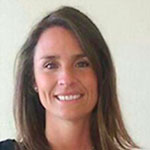 Ana Marín De la Plaza
Profesora y Directora TFG
Professor and TFG Director
Licenciada en Psicología. Certificado de aptitud pedagógica (CAP). Experta en Terapia de Conducta Infanto-Juvenil. Lleva desarrollando su actividad profesional tanto en el ámbito infanto-juvenil como de adultos durante más de diez años.
Ana Marín De la Plaza
Profesora y Directora TFG
Professor and TFG Director
Licenciada en Psicología. Certificado de aptitud pedagógica (CAP). Experta en Terapia de Conducta Infanto-Juvenil. Lleva desarrollando su actividad profesional tanto en el ámbito infanto-juvenil como de adultos durante más de diez años.Ha sido investigadora en el Servicio de Enfermedades Infecciosas del Hospital Ramón y Cajal de Madrid con pacientes VIH/SIDA, tratando temas de tanto impacto psicosocial como efectos secundarios de fármacos en enfermedad crónica, estigmatización del paciente VIH, psicopatología asociada a enfermedad crónica y adherencia a tratamientos antirretrovirales. Actualmente compagina su trabajo como psicóloga en el Hospital Ramón y Cajal, con la docencia universitaria.
Su actividad docente se ha centrado en el diseño e impartición de talleres, charlas y cursos para la prevención de los trastornos del comportamiento alimentario tanto en centros educativos de la Comunidad de Madrid como en Atención Primaria. Así mismo ha participado en diversos congresos como ponente y ha publicado artículos sobre psicología y VIH/SIDA, prevención de Trastornos de Alimentación y educación infantil.
amarinp@nebrija.es
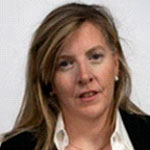 Ester Mariñoso, Mª Pilar
Profesora y Directora de TFG
Professor
Doctora en Psicología. Especialista en Psicología evolutiva y en el desarrollo del pensamiento matemático en la primera infancia. Investigadora en la línea de didáctica de las matemáticas en pensamiento numérico y resolución de problemas. Autora de distintas publicaciones y presentaciones a congresos relacionados con la enseñanza de las matemáticas en Educación Infantil y Primaria, así como procesos cognitivos implicados en el aprendizaje de las mismas. Actualmente colaboradora de la Universidad de Arizona.
Ester Mariñoso, Mª Pilar
Profesora y Directora de TFG
Professor
Doctora en Psicología. Especialista en Psicología evolutiva y en el desarrollo del pensamiento matemático en la primera infancia. Investigadora en la línea de didáctica de las matemáticas en pensamiento numérico y resolución de problemas. Autora de distintas publicaciones y presentaciones a congresos relacionados con la enseñanza de las matemáticas en Educación Infantil y Primaria, así como procesos cognitivos implicados en el aprendizaje de las mismas. Actualmente colaboradora de la Universidad de Arizona.
mester@nebrija.es
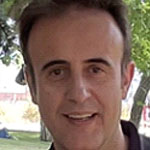 José Francisco Martín Alonso
Profesor y Director TFG
Professor
Doctor en Educación por la Universidad Pontificia de Comillas. Licenciado en Psicopedagogía y en Psicología, también ha cursado estudios de Filosofía y Teología. Ha trabajado como profesor en los grados de Educación infantil y Primaria en la Universidad Pontifica Comillas. Igualmente trabaja como Orientador Psicopedagógico en primaria y Bachillerato y como Coordinador de Bienestar y protección del menor. Profesor en el Grado de Educación Primaria en la Universidad Nebrija.
Investigador colaborador en el Grupo de Investigación EDUCOMPET (Grupo de Investigación sobre las competencias clave en el contexto escolar) de la Universidad Pontificia Comillas. Autor de distintas publicaciones y presentaciones en congresos relacionadas con la Competencia Personal, Social y de Aprender a Aprender. Otras líneas de investigación: Competencias docentes, Convivencia escolar.
José Francisco Martín Alonso
Profesor y Director TFG
Professor
Doctor en Educación por la Universidad Pontificia de Comillas. Licenciado en Psicopedagogía y en Psicología, también ha cursado estudios de Filosofía y Teología. Ha trabajado como profesor en los grados de Educación infantil y Primaria en la Universidad Pontifica Comillas. Igualmente trabaja como Orientador Psicopedagógico en primaria y Bachillerato y como Coordinador de Bienestar y protección del menor. Profesor en el Grado de Educación Primaria en la Universidad Nebrija.
Investigador colaborador en el Grupo de Investigación EDUCOMPET (Grupo de Investigación sobre las competencias clave en el contexto escolar) de la Universidad Pontificia Comillas. Autor de distintas publicaciones y presentaciones en congresos relacionadas con la Competencia Personal, Social y de Aprender a Aprender. Otras líneas de investigación: Competencias docentes, Convivencia escolar.
jmartial@nebrija.es
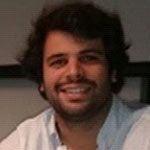 Alberto Martín Barrero
Profesor y Director TFG
Professor
Doctor en Ciencias de la Actividad Física y el Deporte por la Universidad de Huelva. Licenciado en Ciencias de la Actividad Física y el Deporte por la Universidad Pablo de Olavide. Máster en Master Universitario en Profesorado de Enseñanza Secundaria Obligatoria y Bachillerato, Formación Profesional y Enseñanza de Idiomas. Su línea de investigación se centra en los procesos de aprendizaje y enseñanza de la educación física y los deportes. Miembro del Grupo de Investigación HUM-954: Actividad física, promoción de valores y educación de la Universidad de Huelva. Autor de distintos artículos de investigación, libros, capítulos de libros y comunicaciones en congresos internacionales. Actualmente, docente en el Grado en Educación Primaria, en la Mención de Educación Física.
Alberto Martín Barrero
Profesor y Director TFG
Professor
Doctor en Ciencias de la Actividad Física y el Deporte por la Universidad de Huelva. Licenciado en Ciencias de la Actividad Física y el Deporte por la Universidad Pablo de Olavide. Máster en Master Universitario en Profesorado de Enseñanza Secundaria Obligatoria y Bachillerato, Formación Profesional y Enseñanza de Idiomas. Su línea de investigación se centra en los procesos de aprendizaje y enseñanza de la educación física y los deportes. Miembro del Grupo de Investigación HUM-954: Actividad física, promoción de valores y educación de la Universidad de Huelva. Autor de distintos artículos de investigación, libros, capítulos de libros y comunicaciones en congresos internacionales. Actualmente, docente en el Grado en Educación Primaria, en la Mención de Educación Física.
amartinba@nebrija.es
 Jorge Martín de Arriba
Profesor y Director de TFG
Professor and TFG Director
Diplomado en Magisterio Especialidad Educación Primaria, Licenciado en Psicopedagogía y Máster oficial TIC en la educación, por la Universidad de Salamanca.
Jorge Martín de Arriba
Profesor y Director de TFG
Professor and TFG Director
Diplomado en Magisterio Especialidad Educación Primaria, Licenciado en Psicopedagogía y Máster oficial TIC en la educación, por la Universidad de Salamanca.De su experiencia, destacan sus conocimientos en torno a la aplicación de las TIC en la educación, su formación sobre este campo, la docencia en distintas carreras universitarias, universidades y cursos on-line, así como en otros niveles, y su experiencia en la creación y virtualización de contenidos educativos.
Ha desarrollado su carrera profesional e investigadora principalmente en la Universidad de Salamanca, impartiendo docencia en los Grados de Educación Infantil y Primaria, Máster en Formación del Profesorado de Educación Secundaria, participando en diferentes investigaciones de ámbito nacional y publicando en varias revistas artículos científicos y capítulos de libros, todo ellos en el campo de las TIC en Educación.
Ha trabajado también en la Universidad Isabel I, y en otros centros educativos como escuelas de negocios y centros de formación de empleados y desempleados, donde ha podido crear materiales educativos digitales.
jmartinar@nebrija.es
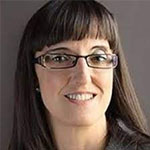 Susana Martín Leralta
Directora TFG
Director TFG
Doctora acreditada por la Universidad de Bielefeld (Alemania) y Licenciada en Ciencias de la Información por la Universidad Complutense de Madrid. Su tesis doctoral obtuvo el Premio de Investigación ASELE 2008. Ha coordinado el Master en Lingüística aplicada a la enseñanza de español como lengua extranjera en la Universidad Nebrija durante siete años, es profesora de postgrado de esta Universidad y colaboradora habitual de otras instituciones. Sus líneas de investigación son la competencia estratégica, la comprensión auditiva y la evaluación. Ha publicado el libro Competencia estratégica para la comprensión auditiva en español como lengua extranjera (2009), el material didáctico Todo oídos (2011) y su Guía didáctica (2012), y diversos artículos.
Susana Martín Leralta
Directora TFG
Director TFG
Doctora acreditada por la Universidad de Bielefeld (Alemania) y Licenciada en Ciencias de la Información por la Universidad Complutense de Madrid. Su tesis doctoral obtuvo el Premio de Investigación ASELE 2008. Ha coordinado el Master en Lingüística aplicada a la enseñanza de español como lengua extranjera en la Universidad Nebrija durante siete años, es profesora de postgrado de esta Universidad y colaboradora habitual de otras instituciones. Sus líneas de investigación son la competencia estratégica, la comprensión auditiva y la evaluación. Ha publicado el libro Competencia estratégica para la comprensión auditiva en español como lengua extranjera (2009), el material didáctico Todo oídos (2011) y su Guía didáctica (2012), y diversos artículos.
smartinl@nebrija.es
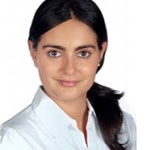 Isabel Martín Ruiz
Profesora y Directora TFG
Professor and TFG Director
Licenciada en Filología Hispánica y Doctora en la misma materia en la especialidad de Teoría de la Literatura y Literatura Comparada. Sus trabajos de investigación se han centrado principalmente en la Posmodernidad, el Español para Extranjeros y la Didáctica de la Lengua y la Literatura. Ha sido durante muchos años docente de Español para Extranjeros y Lengua y Literatura. Ha trabajado en dos universidades: Camilo José Cela y MIUC. También ha trabajado en otros centros,con diferentes niveles y todo tipo de alumnos. Estuvo dos años practicando Home schooling en un barco dando la vuelta al mundo. También ha trabajado como programadora en festivales de cine español y ha comisariado varias muestras artísticas y cinematográficas. Actualmente colabora con el festival Márgenes en su seminario sobre imagen contemporánea.
Isabel Martín Ruiz
Profesora y Directora TFG
Professor and TFG Director
Licenciada en Filología Hispánica y Doctora en la misma materia en la especialidad de Teoría de la Literatura y Literatura Comparada. Sus trabajos de investigación se han centrado principalmente en la Posmodernidad, el Español para Extranjeros y la Didáctica de la Lengua y la Literatura. Ha sido durante muchos años docente de Español para Extranjeros y Lengua y Literatura. Ha trabajado en dos universidades: Camilo José Cela y MIUC. También ha trabajado en otros centros,con diferentes niveles y todo tipo de alumnos. Estuvo dos años practicando Home schooling en un barco dando la vuelta al mundo. También ha trabajado como programadora en festivales de cine español y ha comisariado varias muestras artísticas y cinematográficas. Actualmente colabora con el festival Márgenes en su seminario sobre imagen contemporánea.
imartin@nebrija.es
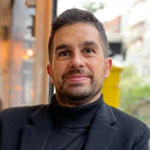 Isaac Martínez Pons
Profesor y Director TFG
Professor
Graduado en Educación Primaria con Mención en Educación Inclusiva por la UAM. Posee también un Máster Universitario en Educación y TIC por la UOC.
Actualmente ejerce su carrera profesional dentro de la Fundación PRODIS, como coordinador del Programa Empresa: Máster adaptado para personas con Discapacidad Intelectual y como profesor de Conectados (primer curso online dirigido a personas con D.I para la adquisición de competencias digitales), de Mundo Digital (formación permanente para personas con Discapacidad Intelectual) y como profesor del programa preuniversitario AVANZAS. Participación en equipo interdisciplinario europeo en proyectos Moonclimbers y B4 Project. Por último, colabora como profesor adjunto de la asignatura de Las Necesidades Educativas en el Aula, Atención Temprana del grado de educación infantil y en la asignatura de TIC en educación en el grado de educación primaria en la Universidad Antonio de Nebrija.
Isaac Martínez Pons
Profesor y Director TFG
Professor
Graduado en Educación Primaria con Mención en Educación Inclusiva por la UAM. Posee también un Máster Universitario en Educación y TIC por la UOC.
Actualmente ejerce su carrera profesional dentro de la Fundación PRODIS, como coordinador del Programa Empresa: Máster adaptado para personas con Discapacidad Intelectual y como profesor de Conectados (primer curso online dirigido a personas con D.I para la adquisición de competencias digitales), de Mundo Digital (formación permanente para personas con Discapacidad Intelectual) y como profesor del programa preuniversitario AVANZAS. Participación en equipo interdisciplinario europeo en proyectos Moonclimbers y B4 Project. Por último, colabora como profesor adjunto de la asignatura de Las Necesidades Educativas en el Aula, Atención Temprana del grado de educación infantil y en la asignatura de TIC en educación en el grado de educación primaria en la Universidad Antonio de Nebrija.
imartinezp@nebrija.es
 Estibaliz Martínez Mora
Profesora y Directora TFG
Professor and TFG Director
Licenciada en Pedagogía por la Universidad Complutense de Madrid, inicia su mundo laboral en un Colegio Concertado, sus funciones eran apoyo Pedagógico a niños con TEA, impartir Curso de Habilidades Sociales y orientación laboral.
Además ha completado su formación con cursos de logopedia, de inteligencia emocional, un curso sobre comunicación eficaz y titulada en pericia caligráfica y documentoscopia por IpsigraP.
Estibaliz Martínez Mora
Profesora y Directora TFG
Professor and TFG Director
Licenciada en Pedagogía por la Universidad Complutense de Madrid, inicia su mundo laboral en un Colegio Concertado, sus funciones eran apoyo Pedagógico a niños con TEA, impartir Curso de Habilidades Sociales y orientación laboral.
Además ha completado su formación con cursos de logopedia, de inteligencia emocional, un curso sobre comunicación eficaz y titulada en pericia caligráfica y documentoscopia por IpsigraP.Desde el 2014 hasta hoy, es preparadora de oposiciones en Magister, impartiendo clases presenciales y por videoconferencia de Programación de las tres etapas educativas, de Temas y Prácticos de Primaria y sobre legislación y colaboro elaborando materiales educativos y legislativos. emartinezmo@nebrija.es
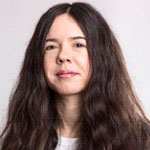 Eirini Mavrou
Directora de TFG
Professor
Miembro del Grupo de Investigación de Lingüística Aplicada a la Enseñanza de Lenguas Extranjeras y del Centro de Ciencia Cognitiva (C3) ha publicado una investigación en Journal of Second Language Writing (JCR: Q1 en Linguistics, CIRC: A+ en Ciencias Sociales). El artículo titulado Working memory, executive functions, and emotional intelligence in second language writing se enmarca en el Proyecto “Emoción, memoria, identidad lingüística y aculturación emocional: Su influencia en el aprendizaje de español como lengua de migración (EMILIA)” (Ref. FFI2017-83166-C2-2-R, Convocatoria 2017 Proyectos de I+D+i, del Programa Estatal de Investigación, Desarrollo e Innovación Orientada a los Retos de la Sociedad).
emavrou@nebrija.es
Eirini Mavrou
Directora de TFG
Professor
Miembro del Grupo de Investigación de Lingüística Aplicada a la Enseñanza de Lenguas Extranjeras y del Centro de Ciencia Cognitiva (C3) ha publicado una investigación en Journal of Second Language Writing (JCR: Q1 en Linguistics, CIRC: A+ en Ciencias Sociales). El artículo titulado Working memory, executive functions, and emotional intelligence in second language writing se enmarca en el Proyecto “Emoción, memoria, identidad lingüística y aculturación emocional: Su influencia en el aprendizaje de español como lengua de migración (EMILIA)” (Ref. FFI2017-83166-C2-2-R, Convocatoria 2017 Proyectos de I+D+i, del Programa Estatal de Investigación, Desarrollo e Innovación Orientada a los Retos de la Sociedad).
emavrou@nebrija.es
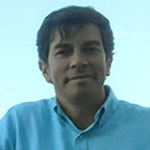 David Méndez Coca
Profesor y Director de TFG
Professor
Doctor en ciencias de la educación por la UCM. Licenciado en Ingeniería electrónica (UCM). Profesor del Departamento de Educación, Facultad de Lenguas y Educación. Profesor en didáctica de ciencias experimentales y matemáticas. Acreditado por ANECA como profesor titular. Un sexenio de investigación reconocido. Premio extraordinario de doctorado. Estancia en Harvard, MIT y UCLA. Autor de más de veinte artículos en revistas internacionales, diez artículos en revistas indexadas en el Journal Citation Reports. Ha realizado más de veinte comunicaciones en congresos internacionales. Investigador Principal en varios proyectos de investigación en educación de ciencias y matemáticas.
David Méndez Coca
Profesor y Director de TFG
Professor
Doctor en ciencias de la educación por la UCM. Licenciado en Ingeniería electrónica (UCM). Profesor del Departamento de Educación, Facultad de Lenguas y Educación. Profesor en didáctica de ciencias experimentales y matemáticas. Acreditado por ANECA como profesor titular. Un sexenio de investigación reconocido. Premio extraordinario de doctorado. Estancia en Harvard, MIT y UCLA. Autor de más de veinte artículos en revistas internacionales, diez artículos en revistas indexadas en el Journal Citation Reports. Ha realizado más de veinte comunicaciones en congresos internacionales. Investigador Principal en varios proyectos de investigación en educación de ciencias y matemáticas.
dmendez@nebrija.es
 Mónica Méndez de la Calle
Profesora y Directora TFG
Professor and TFG Director
Doctora en Pedagogía por la Universidad Complutense de Madrid.
Mónica Méndez de la Calle
Profesora y Directora TFG
Professor and TFG Director
Doctora en Pedagogía por la Universidad Complutense de Madrid.Profesora en Universidad Nebrija en el Grado en Educación Infantil y en el Máster de Formación del Profesorado. Ha trabajado como docente y Coordinadora de Practicum en otras instituciones, como la Universidad Complutense de Madrid.
Ha participado en diferentes proyectos de investigación financiados en colaboración con la Universidad Complutense de Madrid, en distintas temáticas relacionadas con la inclusión del alumnado con discapacidad y el valor añadido en educación y la producción educativa. Ha participado en diferentes congresos nacionales e internacionales y cuenta con una amplia experiencia en el área de intervención educativa, habiendo trabajado a su vez como Formadora de docentes y adolescentes.
mmendez@nebrija.es
 José Alberto Monseco Gómez
Profesor y Director TFG
Professor and TFG Director
Licenciado en Psicología por la Universidad Autónoma de Madrid. Máster en Terapia ABA con niños con TEA y otros trastornos del desarrollo. Analista de conducta certificado por la Behavior Analyst Certification Board (BACB®) y por la International Behavior Analysis Organization (IBAO®). Director Académico de Abascool. Codirector, docente y director de TFM en el Máster en Análisis de Conducta Aplicado e Intervención Educativa (UCM-Abascool) y Coordinador y docente de otros cursos presenciales y on line sobre análisis de conducta y trastornos del desarrollo. Director Técnico de Dabadá (centro de atención temprana e infanto juvenil). Autor de distintas publicaciones y presentaciones en congresos y jornadas relacionados con la educación con alumnos con necesidades educativas especiales, desarrollo del lenguaje y modificación de conducta.
jmonseco@nebrija.es
José Alberto Monseco Gómez
Profesor y Director TFG
Professor and TFG Director
Licenciado en Psicología por la Universidad Autónoma de Madrid. Máster en Terapia ABA con niños con TEA y otros trastornos del desarrollo. Analista de conducta certificado por la Behavior Analyst Certification Board (BACB®) y por la International Behavior Analysis Organization (IBAO®). Director Académico de Abascool. Codirector, docente y director de TFM en el Máster en Análisis de Conducta Aplicado e Intervención Educativa (UCM-Abascool) y Coordinador y docente de otros cursos presenciales y on line sobre análisis de conducta y trastornos del desarrollo. Director Técnico de Dabadá (centro de atención temprana e infanto juvenil). Autor de distintas publicaciones y presentaciones en congresos y jornadas relacionados con la educación con alumnos con necesidades educativas especiales, desarrollo del lenguaje y modificación de conducta.
jmonseco@nebrija.es
 Marta Montserrat Salcedo
Profesora y Directora TFG
Professor and TFG Director
Con más de 19 años de experiencia en educación y 10 en liderazgo y gestión escolar, maestra de inglés en primaria e infantil y directora de centro educativo, así como formadora de docentes. Formación y especialización en innovación, inclusión y personalización del aprendizaje, con trayectoria en colegios nacionales e internacionales. Apasionada por acompañar a profesores, alumnos y familias hacia la excelencia educativa, impulsando proyectos de ABP, cultura de evaluación y desarrollo de habilidades ejecutivas. Colaboradora en publicaciones sobre cambio educativo y personalización del aprendizaje así como colaboradora en libros de texto de educación primaria.
mmontser@nebrija.es
Marta Montserrat Salcedo
Profesora y Directora TFG
Professor and TFG Director
Con más de 19 años de experiencia en educación y 10 en liderazgo y gestión escolar, maestra de inglés en primaria e infantil y directora de centro educativo, así como formadora de docentes. Formación y especialización en innovación, inclusión y personalización del aprendizaje, con trayectoria en colegios nacionales e internacionales. Apasionada por acompañar a profesores, alumnos y familias hacia la excelencia educativa, impulsando proyectos de ABP, cultura de evaluación y desarrollo de habilidades ejecutivas. Colaboradora en publicaciones sobre cambio educativo y personalización del aprendizaje así como colaboradora en libros de texto de educación primaria.
mmontser@nebrija.es
 Elena Muñoz Abad
Profesora y Directora TFG
Professor
Graduada como Maestra de Educación Infantil por la Universidad Complutense de Madrid. Con amplia trayectoria en el ámbito educativo, lleva más de diez años dedicados a la educación, con experiencia que abarca desde el primer y segundo ciclo de Infantil, pasando por la realización de cursos vinculados al Ministerio de Agricultura, Pesca, Alimentación y Medio Ambiente, impartiendo sesiones formativas teórico-prácticas en Colegios de Educación Primaria y Secundaria, y actualmente colaboradora en diferentes Universidades desde el curso 2018/ 2019.
Elena Muñoz Abad
Profesora y Directora TFG
Professor
Graduada como Maestra de Educación Infantil por la Universidad Complutense de Madrid. Con amplia trayectoria en el ámbito educativo, lleva más de diez años dedicados a la educación, con experiencia que abarca desde el primer y segundo ciclo de Infantil, pasando por la realización de cursos vinculados al Ministerio de Agricultura, Pesca, Alimentación y Medio Ambiente, impartiendo sesiones formativas teórico-prácticas en Colegios de Educación Primaria y Secundaria, y actualmente colaboradora en diferentes Universidades desde el curso 2018/ 2019.
emunozab@nebrija.es
 Roberto Muñoz Bolaños
Profesor y Director TFG
Professor
Doctor en Historia Contemporánea. Algunas de sus publicaciones: La didáctica del descubrimiento y el conocimiento del medio natural y social en Infantil y Primaria, 2008; La competencia humanística: la competencia social y ciudadana en Educación Infantil, Primaria y Secundaria, 2010; La competencia cultural y artística en Educación Infantil, Primaria y Secundaria, 2010.
Roberto Muñoz Bolaños
Profesor y Director TFG
Professor
Doctor en Historia Contemporánea. Algunas de sus publicaciones: La didáctica del descubrimiento y el conocimiento del medio natural y social en Infantil y Primaria, 2008; La competencia humanística: la competencia social y ciudadana en Educación Infantil, Primaria y Secundaria, 2010; La competencia cultural y artística en Educación Infantil, Primaria y Secundaria, 2010.
rmunoz@nebrija.es
 Antonio Muñoz Del Viejo
Director TFG
TFG Director
Doctor en Ciencias (Biología) por la UNEx y acreditado por ANECA y ACAP como profesor contratado doctor y de universidad privada. Profesor de ESO y Bachillerato en materias de Ciencias y Matemáticas, profesor de Grado y Máster y director de tesis doctorales, TFG y TFM en universidades públicas y privadas. Coordinador del Dpto. de Matemáticas y del Equipo de Calidad de un centro de Educación Secundaria. Amplia experiencia en gestión académica universitaria (Secretario de Facultad y de Departamento), así como en la coordinación y ejecución de proyectos de investigación sobre Gestión y Conservación de Recursos Faunísticos. Estancias de investigación e intercambios docentes en diversas instituciones de educación iberoamericanas, publicación de artículos científicos, libros y capítulos de libros y participación en congresos nacionales e internacionales.
Antonio Muñoz Del Viejo
Director TFG
TFG Director
Doctor en Ciencias (Biología) por la UNEx y acreditado por ANECA y ACAP como profesor contratado doctor y de universidad privada. Profesor de ESO y Bachillerato en materias de Ciencias y Matemáticas, profesor de Grado y Máster y director de tesis doctorales, TFG y TFM en universidades públicas y privadas. Coordinador del Dpto. de Matemáticas y del Equipo de Calidad de un centro de Educación Secundaria. Amplia experiencia en gestión académica universitaria (Secretario de Facultad y de Departamento), así como en la coordinación y ejecución de proyectos de investigación sobre Gestión y Conservación de Recursos Faunísticos. Estancias de investigación e intercambios docentes en diversas instituciones de educación iberoamericanas, publicación de artículos científicos, libros y capítulos de libros y participación en congresos nacionales e internacionales.
amunozvi@nebrija.es
 Marilena Muratori
Profesora y Directora TFG
Professor
Doctora en Educación por la UCM. Licenciada en Ciencias de la Educación (Universidad de Bolonia - Italia). Profesora en el Máster Universitario en Formación del Profesorado de ESO y Bachillerato, FP y Enseñanza de Idiomas. Autora de distintas publicaciones científicas y presentaciones en congresos nacionales e internacionales relacionadas con las artes aplicadas a la educación. Miembro del grupo de investigación MCE (Movimento di Cooperazione Educativa). Otras líneas de investigación: Metodologías activas y Educación intercultural.
Marilena Muratori
Profesora y Directora TFG
Professor
Doctora en Educación por la UCM. Licenciada en Ciencias de la Educación (Universidad de Bolonia - Italia). Profesora en el Máster Universitario en Formación del Profesorado de ESO y Bachillerato, FP y Enseñanza de Idiomas. Autora de distintas publicaciones científicas y presentaciones en congresos nacionales e internacionales relacionadas con las artes aplicadas a la educación. Miembro del grupo de investigación MCE (Movimento di Cooperazione Educativa). Otras líneas de investigación: Metodologías activas y Educación intercultural.
mmurator@nebrija.es
 Gabriel Neila González
Profesor y Director TFG
Professor
Doctor en Educación por la Universidad Internacional de la Rioja, Máster Oficial en Lingüística Aplicada a la Enseñanza de ELE por la Universidad de Jaén, BA in Applied Modern Languages por la University of Northumbria at Newcastle (Reino Unido) y Licenciado en Filología Inglesa por la Universidad de Alcalá. Su ámbito de especialización es la aplicación del Flipped Classroom en el aula de lenguas extranjeras. Ha trabajado como lector en la Universidad de Thammasat (Tailandia) dentro del programa MAEC-AECID. En la actualidad es profesor de ELE en diversas instituciones, profesor en la Universidad Nebrija y asesor pedagógico en la editorial Edinumen. Ha realizado múltiples materiales didácticos para diversas editoriales.
Gabriel Neila González
Profesor y Director TFG
Professor
Doctor en Educación por la Universidad Internacional de la Rioja, Máster Oficial en Lingüística Aplicada a la Enseñanza de ELE por la Universidad de Jaén, BA in Applied Modern Languages por la University of Northumbria at Newcastle (Reino Unido) y Licenciado en Filología Inglesa por la Universidad de Alcalá. Su ámbito de especialización es la aplicación del Flipped Classroom en el aula de lenguas extranjeras. Ha trabajado como lector en la Universidad de Thammasat (Tailandia) dentro del programa MAEC-AECID. En la actualidad es profesor de ELE en diversas instituciones, profesor en la Universidad Nebrija y asesor pedagógico en la editorial Edinumen. Ha realizado múltiples materiales didácticos para diversas editoriales.
gneila@nebrija.es
 Jorge Olivera Olivera
Director de TFG
TFG Director
Profesor de Literatura por el Instituto de Profesores Artigas (Montevideo) y Doctor en Literatura Hispanoamericana por la Universidad Complutense. Fue docente de Lenguaje y Comunicación y Literatura Hispanoamericana para la formación de maestros y profesores; profesor de Lengua Escrita y coordinador de la cátedra de Lengua en la Facultad de Información y Comunicación, Universidad de la República, Uruguay. Realizó investigaciones sobre: uso de manuales en la enseñanza de literatura para alumnos de secundaria, adquisición de competencias comunicativas en alumnos universitarios y rol de la terminología técnica en el aprendizaje disciplinar a nivel terciario. Tiene publicaciones sobre literatura latinoamericana y periodismo cultural. En la actualidad coordina talleres de escritura creativa. jolivera@nebrija.es
Jorge Olivera Olivera
Director de TFG
TFG Director
Profesor de Literatura por el Instituto de Profesores Artigas (Montevideo) y Doctor en Literatura Hispanoamericana por la Universidad Complutense. Fue docente de Lenguaje y Comunicación y Literatura Hispanoamericana para la formación de maestros y profesores; profesor de Lengua Escrita y coordinador de la cátedra de Lengua en la Facultad de Información y Comunicación, Universidad de la República, Uruguay. Realizó investigaciones sobre: uso de manuales en la enseñanza de literatura para alumnos de secundaria, adquisición de competencias comunicativas en alumnos universitarios y rol de la terminología técnica en el aprendizaje disciplinar a nivel terciario. Tiene publicaciones sobre literatura latinoamericana y periodismo cultural. En la actualidad coordina talleres de escritura creativa. jolivera@nebrija.es
 Francisco Javier Otero García
Director de TFG
TFG Director
Doctor en Estudios Teatrales en la Universidad Complutense de Madrid. Máster en Literaturas Hispánicas por la Universidad Autónoma de Madrid y Graduado en Artes Escénicas por la Universidad Antonio de Nebrija. Tras haberse formado con dramaturgos de gran relevancia como Juan Mayorga, Guillermo Heras, Marco Antonio de la Parra y Dirk Laucke, en la actualidad compagina profesionalmente la Dramaturgia con actividades de otros ámbitos, como el de las editoriales, la coordinación deeventos culturales y la Psicopedagogía. Autor polígrafo, entre sus obras destacan: Puerta entre dos aguas, Fiesta real. Basura de banquete, Una ópera sin Groucho, Maritrudis e Informe parala Academia, entre otras. Francisco Javier Otero es dramaturgo, asistente de dirección y actor de la compañía El Duende. jotero@nebrija.es
Francisco Javier Otero García
Director de TFG
TFG Director
Doctor en Estudios Teatrales en la Universidad Complutense de Madrid. Máster en Literaturas Hispánicas por la Universidad Autónoma de Madrid y Graduado en Artes Escénicas por la Universidad Antonio de Nebrija. Tras haberse formado con dramaturgos de gran relevancia como Juan Mayorga, Guillermo Heras, Marco Antonio de la Parra y Dirk Laucke, en la actualidad compagina profesionalmente la Dramaturgia con actividades de otros ámbitos, como el de las editoriales, la coordinación deeventos culturales y la Psicopedagogía. Autor polígrafo, entre sus obras destacan: Puerta entre dos aguas, Fiesta real. Basura de banquete, Una ópera sin Groucho, Maritrudis e Informe parala Academia, entre otras. Francisco Javier Otero es dramaturgo, asistente de dirección y actor de la compañía El Duende. jotero@nebrija.es
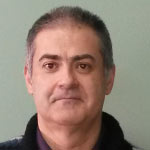 Antonio Palacios Cibrián
Profesor y director TFG
Professor and TFG director
Licenciado y Doctor en Psicología por la UAM, con título de especialización didáctica y acreditado como Profesor de Universidad Privada por la ANECA.
Cuenta con Múltiples publicaciones en libros y revistas internacionales en las áreas de la Psicología, la ciencia de la Educación y la Fisioterapia.
Ejerce como profesor de secundaria en el área de Filosofía. Además, ha colaborado como profesor asociado de la Facultad de ciencias de la Salud de la UEM y del Departamento de Psicología de la UNIR. Actualmente, es profesor asociado del Departamento de Educación de la Universidad Nebrija.
apalacios@nebrija.es
Antonio Palacios Cibrián
Profesor y director TFG
Professor and TFG director
Licenciado y Doctor en Psicología por la UAM, con título de especialización didáctica y acreditado como Profesor de Universidad Privada por la ANECA.
Cuenta con Múltiples publicaciones en libros y revistas internacionales en las áreas de la Psicología, la ciencia de la Educación y la Fisioterapia.
Ejerce como profesor de secundaria en el área de Filosofía. Además, ha colaborado como profesor asociado de la Facultad de ciencias de la Salud de la UEM y del Departamento de Psicología de la UNIR. Actualmente, es profesor asociado del Departamento de Educación de la Universidad Nebrija.
apalacios@nebrija.es
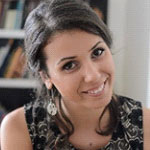 Ivana Palibrk
Profesora y Directora TFG
Professor
Doctora en Estudios Literarios por la UCM. Ha compaginado la docencia en la Universidad de Burgos con la docencia y la labor de dirección y coordinación pedagógica en varios centros de idiomas. Ha trabajado como traductora e intérprete de inglés, español y serbio, como coach de idiomas para montajes teatrales y actualmente es traductora del Programa CELA, apoyado por la EACWP. Entre las obras que ha traducido se encuentran monografías de autoras como Gerda Lerner o Michele Wallace. Ha publicado diversos artículos en revistas científicas. Actualmente, docente en la Facultad de Lenguas y Educación de la Universidad Nebrija y colaboradora en el Máster Universitario en Formación del Profesorado de Educación Secundaria en la UDIMA.
Ivana Palibrk
Profesora y Directora TFG
Professor
Doctora en Estudios Literarios por la UCM. Ha compaginado la docencia en la Universidad de Burgos con la docencia y la labor de dirección y coordinación pedagógica en varios centros de idiomas. Ha trabajado como traductora e intérprete de inglés, español y serbio, como coach de idiomas para montajes teatrales y actualmente es traductora del Programa CELA, apoyado por la EACWP. Entre las obras que ha traducido se encuentran monografías de autoras como Gerda Lerner o Michele Wallace. Ha publicado diversos artículos en revistas científicas. Actualmente, docente en la Facultad de Lenguas y Educación de la Universidad Nebrija y colaboradora en el Máster Universitario en Formación del Profesorado de Educación Secundaria en la UDIMA.
ipalibrk@nebrija.es
 Katarzyna Barbara Parys
Profesora y Directora TFG
Professor
Doctora en Estudios Artísticos, Literarios y de la Cultura por la Universidad Autónoma de Madrid y en Estudios Literarios por la Universidad de Varsovia (Tesis doctoral: El problema ontológico de los personajes literarios en la narrativa breve de Miguel de Unamuno. 2022). Graduada en Estudios Ibéricos (TFG: El lector modelo en “Ferdydurke” de Witold Gombrowicz y en su traducción al castellano: un análisis comparativo. 2013) y en Warsaw International Studies in Philosophy (TFG: Miguel de Unamuno's theories of fictional characters: a critical overview. 2020), Máster en Filología Ibérica (TFM: El panorama de la metaficción en la literatura española: Cervantes, Unamuno y Muñoz Molina. 2015), todos por la Universidad de Varsovia. Máster en Formación de Profesorado en Educación Secundaria Obligatoria y Bachillerato. Filosofía por la Universidad Autónoma de Madrid (TFM: Filosofía española en Bachillerato: una propuesta para la inclusión del pensamiento filosófico de Miguel de Unamuno en el aula. 2022). Estancias: CEEPUS en Karl-FranzensUniversität Graz (2020), Erasmus: Universidad Autónoma de Madrid (2014/2015), Universidad de Sevilla (2017), Universidade Aberta de Portugal (2017/2018), Universidad Complutense de Madrid (2018/2019). Autora de distintas publicaciones y presentaciones en congresos relacionadas con estudios literarios y didáctica de lenguas extranjeras. Profesora de grado en la Facultad de Lenguas y Educación. Miembro de Philobiblion Asociación de Jóvenes Hispanistas y Madrid Philosophy Network. Otras líneas de investigación: Teoría literaria, Filosofía, Didáctica de lenguas extranjeras.
Katarzyna Barbara Parys
Profesora y Directora TFG
Professor
Doctora en Estudios Artísticos, Literarios y de la Cultura por la Universidad Autónoma de Madrid y en Estudios Literarios por la Universidad de Varsovia (Tesis doctoral: El problema ontológico de los personajes literarios en la narrativa breve de Miguel de Unamuno. 2022). Graduada en Estudios Ibéricos (TFG: El lector modelo en “Ferdydurke” de Witold Gombrowicz y en su traducción al castellano: un análisis comparativo. 2013) y en Warsaw International Studies in Philosophy (TFG: Miguel de Unamuno's theories of fictional characters: a critical overview. 2020), Máster en Filología Ibérica (TFM: El panorama de la metaficción en la literatura española: Cervantes, Unamuno y Muñoz Molina. 2015), todos por la Universidad de Varsovia. Máster en Formación de Profesorado en Educación Secundaria Obligatoria y Bachillerato. Filosofía por la Universidad Autónoma de Madrid (TFM: Filosofía española en Bachillerato: una propuesta para la inclusión del pensamiento filosófico de Miguel de Unamuno en el aula. 2022). Estancias: CEEPUS en Karl-FranzensUniversität Graz (2020), Erasmus: Universidad Autónoma de Madrid (2014/2015), Universidad de Sevilla (2017), Universidade Aberta de Portugal (2017/2018), Universidad Complutense de Madrid (2018/2019). Autora de distintas publicaciones y presentaciones en congresos relacionadas con estudios literarios y didáctica de lenguas extranjeras. Profesora de grado en la Facultad de Lenguas y Educación. Miembro de Philobiblion Asociación de Jóvenes Hispanistas y Madrid Philosophy Network. Otras líneas de investigación: Teoría literaria, Filosofía, Didáctica de lenguas extranjeras.
kparys@nebrija.es
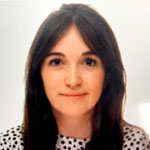 Irene Parra Lara
Profesora y Directora TFG
Professor and TFG Director
Graduada en Educación Infantil y en Educación Primaria. Máster Universitario en Enseñanza del Español como Lengua Extranjera.
Irene Parra Lara
Profesora y Directora TFG
Professor and TFG Director
Graduada en Educación Infantil y en Educación Primaria. Máster Universitario en Enseñanza del Español como Lengua Extranjera.Su experiencia laboral se ha desarrollado principalmente en el ámbito de la Educación Infantil. Desde 2017, es tutora de Practicum para futuros maestros de Infantil. Además ha dirigido diversos Trabajo Fin de Grado y participado en Tribunales de evaluación bajo el rol de secretaria.
iparra@nebrija.es
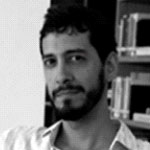 Javier Pérez Martínez
Director TFG
TFG Director
Es profesor e investigador acreditado por la ANECA. Doctor en Estudios Artísticos, Literarios y de la Cultura por la Universidad Autónoma de Madrid; Máster en Estudios Contemporáneos de América Latina (UCM) y Licenciado en Periodismo. Dedicó su tesis a estudiar la evolución de la lírica popular campesina de la costa del Ecuador. Ha publicado varios artículos y estudios en revistas indexadas. Cuenta con la edición del libro: Versos de amor y sátira en el Amorfino. Estudio y clasificación de la copla montubia (2021). Ha ejercido el periodismo como reportero, cronista y redactor de medios en España y Ecuador. En 2020 publicó con el Ángel Editor el poemario Sombra, pálpito y salitre. Actualmente dicta clases en de Literatura en el grado de Educación Primaria en la Universidad Antonio de Nebrija y dirige tesis del Máster Didáctica de la Lengua de la UNIR.
Javier Pérez Martínez
Director TFG
TFG Director
Es profesor e investigador acreditado por la ANECA. Doctor en Estudios Artísticos, Literarios y de la Cultura por la Universidad Autónoma de Madrid; Máster en Estudios Contemporáneos de América Latina (UCM) y Licenciado en Periodismo. Dedicó su tesis a estudiar la evolución de la lírica popular campesina de la costa del Ecuador. Ha publicado varios artículos y estudios en revistas indexadas. Cuenta con la edición del libro: Versos de amor y sátira en el Amorfino. Estudio y clasificación de la copla montubia (2021). Ha ejercido el periodismo como reportero, cronista y redactor de medios en España y Ecuador. En 2020 publicó con el Ángel Editor el poemario Sombra, pálpito y salitre. Actualmente dicta clases en de Literatura en el grado de Educación Primaria en la Universidad Antonio de Nebrija y dirige tesis del Máster Didáctica de la Lengua de la UNIR.
jperezmar@nebrija.es
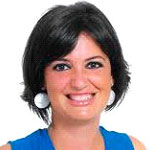 María Raquel Picornell Buendía
Directora de TFG
Professor
Doctora en Ciencia e Ingeniería Agraria por la UCLM, Licenciada en Ciencias Religiosas, Docente en Infantil, Primaria y Secundaria. Tiene las menciones de Música, Inglés, Pedagogía Terapéutica, Audición y Lenguaje, y Educación Física. Además, es experta en Coaching (Certificado: AECOP + ITA + DISC + ESIN + SKILLS 21) y experta en Igualdad de Género y Oportunidades. Su experiencia profesional educativa abarca las materias de Física, Química, Biología y Geología, Matemáticas, Tecnología, Informática y Religión en la ESO, haciendo uso de las TIC y aplicando Aprendizaje Basado en Proyectos, Aprendizaje Cooperativo, Inteligencias Múltiples, Destrezas de Pensamiento y Proyectos de Comprensión, entre otros.
María Raquel Picornell Buendía
Directora de TFG
Professor
Doctora en Ciencia e Ingeniería Agraria por la UCLM, Licenciada en Ciencias Religiosas, Docente en Infantil, Primaria y Secundaria. Tiene las menciones de Música, Inglés, Pedagogía Terapéutica, Audición y Lenguaje, y Educación Física. Además, es experta en Coaching (Certificado: AECOP + ITA + DISC + ESIN + SKILLS 21) y experta en Igualdad de Género y Oportunidades. Su experiencia profesional educativa abarca las materias de Física, Química, Biología y Geología, Matemáticas, Tecnología, Informática y Religión en la ESO, haciendo uso de las TIC y aplicando Aprendizaje Basado en Proyectos, Aprendizaje Cooperativo, Inteligencias Múltiples, Destrezas de Pensamiento y Proyectos de Comprensión, entre otros.
mpicorne@nebrija.es
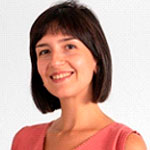 Clara Planchuelo Fernández
Profesora y Directora de TFG
Professor
Directora de los Másteres de Didáctica del Español como Lengua Extranjera y Lingüística Aplicada a la Enseñanza del Español como Lengua Extranjera. Profesora de Máster y en los Grados de Educación. Doctora en Psicolingüística (Educación y Procesos Cognitivos) por Universidad Nebrija. Es graduada en Filología Hispánica (Universidad de Alcalá) y cuenta con el Máster en Formación de Profesores de Español como Lengua Extranjera (UAH), y el Máster en Cognición y Emoción en Contextos Educativos (U. Nebrija). Tras una extensa etapa dedicada a la docencia y formación de alumnos para exámenes oficiales de ELE, actualmente es Directora de los Másteres en Didáctica del Español como Lengua Extranjera y Lingüística Aplicada a la Enseñanza de Español como Lengua Extranjera (Departamento de Lenguas), además de impartir docencia en estos programas y en los Grados de Educación. Asimismo, es investigadora miembro del Centro de Investigación Nebrija en Cognición (CINC) y el Affective Neuroscience and Cognition Group (AFNECO), en Universidad Complutense de Madrid. También ha sido gestora de un proyecto público financiado por la Comunidad de Madrid y el Fondo Social Europeo dedicado al estudio de los procesos de adquisición del conocimiento (SAPIENTIA-CM). Cuenta con diversas publicaciones científicas y divulgativas acerca de la organización mental del léxico. Su gran pasión profesional se centra en las áreas científicas que abordan el aprendizaje de lenguas extranjeras y la neurociencia cognitiva.
Clara Planchuelo Fernández
Profesora y Directora de TFG
Professor
Directora de los Másteres de Didáctica del Español como Lengua Extranjera y Lingüística Aplicada a la Enseñanza del Español como Lengua Extranjera. Profesora de Máster y en los Grados de Educación. Doctora en Psicolingüística (Educación y Procesos Cognitivos) por Universidad Nebrija. Es graduada en Filología Hispánica (Universidad de Alcalá) y cuenta con el Máster en Formación de Profesores de Español como Lengua Extranjera (UAH), y el Máster en Cognición y Emoción en Contextos Educativos (U. Nebrija). Tras una extensa etapa dedicada a la docencia y formación de alumnos para exámenes oficiales de ELE, actualmente es Directora de los Másteres en Didáctica del Español como Lengua Extranjera y Lingüística Aplicada a la Enseñanza de Español como Lengua Extranjera (Departamento de Lenguas), además de impartir docencia en estos programas y en los Grados de Educación. Asimismo, es investigadora miembro del Centro de Investigación Nebrija en Cognición (CINC) y el Affective Neuroscience and Cognition Group (AFNECO), en Universidad Complutense de Madrid. También ha sido gestora de un proyecto público financiado por la Comunidad de Madrid y el Fondo Social Europeo dedicado al estudio de los procesos de adquisición del conocimiento (SAPIENTIA-CM). Cuenta con diversas publicaciones científicas y divulgativas acerca de la organización mental del léxico. Su gran pasión profesional se centra en las áreas científicas que abordan el aprendizaje de lenguas extranjeras y la neurociencia cognitiva.
cplanchuelo@nebrija.es
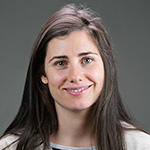 Claudia Poch Pérez-Botija
Profesora y Directora TFG
Professor and TFG Director
Doctora acreditada en Neurociencia por la Universidad Autónoma de Madrid Licenciada en Psicología, con la especialidad de Psicología y Ciencia Cognitiva en la Universidad Complutense de Madrid. Beca de investigación en el Centro de Magnetoencefalografía Perez-Modrego de la Universidad Complutense de Madrid y estancia de investigación en el Center for Cognitive Neuroscience (UCL), Londres, Actualmente forma parte del grupo de investigación que el Dr. Duñabeitia dirige en la Universidad de Nebrija y mantiene una colaboración activa con el grupo de investigación del Prof. Romei de la Universidad de Boloña (Italia). En relación a su trayectoria investigadora, ésta se ha centrado fundamentalmente en dos proyectos financiados por el Ministerio de Economía y Competitividad. El primero, estudia los procesos neurofisiológicos asociados a la atención dentro de la Memoria Operativa. El segundo se centra en la memoria semántica en pacientes con epilepsia. Como resultado, su producción científica asciende a 21 publicaciones, el 73 % en Q1.
Claudia Poch Pérez-Botija
Profesora y Directora TFG
Professor and TFG Director
Doctora acreditada en Neurociencia por la Universidad Autónoma de Madrid Licenciada en Psicología, con la especialidad de Psicología y Ciencia Cognitiva en la Universidad Complutense de Madrid. Beca de investigación en el Centro de Magnetoencefalografía Perez-Modrego de la Universidad Complutense de Madrid y estancia de investigación en el Center for Cognitive Neuroscience (UCL), Londres, Actualmente forma parte del grupo de investigación que el Dr. Duñabeitia dirige en la Universidad de Nebrija y mantiene una colaboración activa con el grupo de investigación del Prof. Romei de la Universidad de Boloña (Italia). En relación a su trayectoria investigadora, ésta se ha centrado fundamentalmente en dos proyectos financiados por el Ministerio de Economía y Competitividad. El primero, estudia los procesos neurofisiológicos asociados a la atención dentro de la Memoria Operativa. El segundo se centra en la memoria semántica en pacientes con epilepsia. Como resultado, su producción científica asciende a 21 publicaciones, el 73 % en Q1.
cpoch@nebrija.es
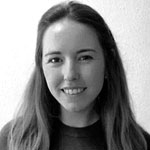 Sara Pulgar Tomás
Profesora y Directora TFG
Professor
Diplomada en Educación Musical y Graduada en Educación Primaria por la Facultad del Profesorado de la Universidad de Oviedo, además del Grado de Educación Infantil por la Universidad Antonio de Nebrija. Formación continua centrada en innovación educativa en el aula. Desarrolla su labor profesional como maestra en Educación Infantil y en Educación Primaria.
Sara Pulgar Tomás
Profesora y Directora TFG
Professor
Diplomada en Educación Musical y Graduada en Educación Primaria por la Facultad del Profesorado de la Universidad de Oviedo, además del Grado de Educación Infantil por la Universidad Antonio de Nebrija. Formación continua centrada en innovación educativa en el aula. Desarrolla su labor profesional como maestra en Educación Infantil y en Educación Primaria.
spulgar@nebrija.es
 Laura Rabanal Rodríguez
Profesora y Directora de TFG
Professor
Máster en Enfermería Escolar por el Instituto de Formación Continua de la Universidad Pública de Barcelona, con formación adicional acreditada por el Colegio Oficial de Enfermería de Madrid en Nutrición y Deporte, abordaje enfermero de la diabetes en el entorno escolar, y cuidados integrales para niños y adolescentes sanos. Posee el título de Experto Universitario en Cuidados y Atención de Enfermería en Urgencias, Emergencias y Soporte Vital por la Universidad Católica de Ávila (UCAV) y es graduada en Enfermería por la Universidad Pontificia de Salamanca.
Actualmente, se desempeña como Enfermera Escolar en un centro de Educación Infantil y de Educación Primaria en la Comunidad de Madrid, donde realiza funciones asistenciales y de educación para la salud dirigidas a estudiantes y docentes.
Laura Rabanal Rodríguez
Profesora y Directora de TFG
Professor
Máster en Enfermería Escolar por el Instituto de Formación Continua de la Universidad Pública de Barcelona, con formación adicional acreditada por el Colegio Oficial de Enfermería de Madrid en Nutrición y Deporte, abordaje enfermero de la diabetes en el entorno escolar, y cuidados integrales para niños y adolescentes sanos. Posee el título de Experto Universitario en Cuidados y Atención de Enfermería en Urgencias, Emergencias y Soporte Vital por la Universidad Católica de Ávila (UCAV) y es graduada en Enfermería por la Universidad Pontificia de Salamanca.
Actualmente, se desempeña como Enfermera Escolar en un centro de Educación Infantil y de Educación Primaria en la Comunidad de Madrid, donde realiza funciones asistenciales y de educación para la salud dirigidas a estudiantes y docentes.
lrabanal@nebrija.es
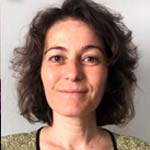 Elizabeth Ransanz Reyes
Profesora y Directora de TFG
Professor
Ha cursado el Máster en Formación del Profesorado de Educación Secundaria y Bachillerato, Formación Profesional y Enseñanza de Idiomas, el Máster en Arteterapia y Educación Artística para la Inclusión Social por la Universidad Autónoma de Madrid, y el Máster en Neuroeducación por la Universidad Complutense, además de varios cursos de posgrado y doctorado. Colabora como profesora en la Universidad Camilo José Cela y la Universidad Francisco de Vitoria, impartiendo asignaturas de Técnicas de Comunicación, Habilidades del Profesor y Acción Tutorial en los grados de Educación Infantil y Primaria. También participa en programas de posgrado para la formación del profesorado.
Elizabeth Ransanz Reyes
Profesora y Directora de TFG
Professor
Ha cursado el Máster en Formación del Profesorado de Educación Secundaria y Bachillerato, Formación Profesional y Enseñanza de Idiomas, el Máster en Arteterapia y Educación Artística para la Inclusión Social por la Universidad Autónoma de Madrid, y el Máster en Neuroeducación por la Universidad Complutense, además de varios cursos de posgrado y doctorado. Colabora como profesora en la Universidad Camilo José Cela y la Universidad Francisco de Vitoria, impartiendo asignaturas de Técnicas de Comunicación, Habilidades del Profesor y Acción Tutorial en los grados de Educación Infantil y Primaria. También participa en programas de posgrado para la formación del profesorado.
Entre sus investigaciones se destacan el proyecto I+D+I “Innovación e inclusión de la muerte y la conciencia de finitud en el ámbito educativo formal” (2017-2021) en la Universidad Autónoma de Madrid, “Mejoras Metodológicas de Manuales Docentes en la Educación Universitaria (MANUAL)” con la Universidad del Atlántico Medio, y “Pedagogía Radical en el desarrollo de la Conciencia” en la Universidad Autónoma de Madrid. Actualmente, colabora en la creación de la Cátedra UNESCO en “Pedagogía Hospitalaria” junto al grupo CELEI y otras universidades iberoamericanas. Es miembro activo de la asociación “Remontando el Vuelo” para el asesoramiento en pérdidas y duelo.
Entre sus publicaciones destacan “La inclusión del tema de la muerte en los currículos de las distintas Comunidades Autónomas” (2021), “Propuesta metodológica de Pedagogía de la muerte” (2021), y “La muerte en la construcción de la identidad personal” (2016).
eransanz@nebrija.es
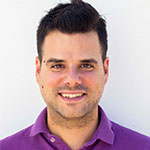 Manuel Reiriz Rojas
Director TFG
Professor
Doctor en Biología por la universidad de Sevilla, cursando el Máster oficial de Fisiología y Neurociencia. Ha ejercido docencia en el departamento de Psicobiología de la Universidad de Sevilla y en la Universidad Antonio Nebrija en el Máster de formación del profesorado. Cuenta con experiencia tanto en el campo de la neurociencia y su enseñanza como en el de educación. Posee Igualmente publicaciones en el ámbito de la Psicobiología y en el de la innovación docente.
Manuel Reiriz Rojas
Director TFG
Professor
Doctor en Biología por la universidad de Sevilla, cursando el Máster oficial de Fisiología y Neurociencia. Ha ejercido docencia en el departamento de Psicobiología de la Universidad de Sevilla y en la Universidad Antonio Nebrija en el Máster de formación del profesorado. Cuenta con experiencia tanto en el campo de la neurociencia y su enseñanza como en el de educación. Posee Igualmente publicaciones en el ámbito de la Psicobiología y en el de la innovación docente.
mreiriz@nebrija.es
 Jose Francisco Rocabado Rocha
Profesor y Director TFG
Professor
Profesor e investigador en formación en los Grados de Educación Infantil, Primaria y doble Grado en Educación Primaria y Psicología. Doctorando en Educación y Procesos Cognitivos en la Universidad Nebrija. Graduado en Psicología por la Universidad Católica de Valencia. Máster en Psicología Clínica General en Sanitaria por la Universidad Católica de Valencia. En la actualidad es miembro del Centro de Investigación Nebrija en cognición (CINC) Su actividad investigadora se centra en la implementación y uso de técnicas de Realidad Virtual como puente entre el laboratorio y el mundo real, con el fin de explorar procesos cognitivos ampliamente estudiados en el laboratorio como son el procesamiento del lenguaje, las emociones, el aprendizaje incidental y las funciones ejecutiva en un contexto muy cercano a la realidad. Colabora activamente con grupos de investigación en la Universidad de Valencia y la Universidad de Bournemouth. Es autor de diversos artículos científicos en revistas de alto impacto (Q1 y decil 1) y ponente en congresos nacionales e internacionales.
Jose Francisco Rocabado Rocha
Profesor y Director TFG
Professor
Profesor e investigador en formación en los Grados de Educación Infantil, Primaria y doble Grado en Educación Primaria y Psicología. Doctorando en Educación y Procesos Cognitivos en la Universidad Nebrija. Graduado en Psicología por la Universidad Católica de Valencia. Máster en Psicología Clínica General en Sanitaria por la Universidad Católica de Valencia. En la actualidad es miembro del Centro de Investigación Nebrija en cognición (CINC) Su actividad investigadora se centra en la implementación y uso de técnicas de Realidad Virtual como puente entre el laboratorio y el mundo real, con el fin de explorar procesos cognitivos ampliamente estudiados en el laboratorio como son el procesamiento del lenguaje, las emociones, el aprendizaje incidental y las funciones ejecutiva en un contexto muy cercano a la realidad. Colabora activamente con grupos de investigación en la Universidad de Valencia y la Universidad de Bournemouth. Es autor de diversos artículos científicos en revistas de alto impacto (Q1 y decil 1) y ponente en congresos nacionales e internacionales.
jrocabado@nebrija.es
 Olga Rodríguez Alejandre
Profesora y Directora TFG
Professor and TFG Director
Licenciada en Psicología. Actualmente es doctoranda en educación y desarrolla su investigación acerca de los trabajadores con discapacidad intelectual frente a los empresarios como un valor añadido. Centra su principal labor en la formación de personas adultas con discapacidad intelectual en proyectos formativos para adultos con discapacidad intelectual (DI). Comparte su tarea docente en varias universidades. Su línea principal de investigación se ha venido desarrollando a nivel internacional y nacional, con el soporte de varias convocatorias I+D+i, centrándose en la investigación de apoyos formativos y tecnológico que favorezcan la calidad de vida de las personas con discapacidad intelectual. Conjuntamente ha participado en diversos congresos del ámbito de la educación inclusiva y la DI aportando diversas comunicaciones.
Olga Rodríguez Alejandre
Profesora y Directora TFG
Professor and TFG Director
Licenciada en Psicología. Actualmente es doctoranda en educación y desarrolla su investigación acerca de los trabajadores con discapacidad intelectual frente a los empresarios como un valor añadido. Centra su principal labor en la formación de personas adultas con discapacidad intelectual en proyectos formativos para adultos con discapacidad intelectual (DI). Comparte su tarea docente en varias universidades. Su línea principal de investigación se ha venido desarrollando a nivel internacional y nacional, con el soporte de varias convocatorias I+D+i, centrándose en la investigación de apoyos formativos y tecnológico que favorezcan la calidad de vida de las personas con discapacidad intelectual. Conjuntamente ha participado en diversos congresos del ámbito de la educación inclusiva y la DI aportando diversas comunicaciones.
orodriguez@nebrija.es
 Benjamín Rodríguez Expósito
Director de TFG
Professor
Doctor en Biología. Máster universitario de especialización en Fisiología y Neurociencia, Licenciado en Biología. Actualmente ejerce como docente en diversas asignaturas del Grado de Psicología en la Universidad Nacional de Educación a Distancia (UNED), así como profesor en el Master de Formación del profesorado y el Master en cognición y emoción en contextos educativos de la Universidad Antonio de Nebrija. Asimismo, a lo largo de su carrera como docente ha impartido docencia teórica y práctica en diversas asignaturas troncales, obligatorias y optativas del Grado de Psicología, desarrollando dicha actividad docente en diversas universidades como la Universidad de Sevilla y la Universidad de Huelva; también ha participado como tutor de Trabajos Fin de Master tanto en el máster universitario de Fisiología y Neurociencia de la Universidad de Sevilla, como en el Máster Universitario en Formación del Profesorado de la Universidad Antonio de Nebrija. En cuanto a su producción científica, es autor/coautor de diversas publicaciones científicas en revistas de reconocido prestigio e incluidas en el journal citation report, tales como Behavioural Brain Research, Physiology and Behaviour, Neurobiology of learning and memory y Brain, structure and funtion. Contando las mismas con un alto índice de impacto y con posiciones destacadas dentro del campo de estudio de la neurociencia. Asimismo, ha participado en cursos, seminarios de especialización y congresos científicos tanto nacionales como internacionales, contribuyendo en estos últimos con diversas publicaciones. Ha participado como investigador en varios proyectos de investigación nacionales dentro del Plan Nacional de I+D del Gobierno de España relacionados con el estudio de las bases neurales del aprendizaje y la memoria.
Benjamín Rodríguez Expósito
Director de TFG
Professor
Doctor en Biología. Máster universitario de especialización en Fisiología y Neurociencia, Licenciado en Biología. Actualmente ejerce como docente en diversas asignaturas del Grado de Psicología en la Universidad Nacional de Educación a Distancia (UNED), así como profesor en el Master de Formación del profesorado y el Master en cognición y emoción en contextos educativos de la Universidad Antonio de Nebrija. Asimismo, a lo largo de su carrera como docente ha impartido docencia teórica y práctica en diversas asignaturas troncales, obligatorias y optativas del Grado de Psicología, desarrollando dicha actividad docente en diversas universidades como la Universidad de Sevilla y la Universidad de Huelva; también ha participado como tutor de Trabajos Fin de Master tanto en el máster universitario de Fisiología y Neurociencia de la Universidad de Sevilla, como en el Máster Universitario en Formación del Profesorado de la Universidad Antonio de Nebrija. En cuanto a su producción científica, es autor/coautor de diversas publicaciones científicas en revistas de reconocido prestigio e incluidas en el journal citation report, tales como Behavioural Brain Research, Physiology and Behaviour, Neurobiology of learning and memory y Brain, structure and funtion. Contando las mismas con un alto índice de impacto y con posiciones destacadas dentro del campo de estudio de la neurociencia. Asimismo, ha participado en cursos, seminarios de especialización y congresos científicos tanto nacionales como internacionales, contribuyendo en estos últimos con diversas publicaciones. Ha participado como investigador en varios proyectos de investigación nacionales dentro del Plan Nacional de I+D del Gobierno de España relacionados con el estudio de las bases neurales del aprendizaje y la memoria.
brodrigueze@nebrija.es
 D' Orey Roquete Montenegro, María
Profesora y Directora TFG
Professor
Doctora en Educación por la UCM. Máster en Educación Especial (UCM). Licenciada en Educación, mención Ciencias Pedagógicas (UCAB). Coordinadora del área de I+d+i de la Fundación Prodis y del Curso Experto Conecta2, formación e-learning adaptada en competencias digitales, para personas con discapacidad intelectual. Autora de distintas publicaciones y presentaciones en congresos relacionadas con procesos transdiagnósticos en la salud mental de personas con y sin discapacidad intelectual.
mdoreyro@nebrija.es
D' Orey Roquete Montenegro, María
Profesora y Directora TFG
Professor
Doctora en Educación por la UCM. Máster en Educación Especial (UCM). Licenciada en Educación, mención Ciencias Pedagógicas (UCAB). Coordinadora del área de I+d+i de la Fundación Prodis y del Curso Experto Conecta2, formación e-learning adaptada en competencias digitales, para personas con discapacidad intelectual. Autora de distintas publicaciones y presentaciones en congresos relacionadas con procesos transdiagnósticos en la salud mental de personas con y sin discapacidad intelectual.
mdoreyro@nebrija.es
 Teresa Rossignoli Palomeque
Profesora y Directora TFG
Professor
Doctora “Cum laude” en Psicología por la Universidad Complutense de Madrid. Máster en Neuropsicología Infantil y licenciada en Psicopedagogía. Posee amplia experiencia como personal docente-investigador en el Centro Universitario Cardenal Cisneros, profesora asociada en la Universidad Autónoma de Madrid, y docente en Master de Neurospicología en la Universidad Operta de Catalunya. A su vez, cuenta con amplia experiencia en intervención neuropsicológica y coordinación del dto. de Neuropsicología Infantil en el Centro Comunica. Actualmente, es la directora del máster en Cognición y Emoción en Contextos Educativos por la Universidad Antonio de Nebrija.
Su enfoque de trabajo es la aplicación del conocimiento neurocientífico, junto con las bases de desarrollo, es clave en la práctica educativa.
Su investigación está especialmente orientada al entrenamiento cognitivo de la atención y de las funciones ejecutivas en población escolar, entre los que destaca: (1) Rossignoli-Palomeque, T., Perez-Hernandez, E., & González Marqués, J. (2018). Brain training in children and adolescents: Is it scientifically valid? Frontiers in Psychology, 9, 565. (2) Rossignoli, T, Perez-Hernandez, E., Quiros-Godoy, M., González Marqués, J (2019) Schoolchildren’s compensatory strategies during an Executive Function App Training. Frontiers in Psychology 10, 2332. (3) Rossignoli, T, Perez-Hernandez, E., González Marqués, J. (2020) Training effects on attention and EF strategy-based training “Nexxo” in school-age students. Acta Psychologica 210, 103174.
Teresa Rossignoli Palomeque
Profesora y Directora TFG
Professor
Doctora “Cum laude” en Psicología por la Universidad Complutense de Madrid. Máster en Neuropsicología Infantil y licenciada en Psicopedagogía. Posee amplia experiencia como personal docente-investigador en el Centro Universitario Cardenal Cisneros, profesora asociada en la Universidad Autónoma de Madrid, y docente en Master de Neurospicología en la Universidad Operta de Catalunya. A su vez, cuenta con amplia experiencia en intervención neuropsicológica y coordinación del dto. de Neuropsicología Infantil en el Centro Comunica. Actualmente, es la directora del máster en Cognición y Emoción en Contextos Educativos por la Universidad Antonio de Nebrija.
Su enfoque de trabajo es la aplicación del conocimiento neurocientífico, junto con las bases de desarrollo, es clave en la práctica educativa.
Su investigación está especialmente orientada al entrenamiento cognitivo de la atención y de las funciones ejecutivas en población escolar, entre los que destaca: (1) Rossignoli-Palomeque, T., Perez-Hernandez, E., & González Marqués, J. (2018). Brain training in children and adolescents: Is it scientifically valid? Frontiers in Psychology, 9, 565. (2) Rossignoli, T, Perez-Hernandez, E., Quiros-Godoy, M., González Marqués, J (2019) Schoolchildren’s compensatory strategies during an Executive Function App Training. Frontiers in Psychology 10, 2332. (3) Rossignoli, T, Perez-Hernandez, E., González Marqués, J. (2020) Training effects on attention and EF strategy-based training “Nexxo” in school-age students. Acta Psychologica 210, 103174.
trossignoli@nebrija.es
 Carmen Cecilia Roz Faraco
Profesora y Directora TFG
Professor
Profesora de la asignatura de Atención Temprana. Doctora en Educación por la Universidad de Alcalá. Máster en psicopedagogía por la Universidad de Alcalá. Licenciada en psicopedagogía título homologado por el Reino de España y Profesora de Educación Especial mención dificultades en el aprendizaje por la Universidad Pedagógica Experimental Libertador. Su línea de investigación se centra en la formación de los maestros/as y psicomotricidad infantil. Experiencia profesional como psicopedagoga en atención temprana por más de 10 años y como psicopedagoga a nivel de instituciones educativas por más de 15 años para el Ministerio de Educación en Venezuela, 6 años de experiencia como profesora universitaria de grado y postgrado tanto en Venezuela, España y México. Autora de distintos artículos de investigación y presentaciones en congresos internacionales. Actualmente, docente en grado en la Universidad Nebrija.
Carmen Cecilia Roz Faraco
Profesora y Directora TFG
Professor
Profesora de la asignatura de Atención Temprana. Doctora en Educación por la Universidad de Alcalá. Máster en psicopedagogía por la Universidad de Alcalá. Licenciada en psicopedagogía título homologado por el Reino de España y Profesora de Educación Especial mención dificultades en el aprendizaje por la Universidad Pedagógica Experimental Libertador. Su línea de investigación se centra en la formación de los maestros/as y psicomotricidad infantil. Experiencia profesional como psicopedagoga en atención temprana por más de 10 años y como psicopedagoga a nivel de instituciones educativas por más de 15 años para el Ministerio de Educación en Venezuela, 6 años de experiencia como profesora universitaria de grado y postgrado tanto en Venezuela, España y México. Autora de distintos artículos de investigación y presentaciones en congresos internacionales. Actualmente, docente en grado en la Universidad Nebrija.
croz@nebrija.es
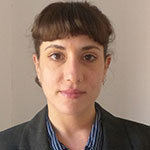 María Dolores Rueda Montero
Profesora y Directora TFG
Professor
Doctor en Literatura en Inglés (Estudios Filológicos) por la Universidad de Sevilla Profesora en el grado en Educación Infantil y Mención en Lengua Extranjera en nuestra Universidad, también enseña Inglés presencialmente en los grados de ESNE (Escuela Universitaria de Diseño). Colabora además en las universidades Francisco de Vitoria y Camilo José Cela en diversos másters oficiales online centrados en la enseñanza de las segundas lenguas, psicopedagogía, y competencias docentes. Doctora en Literatura en Inglés y licenciada en Filología Inglesa por la Universidad de Sevilla. Su investigación doctoral en la Universidad de Sevilla se centra en el campo de los Discursos de la Postmodernidad, que es su especialidad, y su tesis en inglés se titula "Identity as Alterity in Paul Auster's The New York Trilogy and Martin Amis's London Fields", mientras que su tesina versaba sobre viajes en el tiempo a la Segunda Guerra Mundial. Ha realizado el Máster Universitario de formación de profesorado de Educación Secundaria, Obligatoria y Bachillerato, Formación Profesional y Enseñanza de Idiomas en inglés y cursado estudios de postgrado en la enseñanza de las segundas lenguas en EEUU. Anteriormente ha sido profesora de ELE y GRC (Graduate Research Consultant) en la UNC at Chapel Hill (Universidad de Carolina del Norte), además de tener amplia experiencia como profesora en todo tipo de contextos bilingües.
María Dolores Rueda Montero
Profesora y Directora TFG
Professor
Doctor en Literatura en Inglés (Estudios Filológicos) por la Universidad de Sevilla Profesora en el grado en Educación Infantil y Mención en Lengua Extranjera en nuestra Universidad, también enseña Inglés presencialmente en los grados de ESNE (Escuela Universitaria de Diseño). Colabora además en las universidades Francisco de Vitoria y Camilo José Cela en diversos másters oficiales online centrados en la enseñanza de las segundas lenguas, psicopedagogía, y competencias docentes. Doctora en Literatura en Inglés y licenciada en Filología Inglesa por la Universidad de Sevilla. Su investigación doctoral en la Universidad de Sevilla se centra en el campo de los Discursos de la Postmodernidad, que es su especialidad, y su tesis en inglés se titula "Identity as Alterity in Paul Auster's The New York Trilogy and Martin Amis's London Fields", mientras que su tesina versaba sobre viajes en el tiempo a la Segunda Guerra Mundial. Ha realizado el Máster Universitario de formación de profesorado de Educación Secundaria, Obligatoria y Bachillerato, Formación Profesional y Enseñanza de Idiomas en inglés y cursado estudios de postgrado en la enseñanza de las segundas lenguas en EEUU. Anteriormente ha sido profesora de ELE y GRC (Graduate Research Consultant) en la UNC at Chapel Hill (Universidad de Carolina del Norte), además de tener amplia experiencia como profesora en todo tipo de contextos bilingües.
mrueda@nebrija.es
 Sandra Ruiz Ambit
Profesora y Directora TFG
Professor
Coordinadora Máster Estudios Avanzados en Altas Capacidades y Desarrollo del Talento y Coordinadora Máster en Desarrollo del Lenguaje y Dificultades en la Comunicación. Doctora en Educación, compagina la docencia universitaria con la investigación y participación en distintos proyectos de innovación relacionados con la atención a las necesidades específicas de apoyo educativo y la pedagogía. Tiene experiencia en la formación de jóvenes y adultos con necesidades específicas de apoyo educativo y la formación de docentes.
Sandra Ruiz Ambit
Profesora y Directora TFG
Professor
Coordinadora Máster Estudios Avanzados en Altas Capacidades y Desarrollo del Talento y Coordinadora Máster en Desarrollo del Lenguaje y Dificultades en la Comunicación. Doctora en Educación, compagina la docencia universitaria con la investigación y participación en distintos proyectos de innovación relacionados con la atención a las necesidades específicas de apoyo educativo y la pedagogía. Tiene experiencia en la formación de jóvenes y adultos con necesidades específicas de apoyo educativo y la formación de docentes.
sruizam@nebrija.es
 Marta Montserrat Salcedo
Profesora y Tutora TFG
Professor
Con más de 19 años de experiencia en educación y 10 en liderazgo y gestión escolar, maestra de inglés en primaria e infantil y directora de centro educativo, así como formadora de docentes. Formación y especialización en innovación, inclusión y personalización del aprendizaje, con trayectoria en colegios nacionales e internacionales. Apasionada por acompañar a profesores, alumnos y familias hacia la excelencia educativa, impulsando proyectos de ABP, cultura de evaluación y desarrollo de habilidades ejecutivas. Colaboradora en publicaciones sobre cambio educativo y personalización del aprendizaje así como colaboradora en libros de texto de educación primaria.
Marta Montserrat Salcedo
Profesora y Tutora TFG
Professor
Con más de 19 años de experiencia en educación y 10 en liderazgo y gestión escolar, maestra de inglés en primaria e infantil y directora de centro educativo, así como formadora de docentes. Formación y especialización en innovación, inclusión y personalización del aprendizaje, con trayectoria en colegios nacionales e internacionales. Apasionada por acompañar a profesores, alumnos y familias hacia la excelencia educativa, impulsando proyectos de ABP, cultura de evaluación y desarrollo de habilidades ejecutivas. Colaboradora en publicaciones sobre cambio educativo y personalización del aprendizaje así como colaboradora en libros de texto de educación primaria.
mmontser@nebrija.es
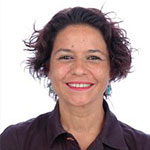 Barbara San Juan Ferrer
Profesora y Directora de TFG
Professor
Doctora en Artes por la Universidad Rey Juan Carlos. Diplomada en Magisterio de Educación Infantil, Licenciada en Pedagogía, especialidad danza, y Máster en Artes Escénicas. Línea de investigación en diversos temas relacionados con educación, inteligencia emocional, motivación, expresión corporal y las repercusiones de la danza en diversas dimensiones del ser, entre otras. Profesora universitaria desde 2014, creadora de contenidos didácticos (cursos de formación al profesorado, asignaturas universitarias). Profesora de Ed. Infantil especialidad psicomotricidad, danza y educación física infantil, predeporte. Profesora de Ed. Primaria de animación a la lectura, danza, plástica, y diferentes asignaturas. Profesora a domicilio y de hospital impartiendo docencia en edades comprendidas desde Ed. Infantil hasta Ed. Secundaria.
Barbara San Juan Ferrer
Profesora y Directora de TFG
Professor
Doctora en Artes por la Universidad Rey Juan Carlos. Diplomada en Magisterio de Educación Infantil, Licenciada en Pedagogía, especialidad danza, y Máster en Artes Escénicas. Línea de investigación en diversos temas relacionados con educación, inteligencia emocional, motivación, expresión corporal y las repercusiones de la danza en diversas dimensiones del ser, entre otras. Profesora universitaria desde 2014, creadora de contenidos didácticos (cursos de formación al profesorado, asignaturas universitarias). Profesora de Ed. Infantil especialidad psicomotricidad, danza y educación física infantil, predeporte. Profesora de Ed. Primaria de animación a la lectura, danza, plástica, y diferentes asignaturas. Profesora a domicilio y de hospital impartiendo docencia en edades comprendidas desde Ed. Infantil hasta Ed. Secundaria.
bsanjuan@nebrija.es
 Eduardo San Martín Navas
Director de TFG
Director of TFG
Doctor en Ciencias (Biología) por la UNEx y acreditado por ANECA y ACAP como profesor contratado doctor y de universidad privada. Profesor de ESO y Bachillerato en materias de Ciencias y Matemáticas, profesor de Grado y Máster y director de tesis doctorales, TFG y TFM en universidades públicas y privadas. Coordinador del Dpto. de Matemáticas y del Equipo de Calidad de un centro de Educación Secundaria. Amplia experiencia en gestión académica universitaria (secretario de Facultad y de Departamento), así como en la coordinación y ejecución de proyectos de investigación sobre Gestión y Conservación de Recursos Faunísticos. Estancias de investigación e intercambios docentes en diversas instituciones de educación iberoamericanas, publicación de artículos científicos, libros y capítulos de libros y participación en congresos nacionales e internacionales.
Eduardo San Martín Navas
Director de TFG
Director of TFG
Doctor en Ciencias (Biología) por la UNEx y acreditado por ANECA y ACAP como profesor contratado doctor y de universidad privada. Profesor de ESO y Bachillerato en materias de Ciencias y Matemáticas, profesor de Grado y Máster y director de tesis doctorales, TFG y TFM en universidades públicas y privadas. Coordinador del Dpto. de Matemáticas y del Equipo de Calidad de un centro de Educación Secundaria. Amplia experiencia en gestión académica universitaria (secretario de Facultad y de Departamento), así como en la coordinación y ejecución de proyectos de investigación sobre Gestión y Conservación de Recursos Faunísticos. Estancias de investigación e intercambios docentes en diversas instituciones de educación iberoamericanas, publicación de artículos científicos, libros y capítulos de libros y participación en congresos nacionales e internacionales.
esanmart@nebrija.es
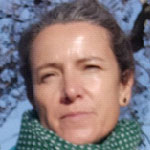 Natalia Sancho Cubino
Profesora y Directora TFG
Professor
Doctora por la universidad Complutense de Madrid en la especialidad de restauración. Becaria de investigación en la facultad de Bellas Artes de Madrid. Realización de diversas publicaciones y asistencia a congresos. Trabajo como ayudante de profesor en la universidad de Lincoln en Reino Unido, así como en diversos centros educativos como profesora de arte y de español. Actualmente profesora de la universidad Nebrija en los grados de educación en primaria y en infantil.
Natalia Sancho Cubino
Profesora y Directora TFG
Professor
Doctora por la universidad Complutense de Madrid en la especialidad de restauración. Becaria de investigación en la facultad de Bellas Artes de Madrid. Realización de diversas publicaciones y asistencia a congresos. Trabajo como ayudante de profesor en la universidad de Lincoln en Reino Unido, así como en diversos centros educativos como profesora de arte y de español. Actualmente profesora de la universidad Nebrija en los grados de educación en primaria y en infantil.
nsancho@nebrija.es
 José Javier Sanz Gil
Director TFG
Professor
Doctor acreditado sobresaliente Cum Laude en Ciencias de la Salud por la Universidad Camilo José Cela (UCJC, 2010). Experto Universitario en el Desarrollo del Aprendizaje y Conocimiento en entorno TIC (UCJC, 2011/12) y Experto en creación de Contenidos Didácticos Multimedia Interactivos” (UCJC, 2012/13). Desde septiembre de 1988, Profesor Titular en los Centros de Enseñanza "San Estanislao de Kostka, Ciudalcampo” y "SEK International School Castillo” combinando esta actividad con la creación y asesoramiento de contenidos educativos digitales e interactivos para la Empresa “Advance Educational Entertainment” S.L. (Freelance). Asimismo, es profesor en el Máster Oficial de Educación Secundaria de la Universidad UNIR y ha sido docente en el Máster Oficial Universitario en eLearning y Tecnología Educativa de Bureau Veritas, UCJC. Miembro del Consejo de redacción de diferentes revistas científicas y evaluador de diversas revistas científicas sobre educación, formación docente y TIC. Ha participado en diferentes proyectos de investigación, así como de innovación y mejora docente a través del uso de plataformas digitales educativas para alumnado universitario y de Bachillerato.
José Javier Sanz Gil
Director TFG
Professor
Doctor acreditado sobresaliente Cum Laude en Ciencias de la Salud por la Universidad Camilo José Cela (UCJC, 2010). Experto Universitario en el Desarrollo del Aprendizaje y Conocimiento en entorno TIC (UCJC, 2011/12) y Experto en creación de Contenidos Didácticos Multimedia Interactivos” (UCJC, 2012/13). Desde septiembre de 1988, Profesor Titular en los Centros de Enseñanza "San Estanislao de Kostka, Ciudalcampo” y "SEK International School Castillo” combinando esta actividad con la creación y asesoramiento de contenidos educativos digitales e interactivos para la Empresa “Advance Educational Entertainment” S.L. (Freelance). Asimismo, es profesor en el Máster Oficial de Educación Secundaria de la Universidad UNIR y ha sido docente en el Máster Oficial Universitario en eLearning y Tecnología Educativa de Bureau Veritas, UCJC. Miembro del Consejo de redacción de diferentes revistas científicas y evaluador de diversas revistas científicas sobre educación, formación docente y TIC. Ha participado en diferentes proyectos de investigación, así como de innovación y mejora docente a través del uso de plataformas digitales educativas para alumnado universitario y de Bachillerato.
jsanzgi@nebrija.es
 Marina Serrano Carot
Profesora y Tutora TFG
Professor
Investigadora y profesora en la Facultad de Lenguas y Educación de la Universidad Nebrija. Doctoranda en Educación y Procesos Cognitivos en la misma universidad. Graduada en Psicología y Máster en Psicología Clínica General Sanitaria por la Universidad Complutense de Madrid. Como psicóloga clínica y social, ha colaborado con organizaciones sin ánimo de lucro ofreciendo apoyo a personas en situación de vulnerabilidad. Su experiencia abarca la atención a problemas de salud mental como depresión, ansiedad y enfermedad mental grave, así como el acompañamiento en gestión emocional, mediación familiar, hábitos de autocuidado y orientación económica en población adulta, adolescente y también infantil en situación de vulnerabilidad. Autora de publicaciones y ponente en congresos sobre procesos cognitivos, aprendizaje y desarrollo de la lectura. Miembro del grupo de investigación CINC (Centro de Investigación Nebrija en Cognición). Sus otras líneas de investigación incluyen psicología social, desigualdad, salud y educación.
Marina Serrano Carot
Profesora y Tutora TFG
Professor
Investigadora y profesora en la Facultad de Lenguas y Educación de la Universidad Nebrija. Doctoranda en Educación y Procesos Cognitivos en la misma universidad. Graduada en Psicología y Máster en Psicología Clínica General Sanitaria por la Universidad Complutense de Madrid. Como psicóloga clínica y social, ha colaborado con organizaciones sin ánimo de lucro ofreciendo apoyo a personas en situación de vulnerabilidad. Su experiencia abarca la atención a problemas de salud mental como depresión, ansiedad y enfermedad mental grave, así como el acompañamiento en gestión emocional, mediación familiar, hábitos de autocuidado y orientación económica en población adulta, adolescente y también infantil en situación de vulnerabilidad. Autora de publicaciones y ponente en congresos sobre procesos cognitivos, aprendizaje y desarrollo de la lectura. Miembro del grupo de investigación CINC (Centro de Investigación Nebrija en Cognición). Sus otras líneas de investigación incluyen psicología social, desigualdad, salud y educación.
mserranc@nebrija.es
 Esther Tietje Fonollosa
Coordinadora de alumnos (Modalidad A distancia)
Student coordinator (Distance learning program)
Graduada en Educación Infantil en la Universidad de Alicante y Máster Universitario en Educación Especial por la Universidad Complutense de Madrid. Experiencia como maestra la etapa de Infantil y actualmente dedicada a la formación de maestros.
Esther Tietje Fonollosa
Coordinadora de alumnos (Modalidad A distancia)
Student coordinator (Distance learning program)
Graduada en Educación Infantil en la Universidad de Alicante y Máster Universitario en Educación Especial por la Universidad Complutense de Madrid. Experiencia como maestra la etapa de Infantil y actualmente dedicada a la formación de maestros.
etietje@nebrija.es
 Natalia Toledo Maestro
Profesora y Directora de TFG
Professor
Graduada en logopedia por la UCM. Técnico superior (CFGS) en Integración social Escuelas profesionales Padre Piquer. Técnico Superior (CFGS) Audiología protésica Escuela MOPE. Logopeda en atención temprana y centros de logopedia multidisciplinares para el tratamiento de trastornos de la comunicación y alimentación en personas de todas las edades: trastornos de habla, lenguaje, voz y deglución atípica, así como estimulación precoz. (Zaragoza, Logroño y Madrid). Logopeda en centros escolares CEIP, para el tratamiento e intervención de trastornos de audición y lenguaje en etapa escolar.
Natalia Toledo Maestro
Profesora y Directora de TFG
Professor
Graduada en logopedia por la UCM. Técnico superior (CFGS) en Integración social Escuelas profesionales Padre Piquer. Técnico Superior (CFGS) Audiología protésica Escuela MOPE. Logopeda en atención temprana y centros de logopedia multidisciplinares para el tratamiento de trastornos de la comunicación y alimentación en personas de todas las edades: trastornos de habla, lenguaje, voz y deglución atípica, así como estimulación precoz. (Zaragoza, Logroño y Madrid). Logopeda en centros escolares CEIP, para el tratamiento e intervención de trastornos de audición y lenguaje en etapa escolar.
ntoledo@nebrija.es
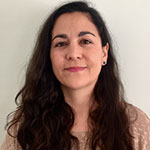 María Cruz Tornay Márquez
Directora de TFG
Professor
Acreditada Contratado Doctor (Aneca). Doctora en Comunicación, mención internacional, calificación Cum Laude por la Universidad de Sevilla; máster en Estudios de Género y Desarrollo Profesional de la Universidad de Sevilla, y licenciada en Ciencias de Comunicación, especialidad Periodismo, por el Centro Andaluz de Estudios Empresariales (CEADE) (España). Miembro del Grupo Interdisciplinario de Estudios en Comunicación, Política y Cambio Social (COMPOLÍTICAS). Colaboradora honoraria del departamento de Publicidad y Comunicación Audiovisual de la Universidad de Sevilla y revisora científica de la revista Comunicar. Miembro de la Asociación Española de Investigación de la Comunicación (AE-IC); de la Unión Latina de Economía Política de la Información, la Comunicación y la Cultura (ULEPICC); de la Red Interuniversitaria Euroamericana de Investigación sobre Competencias Mediáticas para la Ciudadanía (Red AlfaMed) y de la Red de Investigación en Comunicación Comunitaria, Alternativa y Participativa (RICCAP). Ha realizado una estancia doctoral en el Programa Universitario de Estudios de Género (PUEG) de la Universidad Nacional Autónoma de México (UNAM), con beca del Programa de Movilidad de la Asociación Universitaria Iberoamericana de Postgrado. Sus líneas de investigación se enfocan en la alfabetización mediática y la comunicación para el desarrollo y el cambio social con énfasis en la perspectiva de género. Cuenta con varias publicaciones y capítulos en libros, y ha participado en diversos congresos internacionales como ponente y panelista. Ha residido y desarrollado su labor investigadora en España, El Salvador, R.B. de Venezuela, Ecuador y Ciudad de México. Se ha desempeñado como docente investigadora en diferentes universidades de grado y postgrado. Actualmente es docente colaboradora en la Universidad de Nebrija y en el Centro San Isidoro, adscrito a la Universidad Pablo de Olavide, y profesora colaborada en el Magíster en Comunicación y Cambio Social de la Universidad Católica de la Santísima Concepción (Chile).
María Cruz Tornay Márquez
Directora de TFG
Professor
Acreditada Contratado Doctor (Aneca). Doctora en Comunicación, mención internacional, calificación Cum Laude por la Universidad de Sevilla; máster en Estudios de Género y Desarrollo Profesional de la Universidad de Sevilla, y licenciada en Ciencias de Comunicación, especialidad Periodismo, por el Centro Andaluz de Estudios Empresariales (CEADE) (España). Miembro del Grupo Interdisciplinario de Estudios en Comunicación, Política y Cambio Social (COMPOLÍTICAS). Colaboradora honoraria del departamento de Publicidad y Comunicación Audiovisual de la Universidad de Sevilla y revisora científica de la revista Comunicar. Miembro de la Asociación Española de Investigación de la Comunicación (AE-IC); de la Unión Latina de Economía Política de la Información, la Comunicación y la Cultura (ULEPICC); de la Red Interuniversitaria Euroamericana de Investigación sobre Competencias Mediáticas para la Ciudadanía (Red AlfaMed) y de la Red de Investigación en Comunicación Comunitaria, Alternativa y Participativa (RICCAP). Ha realizado una estancia doctoral en el Programa Universitario de Estudios de Género (PUEG) de la Universidad Nacional Autónoma de México (UNAM), con beca del Programa de Movilidad de la Asociación Universitaria Iberoamericana de Postgrado. Sus líneas de investigación se enfocan en la alfabetización mediática y la comunicación para el desarrollo y el cambio social con énfasis en la perspectiva de género. Cuenta con varias publicaciones y capítulos en libros, y ha participado en diversos congresos internacionales como ponente y panelista. Ha residido y desarrollado su labor investigadora en España, El Salvador, R.B. de Venezuela, Ecuador y Ciudad de México. Se ha desempeñado como docente investigadora en diferentes universidades de grado y postgrado. Actualmente es docente colaboradora en la Universidad de Nebrija y en el Centro San Isidoro, adscrito a la Universidad Pablo de Olavide, y profesora colaborada en el Magíster en Comunicación y Cambio Social de la Universidad Católica de la Santísima Concepción (Chile).
mtornay@nebrija.es
 Victoria Tornel Bastida
Profesora y Directora de TFG
Professor
Doctoranda en Educación por la Escuela Internacional de Doctorado de la Universidad Católica de Murcia (UCAM), con formación en Pedagogía por la Universidad de Murcia (UMU) y en Educación Primaria con mención en Pedagogía Terapéutica por la UCAM. Posee un Máster en Tratamiento Educativo de la Diversidad por la Universidad Nacional de Educación a Distancia (UNED). Es profesora universitaria y formadora en programas de desarrollo de competencias profesionales en el ámbito educativo y socio-cultural. Sus principales líneas de investigación incluyen la aplicación de la Inteligencia Artificial en la educación, la Atención a la Diversidad, y la Inclusión e Integración educativa.
Victoria Tornel Bastida
Profesora y Directora de TFG
Professor
Doctoranda en Educación por la Escuela Internacional de Doctorado de la Universidad Católica de Murcia (UCAM), con formación en Pedagogía por la Universidad de Murcia (UMU) y en Educación Primaria con mención en Pedagogía Terapéutica por la UCAM. Posee un Máster en Tratamiento Educativo de la Diversidad por la Universidad Nacional de Educación a Distancia (UNED). Es profesora universitaria y formadora en programas de desarrollo de competencias profesionales en el ámbito educativo y socio-cultural. Sus principales líneas de investigación incluyen la aplicación de la Inteligencia Artificial en la educación, la Atención a la Diversidad, y la Inclusión e Integración educativa.
vtornel@nebrija.es
 Teresa Ugidos Rodríguez
Profesora y Directora TFG
Professor
Licenciada en Historia y Ciencias de la Música por la Universidad Complutense de Madrid. Diploma de Estudios Avanzados en Música Hispana.
Trabaja como Profesora dentro del Grado en Educación Infantil en Universidad Nebrija. Ha sido Profesora Superior de Flauta Travesera por el Real Conservatorio Superior de Música de Madrid. Ha trabajado como Docente de Historia de la Música en el Conservatorio Profesional “Arturo Soria” durante el curso académico y ha ejercido su labor como Profesora de la Universidad Camilo José Cela en el Grado de Magisterio, impartiendo asignaturas de la Mención de Música - Historia de la Música, Percepción Musical y Formación Instrumental- así como Expresión Musical, Danzas del Mundo y Expresión Corporal del resto de especialidades.
Teresa Ugidos Rodríguez
Profesora y Directora TFG
Professor
Licenciada en Historia y Ciencias de la Música por la Universidad Complutense de Madrid. Diploma de Estudios Avanzados en Música Hispana.
Trabaja como Profesora dentro del Grado en Educación Infantil en Universidad Nebrija. Ha sido Profesora Superior de Flauta Travesera por el Real Conservatorio Superior de Música de Madrid. Ha trabajado como Docente de Historia de la Música en el Conservatorio Profesional “Arturo Soria” durante el curso académico y ha ejercido su labor como Profesora de la Universidad Camilo José Cela en el Grado de Magisterio, impartiendo asignaturas de la Mención de Música - Historia de la Música, Percepción Musical y Formación Instrumental- así como Expresión Musical, Danzas del Mundo y Expresión Corporal del resto de especialidades.
tugidos@nebrija.es
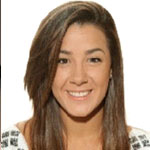 Julia Valero Lendínez
Profesora y Directora de TFG
Professor
Graduada en Pedagogía por la Universidad de Granada. Máster en Formación y Orientación para el Trabajo por la Universidad de Sevilla, Máster en Formación del Profesorado de Educación Secundaria, Bachillerato y FP en la especialidad de Orientación Educativa (UGR) y Máster en Tecnología Digital aplicada a la Práctica Docente (UCJC).
Ha desarrollado su labor profesional en el ámbito de la orientación educativa y profesional, así como en el ámbito de la formación e-learning, participando además en Tribunales de evaluación de Trabajo Fin de Grado en diferentes universidades.
Julia Valero Lendínez
Profesora y Directora de TFG
Professor
Graduada en Pedagogía por la Universidad de Granada. Máster en Formación y Orientación para el Trabajo por la Universidad de Sevilla, Máster en Formación del Profesorado de Educación Secundaria, Bachillerato y FP en la especialidad de Orientación Educativa (UGR) y Máster en Tecnología Digital aplicada a la Práctica Docente (UCJC).
Ha desarrollado su labor profesional en el ámbito de la orientación educativa y profesional, así como en el ámbito de la formación e-learning, participando además en Tribunales de evaluación de Trabajo Fin de Grado en diferentes universidades.
jvalerole@nebrija.es
 Cristina Villalonga Gómez
Directora de TFG
Professor
Doctora en Comunicación y Educación en Entornos Digitales, Máster en Comunicación y Educación en la Red y Máster en Redes Sociales y Aprendizaje Digital por la UNED y Licenciada en Periodismo por la UAB. Directora de Global Campus Nebrija. Su actividad profesional e investigadora gira en torno a dos ejes: el desarrollo de competencias mediáticas y digitales en entornos móviles y ubicuos y las metodologías de enseñanza y aprendizaje e-Learning y b- Learning, centrándose en el empoderamiento mediático y digital a través de la renovación pedagógica. Forma parte del Grupo de Investigación Nebrija en Cognición, Educación y Diferencias Individuales y colabora con el Grupo de Investigación en Comunicación e Información Digital (GICID) de la Universidad de Zaragoza y. Ha puesto en marcha un modelo de educación digital que cuenta con numerosos reconocimientos, como el Premio de Excelencia Educativa 2017 a la Mejor Universidad Online, otorgado por la Fundación Mundo Ciudad. Cuenta con el Diploma en Alta Dirección de Universidades y es representante en el Grupo de Trabajo en Formación Online y Tecnología Educativa (FOLTE) de la Sectorial CRUE-TIC, colaborando en los proyectos relacionados con la Competencia Digital Docente y la Formación EdTech.
Cristina Villalonga Gómez
Directora de TFG
Professor
Doctora en Comunicación y Educación en Entornos Digitales, Máster en Comunicación y Educación en la Red y Máster en Redes Sociales y Aprendizaje Digital por la UNED y Licenciada en Periodismo por la UAB. Directora de Global Campus Nebrija. Su actividad profesional e investigadora gira en torno a dos ejes: el desarrollo de competencias mediáticas y digitales en entornos móviles y ubicuos y las metodologías de enseñanza y aprendizaje e-Learning y b- Learning, centrándose en el empoderamiento mediático y digital a través de la renovación pedagógica. Forma parte del Grupo de Investigación Nebrija en Cognición, Educación y Diferencias Individuales y colabora con el Grupo de Investigación en Comunicación e Información Digital (GICID) de la Universidad de Zaragoza y. Ha puesto en marcha un modelo de educación digital que cuenta con numerosos reconocimientos, como el Premio de Excelencia Educativa 2017 a la Mejor Universidad Online, otorgado por la Fundación Mundo Ciudad. Cuenta con el Diploma en Alta Dirección de Universidades y es representante en el Grupo de Trabajo en Formación Online y Tecnología Educativa (FOLTE) de la Sectorial CRUE-TIC, colaborando en los proyectos relacionados con la Competencia Digital Docente y la Formación EdTech.
cvillalo@nebrija.es
 Alicia Villán Rodríguez
Profesora
Professor
Doctora en Educación por la Universidad Complutense de Madrid. Máster Especialista en Dirección de Centros Educativos y Gestión para la Calidad, Certificado en Estudios Avanzados en Creatividad Aplicada, Master Especialista en Terapia Psicomotora.
Alicia Villán Rodríguez
Profesora
Professor
Doctora en Educación por la Universidad Complutense de Madrid. Máster Especialista en Dirección de Centros Educativos y Gestión para la Calidad, Certificado en Estudios Avanzados en Creatividad Aplicada, Master Especialista en Terapia Psicomotora. Profesora dentro del Grado en Educación Infantil en Universidad Nebrija. Ha trabajado como Profesora Adjunta de Ciclo Formativo de Grado Superior de Educación y Psicología (Desarrollo Socio-Emocional e Intervención con Familias, Autonomía y Desarrollo Personal y Salud, Desarrollo Cognitivo, Integración Social, Formación y Orientación Laboral). A su vez, también ha ejercido su labor docente en las asignaturas Psicología del Desarrollo, Psicología de la Educación, Atención a Necesidades Educativas Especiales, Desarrollo Psicomotor.
avillan@nebrija.es
 Fernando Villar Palomar
Profesor y Director de TFG
Professor and TFG Director
Doctor por la UAM en el programa de doctorado de Educación
Profesor del Departamento de Educación, Facultad de Lenguas y Educación. Profesora de grado y postgrado en esa misma facultad. Docente de distintos cursos de formación y máster, tecnología, competencia digital, uso del DUA en el aula. Autor de distintas publicaciones y presentaciones en congresos relacionadas con el uso de las metodologías activas, CDD, inteligencia artificial y su relación con la mejora de la calidad del proceso de enseñanza-aprendizaje en educación por medio del uso de la tecnología.
Fernando Villar Palomar
Profesor y Director de TFG
Professor and TFG Director
Doctor por la UAM en el programa de doctorado de Educación
Profesor del Departamento de Educación, Facultad de Lenguas y Educación. Profesora de grado y postgrado en esa misma facultad. Docente de distintos cursos de formación y máster, tecnología, competencia digital, uso del DUA en el aula. Autor de distintas publicaciones y presentaciones en congresos relacionadas con el uso de las metodologías activas, CDD, inteligencia artificial y su relación con la mejora de la calidad del proceso de enseñanza-aprendizaje en educación por medio del uso de la tecnología.
fvillar@nebrija.es
 Paula Zamorano Caballero
Profesora y Directora de TFG
Professor and TFG Director
Licenciada en Ciencias de la Educación. Docente de la Facultad de Lenguas y Educación Universidad de Nebrija en el Grado de Educación Infantil. Sección Pedagogía por la Universidad Complutense de Madrid. Doctorado en la UCM, Departamento de Ciencias de investigación y Diagnóstico. Curso de Experto en Dirección de Centros Concertados por la UCM. Es, además, colaboradora en el Consejo de Redacción de la Revista de Docente Asociada en la Facultad de Educación en la UCM en el departamento de Métodos de Investigación y Diagnóstico. Actúa como Docente Asociada en la Universidad Camilo José Cela. Colaboradora contratada como Docente del Prácticum I en la Facultad de Ciencias de la Educación y Humanidades de Universidad Castilla-La Mancha. Es directora general y pedagógica del Colegio Sagrado Corazón (Franciscanas) de Madrid y Jefa del Departamento de Orientación Escolar.
Paula Zamorano Caballero
Profesora y Directora de TFG
Professor and TFG Director
Licenciada en Ciencias de la Educación. Docente de la Facultad de Lenguas y Educación Universidad de Nebrija en el Grado de Educación Infantil. Sección Pedagogía por la Universidad Complutense de Madrid. Doctorado en la UCM, Departamento de Ciencias de investigación y Diagnóstico. Curso de Experto en Dirección de Centros Concertados por la UCM. Es, además, colaboradora en el Consejo de Redacción de la Revista de Docente Asociada en la Facultad de Educación en la UCM en el departamento de Métodos de Investigación y Diagnóstico. Actúa como Docente Asociada en la Universidad Camilo José Cela. Colaboradora contratada como Docente del Prácticum I en la Facultad de Ciencias de la Educación y Humanidades de Universidad Castilla-La Mancha. Es directora general y pedagógica del Colegio Sagrado Corazón (Franciscanas) de Madrid y Jefa del Departamento de Orientación Escolar.
pzamorano@nebrija.es
Tutores
Tutors
 Paula C. Contesse Carvacho
Tutora de 2EIT
Tutor: 2EIP
Doctora en Ciencias de la Educación por la Universidad Autónoma de Barcelona. Máster en Investigación en Educación (UAB) y Máster en Psicopedagogía en la Universidad del Desarrollo de Chile. Formación de grado de Profesora de Educación Primaria y Diferencial con especialidad en Discapacidad Intelectual, Actualmente profesora de la asignatura de Psicología de la Educación para la carrera de Educación Infantil de la Universidad de Nebrija. Autora de una publicación y presentaciones en congresos relacionados con la discapacidad intelectual en diversos temas: calidad de vida, universidad y empoderamiento. Colaboradora para la Organización de Estados Iberoamericanos para la Educación, la Ciencia y la Cultura (OEI) en la creación, como autora, del libro: Experiencias inclusivas en la educación superior chilena. Cuyo objetivo es divulgar experiencias y proyectos universitarios centrados en favorecer la inclusión en educación superior de personas con discapacidad.
Paula C. Contesse Carvacho
Tutora de 2EIT
Tutor: 2EIP
Doctora en Ciencias de la Educación por la Universidad Autónoma de Barcelona. Máster en Investigación en Educación (UAB) y Máster en Psicopedagogía en la Universidad del Desarrollo de Chile. Formación de grado de Profesora de Educación Primaria y Diferencial con especialidad en Discapacidad Intelectual, Actualmente profesora de la asignatura de Psicología de la Educación para la carrera de Educación Infantil de la Universidad de Nebrija. Autora de una publicación y presentaciones en congresos relacionados con la discapacidad intelectual en diversos temas: calidad de vida, universidad y empoderamiento. Colaboradora para la Organización de Estados Iberoamericanos para la Educación, la Ciencia y la Cultura (OEI) en la creación, como autora, del libro: Experiencias inclusivas en la educación superior chilena. Cuyo objetivo es divulgar experiencias y proyectos universitarios centrados en favorecer la inclusión en educación superior de personas con discapacidad.
pcontess@nebrija.es
 MÓNICA MÉNDEZ DE LA CALLE
Tutora del 4º curso del Grado en Educación Infantil (4EIP, 4INFA)
Tutor for the 4th year of the Bachelor's Degree in Early Childhood Education (4EIP, 4INFA)
Doctora en Pedagogía por la Universidad Complutense de Madrid. Profesora en Universidad Nebrija en el Grado en Educación Infantil y en el Máster de Formación del Profesorado. Ha trabajado como docente y Coordinadora de Practicum en otras instituciones, como la Universidad Complutense de Madrid. Ha participado en diferentes proyectos de investigación financiados en colaboración con la Universidad Complutense de Madrid, en distintas temáticas relacionadas con la inclusión del alumnado con discapacidad y el valor añadido en educación y la producción educativa. Ha participado en diferentes congresos nacionales e internacionales y cuenta con una amplia experiencia en el área de intervención educativa, habiendo trabajado a su vez como formadora de docentes y adolescentes.
MÓNICA MÉNDEZ DE LA CALLE
Tutora del 4º curso del Grado en Educación Infantil (4EIP, 4INFA)
Tutor for the 4th year of the Bachelor's Degree in Early Childhood Education (4EIP, 4INFA)
Doctora en Pedagogía por la Universidad Complutense de Madrid. Profesora en Universidad Nebrija en el Grado en Educación Infantil y en el Máster de Formación del Profesorado. Ha trabajado como docente y Coordinadora de Practicum en otras instituciones, como la Universidad Complutense de Madrid. Ha participado en diferentes proyectos de investigación financiados en colaboración con la Universidad Complutense de Madrid, en distintas temáticas relacionadas con la inclusión del alumnado con discapacidad y el valor añadido en educación y la producción educativa. Ha participado en diferentes congresos nacionales e internacionales y cuenta con una amplia experiencia en el área de intervención educativa, habiendo trabajado a su vez como formadora de docentes y adolescentes.
mmendez@nebrija.es
 Clara Planchuelo Fernández
Tutora del 1º curso del Grado en Educación Infantil (1EIP, 1EIT)
Tutor for the 1st year of the Bachelor's Degree in Early Childhood Education (1EIP, 1EIT)
Directora de los Másteres de Didáctica del Español como Lengua Extranjera y Lingüística Aplicada a la Enseñanza del Español como Lengua Extranjera. Profesora de Máster y en los Grados de Educación. Doctora en Psicolingüística (Educación y Procesos Cognitivos) por Universidad Nebrija. Es graduada en Filología Hispánica (Universidad de Alcalá) y cuenta con el Máster en Formación de Profesores de Español como Lengua Extranjera (UAH), y el Máster en Cognición y Emoción en Contextos Educativos (U. Nebrija). Tras una extensa etapa dedicada a la docencia y formación de alumnos para exámenes oficiales de ELE, actualmente es Directora de los Másteres en Didáctica del Español como Lengua Extranjera y Lingüística Aplicada a la Enseñanza de Español como Lengua Extranjera (Departamento de Lenguas), además de impartir docencia en estos programas y en los Grados de Educación. Asimismo, es investigadora miembro del Centro de Investigación Nebrija en Cognición (CINC) y el Affective Neuroscience and Cognition Group (AFNECO), en Universidad Complutense de Madrid. También ha sido gestora de un proyecto público financiado por la Comunidad de Madrid y el Fondo Social Europeo dedicado al estudio de los procesos de adquisición del conocimiento (SAPIENTIA-CM). Cuenta con diversas publicaciones científicas y divulgativas acerca de la organización mental del léxico. Su gran pasión profesional se centra en las áreas científicas que abordan el aprendizaje de lenguas extranjeras y la neurociencia cognitiva.
Clara Planchuelo Fernández
Tutora del 1º curso del Grado en Educación Infantil (1EIP, 1EIT)
Tutor for the 1st year of the Bachelor's Degree in Early Childhood Education (1EIP, 1EIT)
Directora de los Másteres de Didáctica del Español como Lengua Extranjera y Lingüística Aplicada a la Enseñanza del Español como Lengua Extranjera. Profesora de Máster y en los Grados de Educación. Doctora en Psicolingüística (Educación y Procesos Cognitivos) por Universidad Nebrija. Es graduada en Filología Hispánica (Universidad de Alcalá) y cuenta con el Máster en Formación de Profesores de Español como Lengua Extranjera (UAH), y el Máster en Cognición y Emoción en Contextos Educativos (U. Nebrija). Tras una extensa etapa dedicada a la docencia y formación de alumnos para exámenes oficiales de ELE, actualmente es Directora de los Másteres en Didáctica del Español como Lengua Extranjera y Lingüística Aplicada a la Enseñanza de Español como Lengua Extranjera (Departamento de Lenguas), además de impartir docencia en estos programas y en los Grados de Educación. Asimismo, es investigadora miembro del Centro de Investigación Nebrija en Cognición (CINC) y el Affective Neuroscience and Cognition Group (AFNECO), en Universidad Complutense de Madrid. También ha sido gestora de un proyecto público financiado por la Comunidad de Madrid y el Fondo Social Europeo dedicado al estudio de los procesos de adquisición del conocimiento (SAPIENTIA-CM). Cuenta con diversas publicaciones científicas y divulgativas acerca de la organización mental del léxico. Su gran pasión profesional se centra en las áreas científicas que abordan el aprendizaje de lenguas extranjeras y la neurociencia cognitiva.
cplanchuelo@nebrija.es
 Sandra Ruiz Ambit
Tutora del 2º curso del Grado en Educación Infantil (2EIT).
Tutor for the 2nd year of the Bachelor's Degree in Early Childhood Education (2EIT).
Coordinadora Máster Estudios Avanzados en Altas Capacidades y Desarrollo del Talento y Coordinadora Máster en Desarrollo del Lenguaje y Dificultades en la Comunicación. Doctora en Educación, compagina la docencia universitaria con la investigación y participación en distintos proyectos de innovación relacionados con la atención a las necesidades específicas de apoyo educativo y la pedagogía. Tiene experiencia en la formación de jóvenes y adultos con necesidades específicas de apoyo educativo y la formación de docentes.
Sandra Ruiz Ambit
Tutora del 2º curso del Grado en Educación Infantil (2EIT).
Tutor for the 2nd year of the Bachelor's Degree in Early Childhood Education (2EIT).
Coordinadora Máster Estudios Avanzados en Altas Capacidades y Desarrollo del Talento y Coordinadora Máster en Desarrollo del Lenguaje y Dificultades en la Comunicación. Doctora en Educación, compagina la docencia universitaria con la investigación y participación en distintos proyectos de innovación relacionados con la atención a las necesidades específicas de apoyo educativo y la pedagogía. Tiene experiencia en la formación de jóvenes y adultos con necesidades específicas de apoyo educativo y la formación de docentes.
sruizam@nebrija.es
 Alicia Villán Rodríguez
Tutora del 2º y 3º curso del Grado en Educación Infantil (2IEP, 3EIP)
Tutor for 2nd and 3rd year students in the Early Childhood Education degree program (2IEP, 3EIP)
Doctora en Educación por la Universidad Complutense de Madrid. Máster Especialista en Dirección de Centros Educativos y Gestión para la Calidad, Certificado en Estudios Avanzados en Creatividad Aplicada, Master Especialista en Terapia Psicomotora. Profesora dentro del Grado en Educación Infantil en Universidad Nebrija. Ha trabajado como Profesora Adjunta de Ciclo Formativo de Grado Superior de Educación y Psicología (Desarrollo Socio-Emocional e Intervención con Familias, Autonomía y Desarrollo Personal y Salud, Desarrollo Cognitivo, Integración Social, Formación y Orientación Laboral). A su vez, también ha ejercido su labor docente en las asignaturas Psicología del Desarrollo, Psicología de la Educación, Atención a Necesidades Educativas Especiales, Desarrollo Psicomotor.
Alicia Villán Rodríguez
Tutora del 2º y 3º curso del Grado en Educación Infantil (2IEP, 3EIP)
Tutor for 2nd and 3rd year students in the Early Childhood Education degree program (2IEP, 3EIP)
Doctora en Educación por la Universidad Complutense de Madrid. Máster Especialista en Dirección de Centros Educativos y Gestión para la Calidad, Certificado en Estudios Avanzados en Creatividad Aplicada, Master Especialista en Terapia Psicomotora. Profesora dentro del Grado en Educación Infantil en Universidad Nebrija. Ha trabajado como Profesora Adjunta de Ciclo Formativo de Grado Superior de Educación y Psicología (Desarrollo Socio-Emocional e Intervención con Familias, Autonomía y Desarrollo Personal y Salud, Desarrollo Cognitivo, Integración Social, Formación y Orientación Laboral). A su vez, también ha ejercido su labor docente en las asignaturas Psicología del Desarrollo, Psicología de la Educación, Atención a Necesidades Educativas Especiales, Desarrollo Psicomotor.
avillan@nebrija.es
More Academic Information
Official Degree:Bachelor's Degree in Early Childhood Education
Profession regulated by Order EDI/3857/2007.
Possibility of obtaining a Concentration in:
- Foreign language: (English),
- Foreign Language: (French),
- Hearing and Language,
- - Therapeutic Pedagogy, or
- Physical education
The student who chooses Early Childhood Education must have:
- Interest in knowledge in general.
- Respect for culture.
- Intellectual curiosity for the acquisition of new knowledge.
- Interest in acquiring international experience and expanding one's vision of the world.
- Interest and sensitivity for literature, enjoy reading.
- Interest in communicating in several languages, particularly in English, and in knowing the cultures associated with these languages.
- Inquisitiveness and curiosity for the manifestations of contemporary art, literature and culture and, in general, for the humanities.
- Vocation for pedagogy.
- Interest in becoming professionally competent.
- Respect for human rights and equality between people.
- Sensitivity towards people with disabilities.
Full-time:
- Minimum: 45 ECTS credits
- Maximum: 90 ECTS credits
Part-time:
- Minimum: 12 ECTS credits
– Maximum: 45 ECTS credits
Center responsible:School of Language and Education
Branch of knowledge: Social sciences
Available places: - Class attendance: 100
- Online: 400
Type of Education: Classroom Attendance / Online
Academic year in which it was implemented: 2012 – 2013
Academic year it was verified by ANECA:2011 - 2012
Languages: This degree is taught in Spanish and English
Minimum level of English required upon admission:
A2 (monolingual modality) /
B2 (bilingual modality).
The English level tests consist of a written exam with multiple-choice questions, oral and written comprehension, and language use. They are taken in person and are held in computer classrooms on campus. They last 60 minutes.
Spanish level for non-Spanish speakers: B2 (CEFR) in Spanish.
University Services: [+info]
Skills
Basic Skills- Students must know how to possess and understand knowledge in an area of study that is based on general secondary education, and is usually found at a level that, although supported by advanced textbooks, also includes some aspects that imply knowledge from the forefront of their field of study.
- Students must know how to apply their knowledge to their work or vocation in a professional manner and possess the skills that are usually demonstrated through the elaboration and defense of arguments and the solving of problems within their area of study.
- Students must have the ability to gather and interpret relevant data (usually within their area of study) to make judgments that include a reflection on relevant social, scientific or ethical issues.
- Students must be able to transmit information, ideas, problems and solutions to both a specialized and non-specialized public.
- Students must have developed those learning skills necessary to undertake further studies with a high degree of autonomy.
The following are identified as multidisciplinary competences of the Bachelor's degree in Early Childhood Education:
- Understand and relate the general and specialized knowledge of the profession, taking into account both its epistemological uniqueness and the specificity of its teaching.
- Conceive the teaching profession as a process of lifelong learning that is adapting to scientific, pedagogical and social changes throughout life and committed to innovation, the quality of teaching and the renewal of teaching practices, incorporating reflection processes in the action and contextualized application of experiences and well-based validity programs.
- Understand the complexity of educational processes in general and teaching-learning processes in particular.
- Promote and guarantee respect for Human Rights and the principles of universal accessibility, equality, non-discrimination and democratic values and the culture of peace.
- Knowledge of the profession
- Ability for analysis and synthesis
- Oral and written communication in the mother tongue, and in a second language
- Ability to manage information and use advanced technological recourses.
- Ability to function initially in their profession and face job challenges with safety, responsibility and concern for quality.
- Interpersonal relationship skills, teamwork and multidisciplinary groups.
- Recognition of diversity and multiculturalism.
- Ability to acquire an ethical commitment
- Ability for criticism and self-criticism
- Ability to apply knowledge to practice, transferring it to new situations.
- Ability, initiative and motivation to learn, research and work autonomously.
- Foster creativity or ability to generate new ideas, as well as entrepreneurship
- Leadership
- Ability to design and manage projects
The block of specific competences, regulated by Order ECI/3854/2007, of December 27, can be grouped into two sections. On the one hand, the Common Specific Competences (CEC) which refer to the Bachelor's Degree in Early Childhood Education and, on the other hand, Modular Specific Competences (CEM), which are either basic training, didactic-disciplinary training or belong to the practicum, as we will explain below.
Common Specific Competences
In regard to the Common Specific Competences, the following are listed:
- Know the objectives, curricular contents and evaluation criteria of Early Childhood Education.
- Promote and facilitate early childhood learning, from a globalizing and integrating perspective of the different cognitive, emotional, psychomotor and volitional dimensions.
- Reflect in groups on the acceptance of norms and respect for others. Promote the autonomy and uniqueness of each student as factors of education of emotions, feelings and values in early childhood.
- Know the evolution of language in early childhood, know how to identify possible dysfunctions and ensure its correct evolution. Effectively address language learning situations in multicultural and multilingual contexts. Express yourself orally and in writing and master the use of different expression techniques.
- Know the educational implications of information and communication technologies and, in particular, of early childhood television.
- Know the basics of children's dietetics and hygiene. Know the basics of early assessment and the bases and developments that allow understanding the psychological, learning and personality building processes in early childhood.
- Know the organization of the nursery schools and the diversity of actions that comprise their operation. Assume that the exercise of teaching must be perfected and adapted to the scientific, pedagogical and social changes throughout life.
- Act as a counselor for fathers and mothers in relation to family education in the 0-6 years phase, and master social skills in the treatment and relationship with the family of each student and with all families.
- Reflect on classroom practices to innovate and improve teaching work. Acquire habits and skills for autonomous and cooperative learning and promote it in students.
- Understand the role, possibilities and limits of education in today's society and the fundamental competences that affect nursery schools and their professionals. Know models of quality improvement that are applicable to schools.
- Design and regulate learning spaces in contexts of diversity that meet the unique educational needs of students, gender equality, fairness and respect for human rights.
- Foster coexistence in the classroom and outside it, and address the peaceful resolution of conflicts. Know how to systematically observe learning and coexistence contexts and know how to reflect on them.
Specific Modular Competences
The Modular Specific Competences of the Bachelor's degree in Early Childhood Education listed in Order ECI/3854/2007 of December 27 are detailed below. These Modular Specific Competences are detailed below organized into modules, depending on whether they belong to the basic education, didactic-disciplinary or practical education blocks.
Specific Modular Competences of the basic education block:
Module I: Educational processes and personality development (0-6 years)
- Understand the educational and learning processes in the 0-6 years period, in the family, social and school context.
- Know the developments in the evolutionary psychology of childhood in periods 0-3 years and 3-6 years.
- Know the basics of early assessment. Recognize the identity of the stage and its cognitive, psychomotor, communicative, social and emotional characteristics.
- Know how to promote the acquisition of habits in regard to autonomy, freedom, curiosity, observation, experimentation, imitation, acceptance of rules and limits, symbolic and heuristic play.
- Know the pedagogical dimension of interaction with peers and adults and know how to promote participation in collective activities, cooperative work and individual effort.
Module II: Learning difficulties and developmental disorders.
- Identify learning difficulties, cognitive dysfunctions and those related to attention.
- Know how to inform other specialist professionals in order to address the collaboration of the center and the teacher in the attention to the special educational needs that arise.
- Acquire resources to favor the educational integration of students with difficulties.
Module III: Society, family and school.
- Create and maintain communication ties with families to effectively influence the educational process.
- Know and know how to exercise the functions of tutor and counselor in relation to family education.
- Promote and collaborate in actions in and outside the school, organized by families, town halls and other institutions with an impact on citizen education.
- Analyze and critically incorporate the most relevant issues of today's society that affect family and school education: social and educational impact of audiovisual languages and screens. Change in gender and intergenerational relationships; multiculturality and interculturality; discrimination and social exclusion and sustainable development.
- Know the historical evolution of the family, different types of family, lifestyles and education in the family context.
Module IV: Children, health and food
- Know the basic principles of healthy development and behavior.
- Identify disorders in sleep, eating, psychomotor development, attention and auditory and visual perception.
- Collaborate with specialized professionals to solve these disorders.
- Detect affective, nutritional and well-being deficiencies that disrupt the adequate physical and psychological development of students.
Module V: Management of the school space, materials and teaching skills.
- Understand that the daily dynamics in early childhood education is changing according to each student, group and situation, and know how to be flexible in the teaching.
- Value the importance of stability and regularity in the school environment, schedules and teachers' moods as factors that contribute to the harmonious and integral progress of students.
- Know how to work as a team with other professionals in and outside the center in the care of each student, as well as in the planning of learning sequences and in the organization of work situations in the classroom and in the play space, identifying the peculiarities of the 0-3 years and 3-6 years period.
- Attend to the needs of the students and transmit security, tranquility and affection.
Module VI Systematic observation and context analysis
- Understand that systematic observation is a basic instrument to reflect on practice and reality, as well as contribute to innovation and improvement in Early Childhood Education.
- Master observations and recording techniques.
- Address field analysis using observational methodology using information, documentation and audiovisual technologies.
- Know how to analyze the data obtained, critically understand the reality and prepare a report with conclusions.
Module VII The Nursery School
- Place the nursery school in the Spanish Educational System, in the European and international context.
- Learn about international experiences and examples of innovative practices in Early Childhood Education.
- Evaluate the importance of teamwork.
- Participate in the elaboration and monitoring of educational projects of Early Childhood Education within the framework of the center's projects and in collaboration with the territory and with other professionals and social agents.
- Know the legislation that regulates nursery schools and their management.
- Evaluate the personal relationship with each student and their family as a quality factor of education.
Modular Specific Competences of the didactic-disciplinary education block:
Module VIII Learning Natural Science, Social Sciences and Mathematics
- Know the scientific, mathematical and technological foundations of the curriculum of this stage, as well as the theories about the acquisition and development of the corresponding learning.
- Know didactic strategies to develop numerical representations and spatial, geometric and logical development notions.
- Understand mathematics as sociocultural knowledge.
- Know the scientific methodology and promote scientific thinking and experimentation.
- Acquire knowledge about the evolution of thought, customs, beliefs and social and political movements throughout history.
- Know the most outstanding moments in the history of science and technology and their importance.
- Develop didactic proposals in relation to the interaction of science, technology, society and sustainable development.
- Promote interest and respect for the natural, social, cultural environment through appropriate educational projects.
- Promote experiences of introduction to information and communication technologies.
Module IX Learning Languages and Literacy.
- Know the Language and Literacy curriculum of this stage, as well as the theories about the acquisition and development of the corresponding learning.
- Promote speech and writing skills.
- Know and master oral and written expression techniques.
- Know the oral tradition and folklore.
- Understand the transition from oral expression to writing and know the different registers and uses of language.
- Know the learning process of reading and writing and its teaching.
- Address situations of language learning in multilingual contexts.
- Recognize and value the proper use of verbal and nonverbal language.
- Know and properly use resources for reading and writing animation.
- Acquire literary training and especially know children's literature.
- Be able to encourage a first approach to a foreign language.
Module X: Music, Plastic and Body Expression
- Know the musical, plastic and Body Expression foundations of the curriculum at this stage, as well as the theories about the acquisition and development of the corresponding learning.
- Know and use songs to promote auditory, rhythmic and vocal education.
- Know how to use games as a teaching resource, as well as design learning activities based on game principles.
- Develop didactic proposals that promote musical perception and expression, motor skills, drawing and creativity.
- Analyze the audiovisual languages and their educational implications.
- Promote sensitivity related to Plastic Expression and artistic creation.
Specific modular competences that correspond to the Practicum block
Specific modular competences that correspond to the Practicum block, and are applicable both to the internships that the students carry out throughout their degree, as well as to the final research project they carry out:
- Acquire a practical knowledge of the classroom and its management.
- Know and apply the processes of interaction and communication in the classroom, as well as master the social skills and abilities necessary to foster an environment that facilitates learning and living together.
- Control and monitor the educational process and, in particular, teaching and learning through mastery of necessary techniques and strategies.
- Relate theory and practice with the reality of the classroom and the center.
- Participate in the teaching activity and learn how to teach, acting and reflecting from practice.
- Participate in proposals for improvement in the different areas of action that can be established in a center.
- Regulate the processes of interaction and communication in groups of students 0-3 years and 3-6 years.
- Know ways to collaborate with the different sectors of the educational community and the social environment.
Online Studies
The suitability of the online modality of the Bachelor's Degree in Early Childhood Education is justified due to the existing need to give access to the studies of this degree to all those people who, for personal or professional reasons, have difficulty accessing a university campus, either due to lack of time, physical mobility problems, because the degree is not taught in their city or nearby, etc.
Likewise, this type of online is intended to give access to the Bachelor's Degree in Early Childhood Education to people who are actively working in other related areas and wish to supplement their training with this degree, or who wish to begin these studies.
Certain social conditions, such as geographic isolation, lack of mobility, lack of time, have a negative impact on the possibility of acquiring an education. These situations can be resolved with telematic resources aimed at distance education, since the student is freed from the constraints of time and space, which makes the student's dedication more flexible by regulating it according to his/her own context.
The advantages of the online modality are many: the student's autonomy in terms of learning, self-evaluation and updating of knowledge , the usefulness of teamwork, as well as the quantity and quality of educational resources. In addition, this modality reaches students with different cognitive styles and different learning strategies.
Likewise, this modality acquires great importance due to the social and professional demand for proposals and implementation of digital learning resources for curricular planning with an open, flexible and remote methodology./p>
The student profile is that of a student who wants to prepare for the regulated profession of Early Childhood Education. With internships in different educational centers, the student acquires invaluable personal and professional experience in order to then enter into the labor market.
Calendar and Schedules
Admission requirements
Access paths and requirements
The access path to study the Bachelor's degree teachings are those indicated in Art. 3 of Royal Decree 412/2014, of June 6, which establishes the basic regulations for admission procedures to official university degree programs. In addition, at Nebrija University it is necessary to pass the Admission Tests that are specific to each degree, whose specific content and procedure will be described in section 4.2. Access requirements and admission criteria of point number 4.
From academic years 2014/2015 to 2016/2017, and as established in RD 412/2014, in regards to students who have passed the Baccalaureate, Nebrija University respects the provisions of Article 13 of RD 1892/2008 and its subsequent modifications on passing the university entrance exam:
“Access to Spanish universities, both public and private, to study the teachings leading to obtaining different official university degrees valid throughout the national territory, will require, in general, passing the exam referred to in article 38 of Organic Law 2/2006, of May 3, on Education, which is regulated in this royal decree, without prejudice to the other cases provided for in article 3 of this royal decree”.
“Students who have degrees of Senior Technician in Vocational Training, Senior Technician in Plastic Arts and Design, or of Senior Technician in Sports, as well as students from foreign education systems and those who have the European Baccalaureate degree or International Baccalaureate Diploma, may access Nebrija University only after passing the University's own entrance tests, without it being necessary to pass the University Entrance Exam (PAU)”.
Regarding the access of non-Spanish speaking students, the same profile as that of Spanish speakers will be required and they must also prove their communicative command in oral and written Spanish language at a B2 level within the Common European Framework of Reference for teaching, learning and language assessment.
Since the 2017/2018 academic year, all students who meet the access requirements legally established in RD 412/2014 will be able to access the Bachelor's degree studies after passing the University's Entrance Tests.
Students who are in any of the following academic situations may apply for admission to the first year of the Bachelor's Degree in Early Childhood Education:
- Students from 2nd year of Baccalaureate and Selectividad (University Entrance Exam), or COU (college preparation courses) and Selectividad (academic years 2014/2015, 2015/2016 and 2016/2017)
- Students who have a Baccalaureate degree of the Spanish Educational System or another that was declared equivalent (2017/2018 academic year and later)
- Students who have degrees, diplomas or Baccalaureate or Baccalaureate studies from educational systems of Member States of the European Union or other States with which international agreements applicable in this regard have been signed.
- Students who have degrees, diplomas or studies homologated to the Baccalaureate degree of the Spanish Educational System obtained in educational systems of member States that are not members of the EU with which no international agreements have been signed to recognize said Baccalaureate degree. In this case, prior homologation of the degree will be necessary.
- Students who have official degrees of Senior Technician in Vocational Training, Senior Technician in Plastic Arts and Design, or Senior Technician in Sports that belong to the Spanish Educational System, or degrees, diplomas or studies declared equivalent or homologated to said degrees.
- Students who have degrees other than those indicated in the previous sections, when said students meet the academic requirements demanded in said State to access their Universities.
- People over 25 who pass the entrance exam established in RD 412/2014.
- People over 40 with work or professional experience in relation to the studies for which they apply for admission.
- People over 45 who pass the entrance exam established in RD 412/2014.
- Students who have an official Bachelor's degree, Master's degree or equivalent degree.
- Students who have an official university degree of Associate's Degree, Technical Architect, Technical Engineer, Undergraduate, Architect or Engineer corresponding to the previous organization of university education or equivalent degree.
- Students who have completed partial foreign or Spanish university studies, or who have completed foreign university studies that were not homologated in Spain. It will be an indispensable requirement that the university recognize at least 30 ECTS credits. In the cases in which the homologation of any degree, diploma or study obtained abroad is required in order to access the University, Antonio de Nebrija University may conditionally admit students who accredit having submitted the corresponding application for homologation while the approval procedure is resolved. The “POA_7 Conditional Enrollment Procedure” that includes these cases was developed in the Academic Ordinance Plan that the University currently has in force.
- Students who were able to access the university according to Spanish Education System regulations prior to Organic Law 8/2013, of December 9.
- In the case of students with special educational needs derived from disability, the need for possible curricular adaptations, itineraries or alternative studies will be assessed.
The Nebrija University will publish on its website the offer of places available for the first year of the Bachelor's Degree in Early Childhood Education, distributing the number of places awarded for each modality as it considers best.
Admission criteria
At the Nebrija University, the admission process established by university legislation will be carried out with particular reference to the guiding principles of access to Spanish universities: equality, merit, ability, universal accessibility and adjustment to the criteria of the European Space of Higher Education.
The admission process consists of several phases described below.:
1.- Submit documentation
All candidates who wish to apply for admission must submit the following documentation:
- 1.- Application for admission, duly completed and signed
- 2.- Receipt for registration fees
- 3.- Photocopy of DNI (on both sides) or passport.
- 4.- Two passport-sized photographs.
- 5.- Although it is not a mandatory document, it is recommended the student submit a letter of introduction from a teacher/tutor of the center of origin where the student has studied, that will accompany the academic documents submitted for the application.
In addition, according to the student's access path to the Bachelor's Degree, the following documentation will be requested:
- 6.- Baccalaureate Certificate/Academic Record
- 7.- University Entrance Exam grades (PAU)
- 8.- Access credentials to the Spanish University issued by the UNED, for students from the International Baccalaureate or with a Baccalaureate Degree in the European Community.
- 9.- Specific University Entrance Exam for international students
- 10.- Academic record of the completed degree, for candidates with a university degree or with Higher Education Degree
- 11.- Academic record of the courses taken and teaching programs of each of the subjects passed, for students who transfer to the University,
Only the applications of those students who have submitted the required documentation within the deadlines established by the Admissions Department will be processed. In addition, the student will be asked for all additional information deemed appropriate, in order to know the candidate's suitability for the Bachelor's degree.
2.- Admission Tests
For the purposes of pre-admission and admission, the evaluation of the candidate will be carried out taking into account the following criteria and percentages:
- 1.- Academic transcript/record of the student's route of origin: 60%
- 2.-Personal interview: 20%
The candidate's suitability will be assessed by virtue of their experience, knowledge, technical and professional skills required for the successful progress in the studies they intend to take. Their motivation and attitudes will also be assessed, as well as other personal aspects that contribute to their adequate adjustment to the chosen studies. The interview may be conducted in the language in which the studies are taught and in writing. - 3.- Candidate presentation document: 20%
In a personally prepared document, candidates will present their motivation and interest in the studies requested, as well as any other personal circumstance that they consider relevant to the selection process.
Additionally, candidates must pass a specific language skills test.
The English level test is a written exam with multiple-choice questions, oral and written comprehension, and use of the language. They are taken in person, and are carried out in computer rooms on each campus. They last 60 minutes, and the student must prove to have knowledge of the English language at least at an A2 level (CEFR) to take the Monolingual Program, and a B2 level (CEFR) or higher to take the Bilingual Program. In the event that the candidate's mother tongue is not Spanish, they may accredit a B2 level of Spanish, by means of any accredited certificate. In the event that the candidate's mother tongue is not English, they may accredit a B2 level of English, through any accredited certificate, to access the bilingual modality.
All the student's tests and records will be evaluated and assessed by the Bachelor's Degree Admissions Committee, who will grant or not grant the student's admission taking into account the criteria reflected in the "PGA_11 Procedure for the Operation of the Bachelor's Degree Admissions Committee”, which are part of the Internal Regulations that regulate the access of candidates to the University.
3.- Formalize enrollment
Once each candidate's profile has been assessed and studied and the admission tests passed, admission is communicated to the candidate, so that the student can begin to formalize his/her enrollment. Enrollment consists of the following phases:
- Pre-enrollment
Candidates must reserve a place. This economic pre-enrollment guarantees the candidate's place at the University. - Enrollment
Pre-enrolled candidates who wish to formalize their academic enrollment at the University must, within the deadlines indicated, follow these steps:- 1.- Submit documentation: prove that he/she meets the requirements established by Spanish university legislation in order to start university studies.
- 2.- Formalize the enrollment process by Internet: The self-enrollment service on the Nebrija website allows admitted students to complete all academic, economic and administrative procedures, within the established deadlines. To do this, they will receive at their address, along with their letter of admission, the access code and personal password necessary to be able to complete their self-enrollment. Once the self-enrollment is formalized, the candidate acquires the status of student of Nebrija University.
The Bachelor's Degree in Early Childhood Education from the Antonio de Nebrija University does not allow the simultaneity of teaching modalities, but one can change modality from class attendance to blended teaching, or vice versa. The specific regulations for the change of modality are listed below, Article 7 of the General Student Regulations.
General Student Regulations
Article 7. Changes in enrollment
If the student is enrolled in a certain degree, subject, elective or program and decides to change their enrollment, they must request it in writing from the General Secretary of Courses in order to receive authorization.
Students who wish to change the modality in which they study a degree, from the class attendance modality to the distance learning modality, or vice versa, must request it in writing to the Secretary of Courses, which will authorize it or not, after having received the report of the Department that will conduct a personal interview with the student who wishes to change their modality, in which the interviewer will assess whether the candidate's work and personal situation, his availability, etc. is compatible with the normal development of the teaching-learning process and activities with the expected teaching load. As a result of this joint analysis, which will entail a mutual exchange of information, students can be guided regarding their real possibilities, the recommended annual tuition charge, the mandatory presence in some activities (exams, etc.) or even if necessary to refuse his candidacy if a probable impossibility of carrying out the programmed training activities in a satisfactory manner was detected.
Under no circumstances may the capacity for each of the verified modalities be exceeded.
The objective criteria that will be used to authorize or not the change of modality will be the following:
Firstly, the availability of authorized places in the destination modality will be assessed. If the number of candidates is greater than the number of places available, the following preference criteria will be applied to authorize the change of modality:
- Priority will be given to the best academic record, by assessing the average grade of the subjects passed so far in the modality of origin.
- Priority will then be given to duly accredited changes of residence, justifying the need for the change of modality.
- As a third criterion, priority will be given to those who accredit changes in their employment situation that justify the need to switch modality.
The above criteria will be applied for the change of modality in both directions.
The authorization will take effect only from the academic year following the one in which the change is requested. In the meantime, the student will have, for all purposes, the student status of the program in which he is enrolled.
The change of option, program or modality does not in any case imply any right of the student to request reimbursement of any amount already paid or that he was required to pay.
Employability
Career Opportunities
Graduates in this degree may work as teachers in Early Childhood Education with children from 0 to 6 years old, in Nursery Schools (public, private and State-subsidized), children's leisure centers, or play centers among others, having the possibility of teaching in bilingual centers, thanks to the Concentration in Foreign Language: English of the Bachelor's Degree in Early Childhood Education, as well as specializing in other disciplines such as physical education, through the Concentration in Physical Education; therapeutic pedagogy, through the Concentration in Therapeutic Pedagogy or in Hearing and Language, taking the Concentration in Hearing and Language.
On the other hand, they can access sectors of different nature, but that require the knowledge of a graduate in Early Childhood Education, such as projects in museums, sports or recreational organizations, and sectors of creation of teaching materials, among others.
Companies collaborating with Nebrija University in terms of internships Professional NebrijaEmployability recognized in the Rankings
The commitment of Nebrija University to the academic requirement, training in leading companies and institutions, innovation in multidisciplinary programs and international projection, places the University in the top positions of the most important rankings.
The International Ranking QS Stars awards Nebrija University the maximum score in the quality and satisfaction of students in teaching, employability of the graduates and the internationalization of the institution.
The national rankings also recognize Nebrija University as the first Spanish university in teaching and second in employability, highlighting its performance in research, knowledge transfer and internationalization.
The Bologna Declaration formalized the principles on which the European Higher Education Area should be based: quality, mobility, diversity, competitiveness and employment growth.
From this, Nebrija stands as an academic model of reference, educating students with excellent individual behavior, interaction with their environment and motivated by and for constant and continuous training. The Nebrija Institute of Professional Skills works every day to achieve the differentiation of our students through the development of attitudes and skills.
The main objective is for students to achieve the best of themselves through the development and empowerment of their personal skills and resources through personal self-knowledge.
In addition, some of the professional skills that are worked on within the three seminars are those related to interpersonal skills and active communication skills and negotiation, indispensable for our students to know how to transmit ideas, to argue them, to provide information and opinions in an adequate, clear and convincing way.
Within what will be their work performance, other aspects such as teamwork, conflict resolution and project management ability will be worked on.
In the third block, skills worked on are those aimed at increasing the student's employability. They will work with tools and techniques for job searching, and perform tasks that achieve in the student a greater use of their personal skills.
For all this we have currently active experts in selection of people, professionals dedicated to personal and professional training and professionals dedicated to the world of communication and the arts.
In this way, and in a complementary way to his/her specific training, we help the student create a differentiating pattern in the social and business environment in which he/she will be immersed when he/she finishes his/her studies.
International
The International Mobility Office of Nebrija University makes a constant effort to monitor the agreements with the most prestigious universities. Students may take an annual or semester period at universities in Europe, America, Asia and Australia. This option will broaden their vision of the world in addition to their language training, and prepare them to carry out their professional work rigorously in any corner of the world. Some of the Universities with which Nebrija University has established agreements are:
Development of the training program abroadBelow are some subjects that could be taken in the International Mobility Program (specified, according to the Learning Agreement signed with the host university):
- Uses and functions of the English language I
- Uses and functions of the English language II
- Body expression and its didactics
- Learning social and natural sciences
- Didactics of music education
- Didactics of plastic and creative expression
- Literature for children
- Literature & culture of English-speaking countries
- English methodologies and didactic resources
More information
International Mobility Program
Host universities
For more information on academic and linguistic requirements, contact the School’s international coordinator Cristina Herrero Fernández
NOTE: The host universities offered by degree may vary according to the International Mobility Program. For more up-to-date information, students can consult the online information in the International Mobility Program.
Several universities have special academic or linguistic requirements. For more information, consult the Department of International Programs.
The information published here is for guidance only and may be subject to modification.
Activities in Early Childhood Education
Visit all the Activities of the School of Language and Education
Specialized Classroom for Education
Nebrija University Education students undergo training at the newly renovated Madrid-Arturo Soria Languages and Education Campus, equipped with modern facilities tailored for teaching and learning. An exemplary feature of this campus is the specialized classroom, designed for students to hone and apply techniques essential for their future careers as educators.
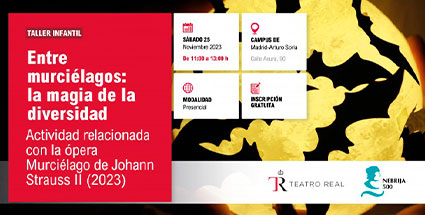
Children's Workshop "Among Bats"
As part of the activities alongside the Royal Theater project, students enrolled in the Education Degrees have organized a workshop centered around Johann Strauss II's opera, "The Bat.".
See articleLet's talk about Education
First chapter of the video podcast specialized in Education that analyzes the research processes and their application in neuroscience and the educational sector.
XVIII Multilingual Classroom
XVIII Multilingual Classroom on Environment at Nebrija University

Ecological transition at school: education, buildings and school environments
Article published by Alexandra Delgado, professor at Nebrija University, on the ecological transition, the social change that it entails and the importance of applying this process in Education.
More information



